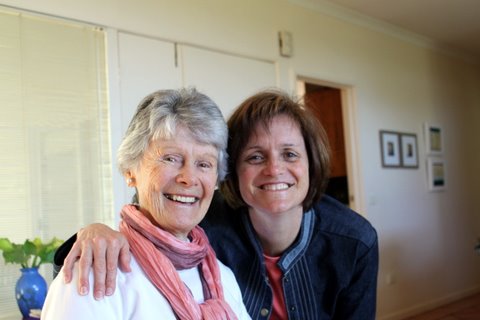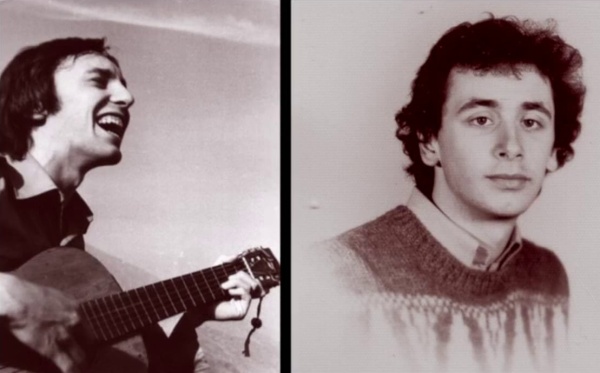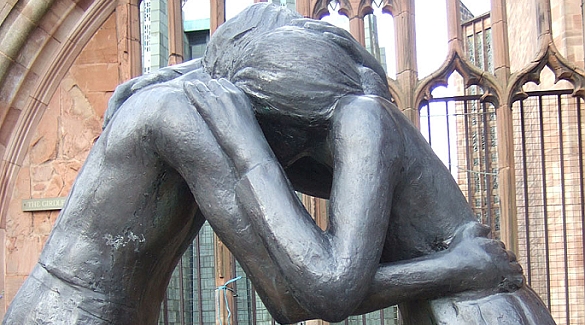
The courage to forgive

Photo: Reconciliation by Josefina de Vasconcellos at Coventry Cathedral
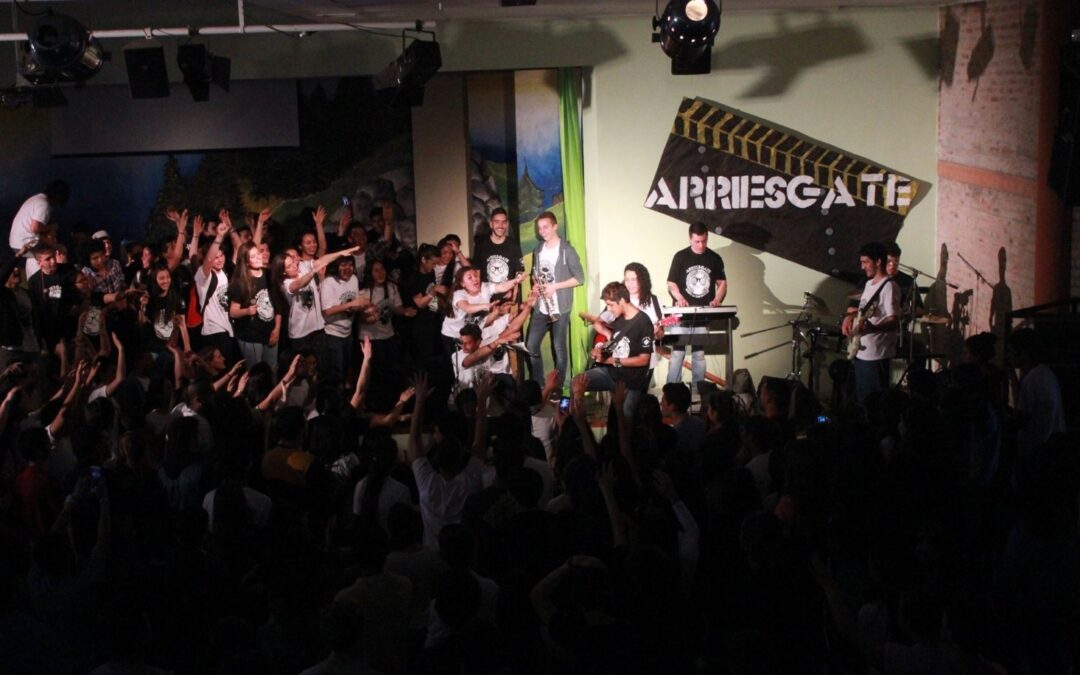
The results of “risking it” in Argentina
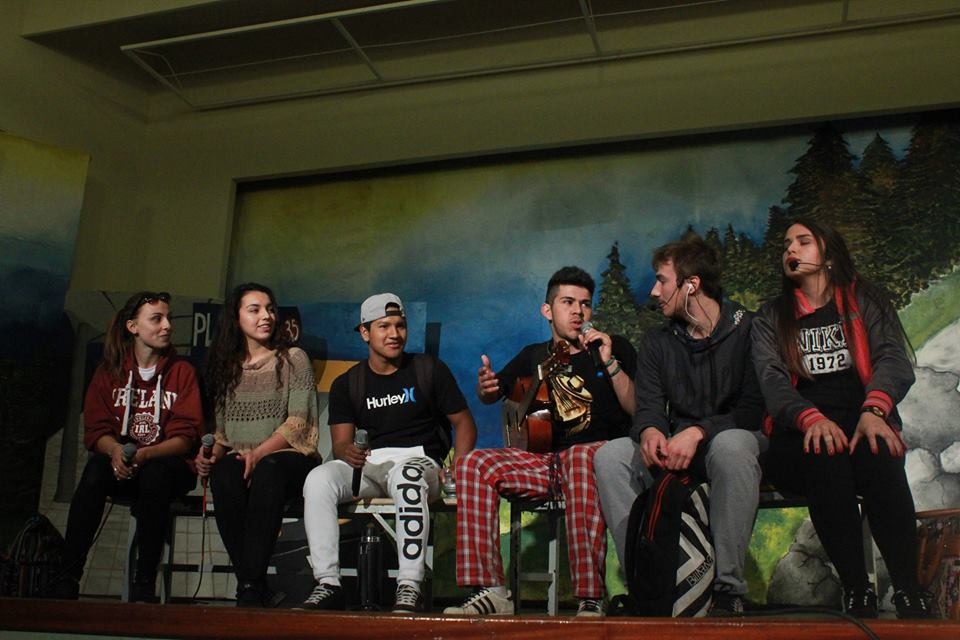 “This festival was an incredible experience! It did its job in my heart and it allowed us to enjoy a very beautiful atmosphere of real brotherhood that recharged the batteries!” “I realized that I can decide to stay inside the cave, or step out of the cave. I discovered how important it is for me to open myself and share with others what is taking place inside me.” “I saw so much vitality, joy and depth in these young people.” “It was a very nice experience. I leave with the certainty that it’s possible to live a different kind of life, that we’re not alone in the effort to be what we really want to be – and to take that risk.” These are only a few of the thoughts that were shared by the thousand young people gathered on September 24-25 for the Youthfest 2016 at the Focolare’s Permanent Mariapolis Lia in the pampas in Argentina. It has become a traditional event that is repeated every year, thanks to the creativity that young people are able to have when it comes to transmitting to their peers the ideals they live for. This year, more than a thousand young people arrived for the event from Paraguay, Uruguay, Chile, Brazil and many cities of Argentina. They were drawn by the title: “Risk it! What you’re looking for exists.” What did the title stand for? An experience of brotherhood, sharing the life of the Gospel for 48 hours, which is the main characteristic of this permanent Mariapolis of the Focolare Movement. Currently 85 young people from 17 countries live there with other families and adults. They share an experience and, through music, theatre and dance also put in common the problems that young people find themselves immersed in: family relations, school, successes and failures in life, addictions, painful moments and, above all, the encounter with a God who is near, who has a personal answer for each and everyone. But the idea didn’t end there: they tried to involve everyone in building a more united world, regardless of one’s religion or belief.
“This festival was an incredible experience! It did its job in my heart and it allowed us to enjoy a very beautiful atmosphere of real brotherhood that recharged the batteries!” “I realized that I can decide to stay inside the cave, or step out of the cave. I discovered how important it is for me to open myself and share with others what is taking place inside me.” “I saw so much vitality, joy and depth in these young people.” “It was a very nice experience. I leave with the certainty that it’s possible to live a different kind of life, that we’re not alone in the effort to be what we really want to be – and to take that risk.” These are only a few of the thoughts that were shared by the thousand young people gathered on September 24-25 for the Youthfest 2016 at the Focolare’s Permanent Mariapolis Lia in the pampas in Argentina. It has become a traditional event that is repeated every year, thanks to the creativity that young people are able to have when it comes to transmitting to their peers the ideals they live for. This year, more than a thousand young people arrived for the event from Paraguay, Uruguay, Chile, Brazil and many cities of Argentina. They were drawn by the title: “Risk it! What you’re looking for exists.” What did the title stand for? An experience of brotherhood, sharing the life of the Gospel for 48 hours, which is the main characteristic of this permanent Mariapolis of the Focolare Movement. Currently 85 young people from 17 countries live there with other families and adults. They share an experience and, through music, theatre and dance also put in common the problems that young people find themselves immersed in: family relations, school, successes and failures in life, addictions, painful moments and, above all, the encounter with a God who is near, who has a personal answer for each and everyone. But the idea didn’t end there: they tried to involve everyone in building a more united world, regardless of one’s religion or belief. 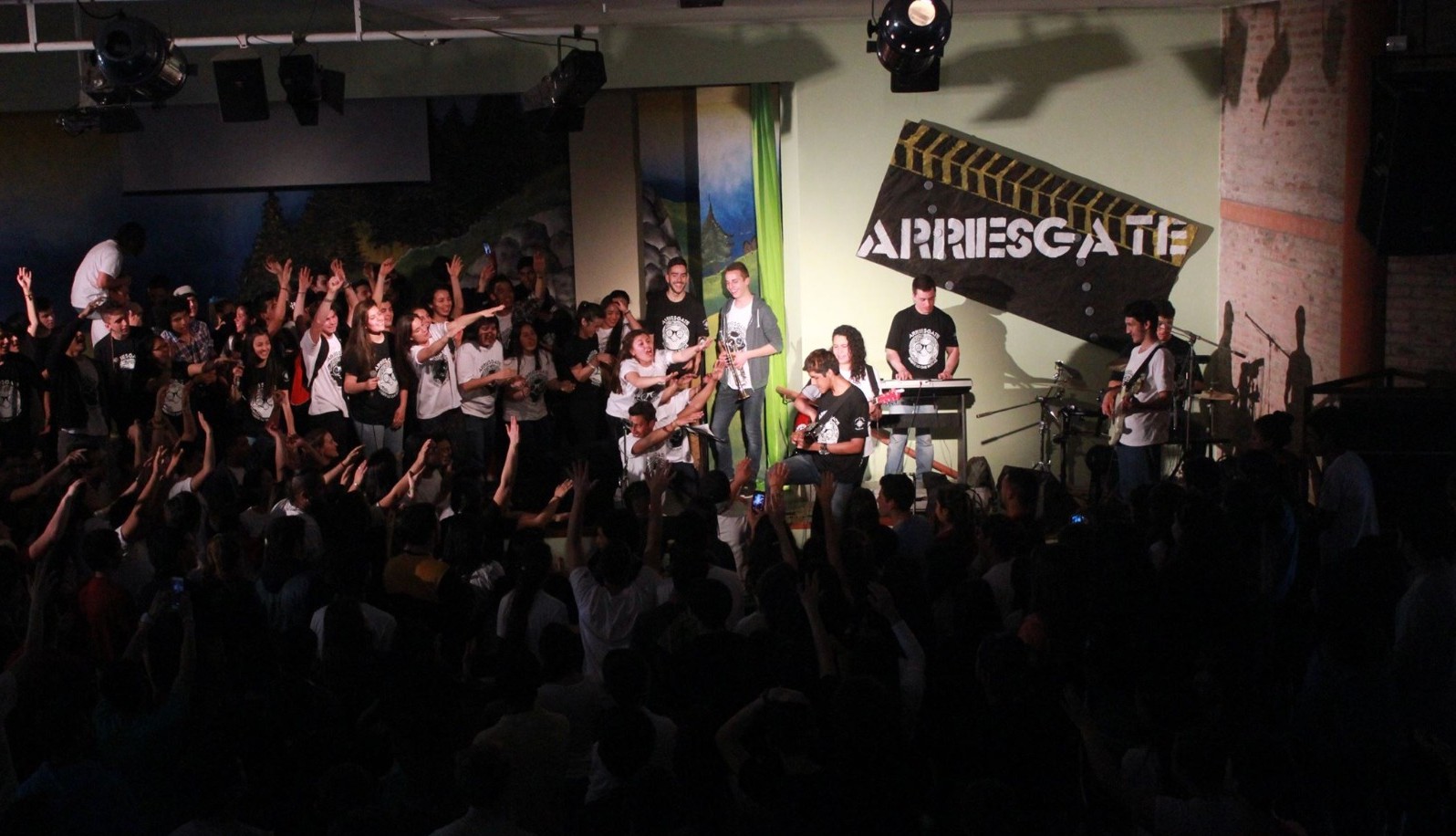 This year’s program was a combination of theatre, music and testimonies that happened on stage, beneath the large emblem that stood at the hall’s entrancel. The sign contained a one-word challenge: RISK IT! The language chosen for conveying the experiences and putting together the theatrical pieces, was direct and personally engaged everyone. The songs that were sung with such energy and captivating rhythm, helped to express this commitment in seeking something great to live for. The outdoor program – like the tour of the Mariapolis, lunchtime, strolling – made room for more sharing among the Latin American young people who had demonstrated their desire and capacity to build a more united world, a society that is for everybody. It didn’t take long for the feedback to arrive: “From Paraguay I want to thank all of you who made us live such and unforgettable day. We’re filled with emotion and prepared to accept the challenge!” “This morning, while I was on the bus going to work,” writes another person who attended the event, “the days we spent together came to mind and the desire to live today well, to give that little extra, to risk it.” Source: Southern Cone website
This year’s program was a combination of theatre, music and testimonies that happened on stage, beneath the large emblem that stood at the hall’s entrancel. The sign contained a one-word challenge: RISK IT! The language chosen for conveying the experiences and putting together the theatrical pieces, was direct and personally engaged everyone. The songs that were sung with such energy and captivating rhythm, helped to express this commitment in seeking something great to live for. The outdoor program – like the tour of the Mariapolis, lunchtime, strolling – made room for more sharing among the Latin American young people who had demonstrated their desire and capacity to build a more united world, a society that is for everybody. It didn’t take long for the feedback to arrive: “From Paraguay I want to thank all of you who made us live such and unforgettable day. We’re filled with emotion and prepared to accept the challenge!” “This morning, while I was on the bus going to work,” writes another person who attended the event, “the days we spent together came to mind and the desire to live today well, to give that little extra, to risk it.” Source: Southern Cone website
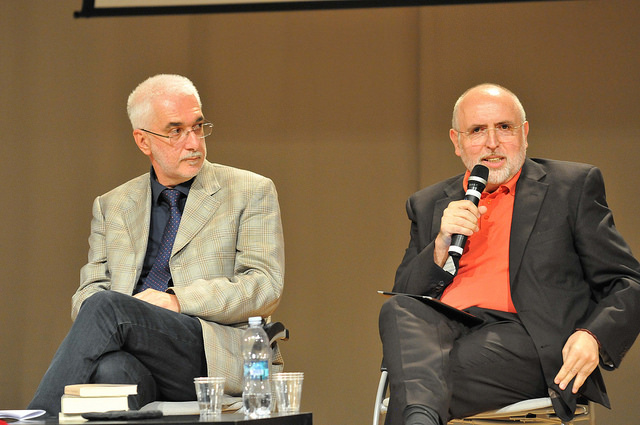
LoppianoLab 2016: Embracing the cry of the least
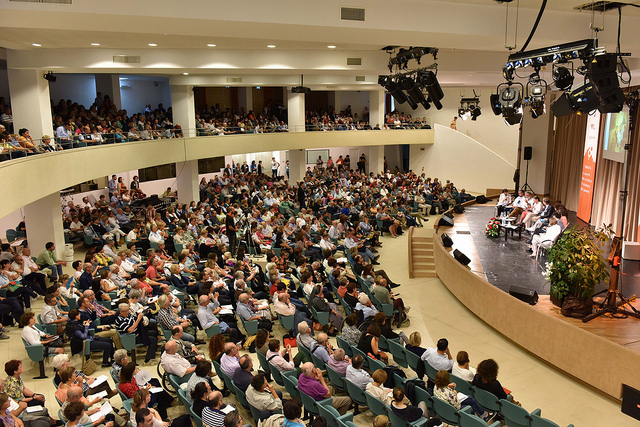 The title of this year’s edition of LoppianoLab was a challenge that was launched by the thousands of people, both in person and via live-screening, who took part in the event. While there is an Italy where the so-called absolute poor have increased by 130% in seven years, where every day its southern shores become a bridge to the hundreds of thousands of migrants fleeing poverty and wars – at the same time there is the desire to be involved: volunteers, associations, young people who want to experience what it’s like to work according to new business models that are able to meet the daily emergency. Involvement is the spirit behind those that brought their experiences and projects to LoppianoLab 2016, from the fields of economy, politics, welfare, immigration, communication, technology and instruction.
The title of this year’s edition of LoppianoLab was a challenge that was launched by the thousands of people, both in person and via live-screening, who took part in the event. While there is an Italy where the so-called absolute poor have increased by 130% in seven years, where every day its southern shores become a bridge to the hundreds of thousands of migrants fleeing poverty and wars – at the same time there is the desire to be involved: volunteers, associations, young people who want to experience what it’s like to work according to new business models that are able to meet the daily emergency. Involvement is the spirit behind those that brought their experiences and projects to LoppianoLab 2016, from the fields of economy, politics, welfare, immigration, communication, technology and instruction. 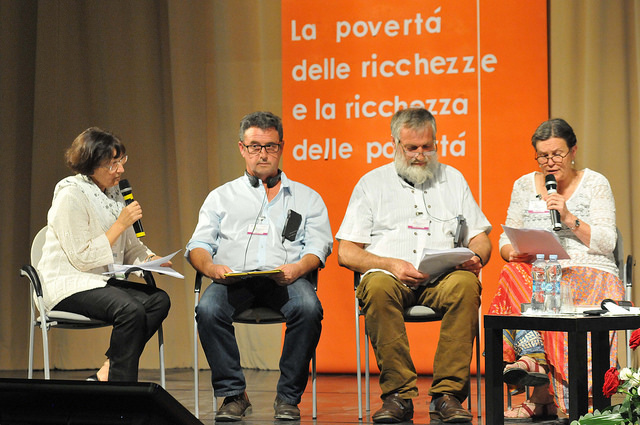 The project, which was promoted by Lionello Bonfanti Business Park, the Città Nuova Editorial Group, Sophia University Institute and the town of Loppiano, was begun in 2010 to be a national laboratory that would set in motion “those qualities that have made the Italians great, creativity and industriousness, welcome and solidarity, art and culture,” as Focolare president Maria Voce said in her greeting. Experts from the world of culture, politics and economy presented during the programme together with many other voices from civil society that presented projects from hundreds of associations, individuals and communities that form a close-knit network of people who are eager to translate ideas, projects and lifestyle into praxis. Three days, three focus groups to take on the challenges to peace: the challenge of techno-scientific innovation, development, and poverty. Two important anniversaries were also celebrated at LoppianoLab: the 25th anniversary of the Economy of Communion Project (EoC) and the 60th anniversary of the Focolare’s Città Nuova. Thirty multi-ethnic workshops, three via direct-streaming, along with workshops for children and teenagers: “Loppiano Kids and “Time to Give” with a series of meetings focused on topics related to poverty, solidarity and ecology; and “Loppiano Young” with performances and artistic exhibitions assisted by the international Gen Verde Band.
The project, which was promoted by Lionello Bonfanti Business Park, the Città Nuova Editorial Group, Sophia University Institute and the town of Loppiano, was begun in 2010 to be a national laboratory that would set in motion “those qualities that have made the Italians great, creativity and industriousness, welcome and solidarity, art and culture,” as Focolare president Maria Voce said in her greeting. Experts from the world of culture, politics and economy presented during the programme together with many other voices from civil society that presented projects from hundreds of associations, individuals and communities that form a close-knit network of people who are eager to translate ideas, projects and lifestyle into praxis. Three days, three focus groups to take on the challenges to peace: the challenge of techno-scientific innovation, development, and poverty. Two important anniversaries were also celebrated at LoppianoLab: the 25th anniversary of the Economy of Communion Project (EoC) and the 60th anniversary of the Focolare’s Città Nuova. Thirty multi-ethnic workshops, three via direct-streaming, along with workshops for children and teenagers: “Loppiano Kids and “Time to Give” with a series of meetings focused on topics related to poverty, solidarity and ecology; and “Loppiano Young” with performances and artistic exhibitions assisted by the international Gen Verde Band.  Focolare co-president Jesús Morán offered some remarks at the end of the firest day. He spoke about three challenges that the world faces today: globalization, post-globalization, post-humanism. Also the humanitarian challenge of the sub-human, a challenge that calls for a “culture of resurrection,” in order to totally assume the suffering of the person that suffers. According to Jesús Morán, the question we should ask is how much space should be given in our own lives to the least, the “abandoned ones” of today Finally, during “The Wealth of the Invisible Poverty forum,” a proposal was launched to create an observatory on poverty that would create an information system to monitor the effects of the EoC around the world and study the results and methodologies of specific significant cases. See also: Città Nuova online Loppiano Economy of Communion
Focolare co-president Jesús Morán offered some remarks at the end of the firest day. He spoke about three challenges that the world faces today: globalization, post-globalization, post-humanism. Also the humanitarian challenge of the sub-human, a challenge that calls for a “culture of resurrection,” in order to totally assume the suffering of the person that suffers. According to Jesús Morán, the question we should ask is how much space should be given in our own lives to the least, the “abandoned ones” of today Finally, during “The Wealth of the Invisible Poverty forum,” a proposal was launched to create an observatory on poverty that would create an information system to monitor the effects of the EoC around the world and study the results and methodologies of specific significant cases. See also: Città Nuova online Loppiano Economy of Communion
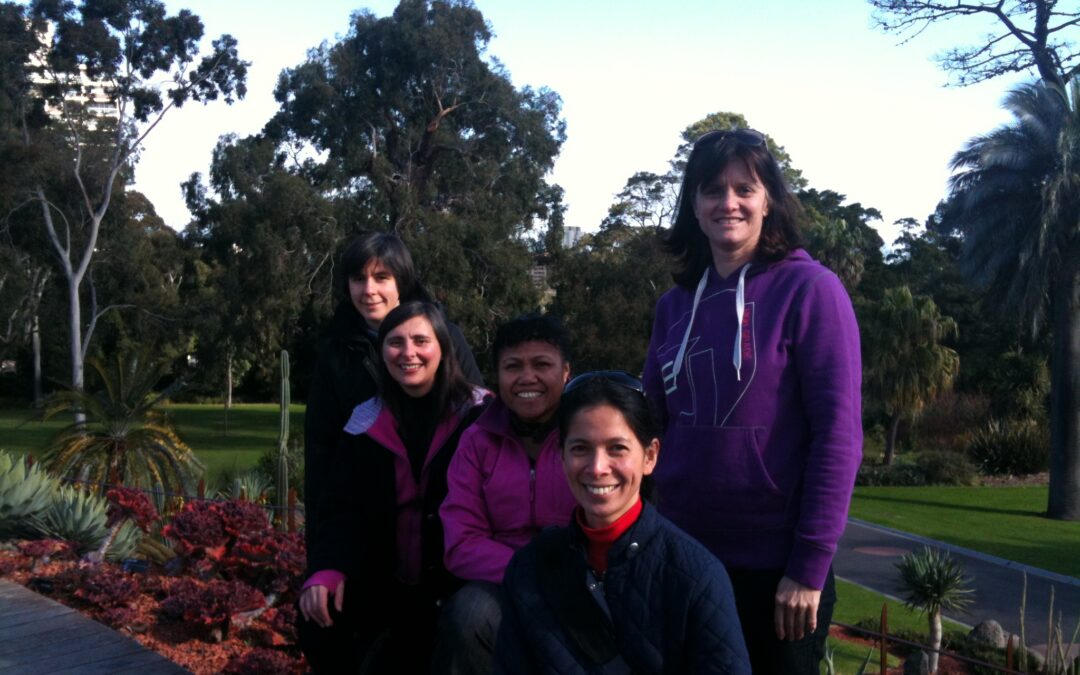
Anne: “My night has no darkness”
“I was born 14 weeks premature; I weighed only 2 pounds and 3 ounces. The medical staff told my mother that it would be a slim chance of survival, so my mother called a priest to baptise me. I was placed in an incubator for 4 months. It was during this period that I was given too much oxygen which damaged my hearing; I have about 20% hearing in both ears. Growing up, I remember asking my parents ‘Why didn’t I die at birth; why do I have a hearing loss?’ They always told me ‘God loves you immensely and he has a special plan for you.’ This always left me curious and it encouraged my heart to always be open, to understand what He had in store for me. I remember my first job when I was 18 years old; I worked at the post office. In this role I had to answer the phone. Back in those days I had a gadget that you had to slip on the earpiece of the phone to amplify the sound and then take off for the others to use. I hated the phone as it was very hard to hear and many times people on the other end would tease me saying that I was stupid. It wasn’t until I would get home, that I would let out all my tears and bang on the walls in my bedroom in anger. I remember crying at my Mum saying, ‘Why me? Why am I deaf? Why does life have to be so hard!’ My parents as a couple tried to live the Focolare spirituality. I remember my mother saying to me, ‘Be the first to love. When you go back to work tomorrow, be the first to pick up the phone and explain that you have a hearing loss, and say can you please speak slowly and clearly.’ Up to that point I didn’t want people to know that I had a hearing loss as I wanted to be normal like everyone else. The next day at work I heard the phone ring and in that moment I heard a voice within my heart saying to me, ‘Be the first to love’. For the first time in my life, I picked up the phone and informed the caller that I had a hearing loss. Surprisingly that person was so nice and understanding that it encouraged me to always pick up the phone. My work colleagues could see that I was always answering the phone, which meant putting the gadget on and off for every phone-call. Seeing this difficulty, they started to pick up the phone before me. It was like I had thrown a pebble in the water, causing a ripple effect. I had started to love first and then the others started to love me back. It became reciprocal. I remember going home saying, ‘Mum, it worked!’ That experience was a turning point in my life. I understood that I had to accept my disability, my limitations and only in loving would I find peace and freedom. Suffering does bring you closer to God. Sometimes when I don’t hear something or get frustrated at my own limitations, I say ‘I love you’ (to Him) in this suffering, accept it and plunge myself into loving in the present moment. I wanted to give my life totally to God in the Focolare, but there was a problem as the formation course in Italy was conducted in Italian. How was I going to learn a foreign language with a hearing loss? In order to speak English well, I had to do a lot of speech therapy and my mum taught me how to lip read. But nothing is impossible to God. He gave me a special grace to be able to speak Italian, and to even lip-read in Italian! I still find it hard at times. Even with my friends at home, we’ve had to learn how to live with each other. For example, I had to tell one of them who mumbled a lot, to open her mouth a bit more so I could lip-read. It was an effort for her, but now she’s much better at it! Before my father passed away nine years ago, he left me a personal message to open after his death. He wrote to me this one phrase: ‘My night has no darkness’. This is so true, when we love there is no darkness, even with a disability.”
I remember my mother saying to me, ‘Be the first to love. When you go back to work tomorrow, be the first to pick up the phone and explain that you have a hearing loss, and say can you please speak slowly and clearly.’ Up to that point I didn’t want people to know that I had a hearing loss as I wanted to be normal like everyone else. The next day at work I heard the phone ring and in that moment I heard a voice within my heart saying to me, ‘Be the first to love’. For the first time in my life, I picked up the phone and informed the caller that I had a hearing loss. Surprisingly that person was so nice and understanding that it encouraged me to always pick up the phone. My work colleagues could see that I was always answering the phone, which meant putting the gadget on and off for every phone-call. Seeing this difficulty, they started to pick up the phone before me. It was like I had thrown a pebble in the water, causing a ripple effect. I had started to love first and then the others started to love me back. It became reciprocal. I remember going home saying, ‘Mum, it worked!’ That experience was a turning point in my life. I understood that I had to accept my disability, my limitations and only in loving would I find peace and freedom. Suffering does bring you closer to God. Sometimes when I don’t hear something or get frustrated at my own limitations, I say ‘I love you’ (to Him) in this suffering, accept it and plunge myself into loving in the present moment. I wanted to give my life totally to God in the Focolare, but there was a problem as the formation course in Italy was conducted in Italian. How was I going to learn a foreign language with a hearing loss? In order to speak English well, I had to do a lot of speech therapy and my mum taught me how to lip read. But nothing is impossible to God. He gave me a special grace to be able to speak Italian, and to even lip-read in Italian! I still find it hard at times. Even with my friends at home, we’ve had to learn how to live with each other. For example, I had to tell one of them who mumbled a lot, to open her mouth a bit more so I could lip-read. It was an effort for her, but now she’s much better at it! Before my father passed away nine years ago, he left me a personal message to open after his death. He wrote to me this one phrase: ‘My night has no darkness’. This is so true, when we love there is no darkness, even with a disability.”
Experience shared at Health Symposium “Darkness to Light – Spirituality of Unity in Chronic Disease and Disability” Focolare Movement, Australia, July 2016
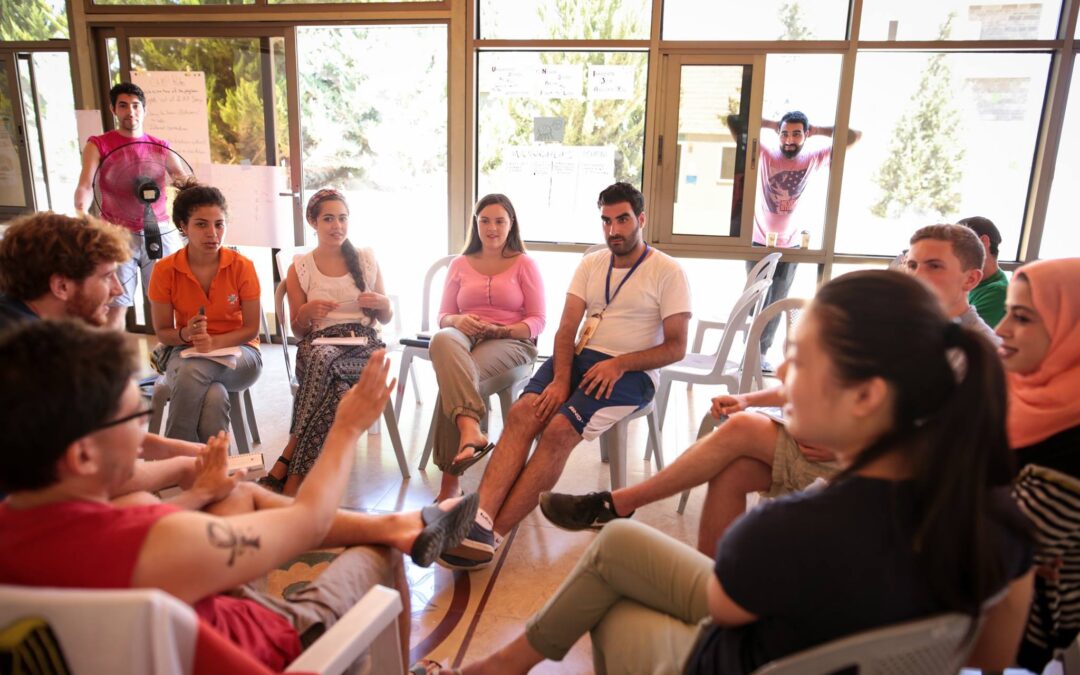
Madaba, At the Start of the New Host Spot Project
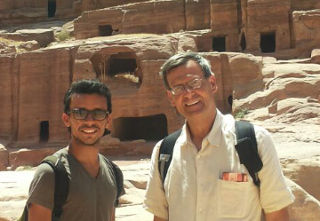
Marco Desalvo (right)
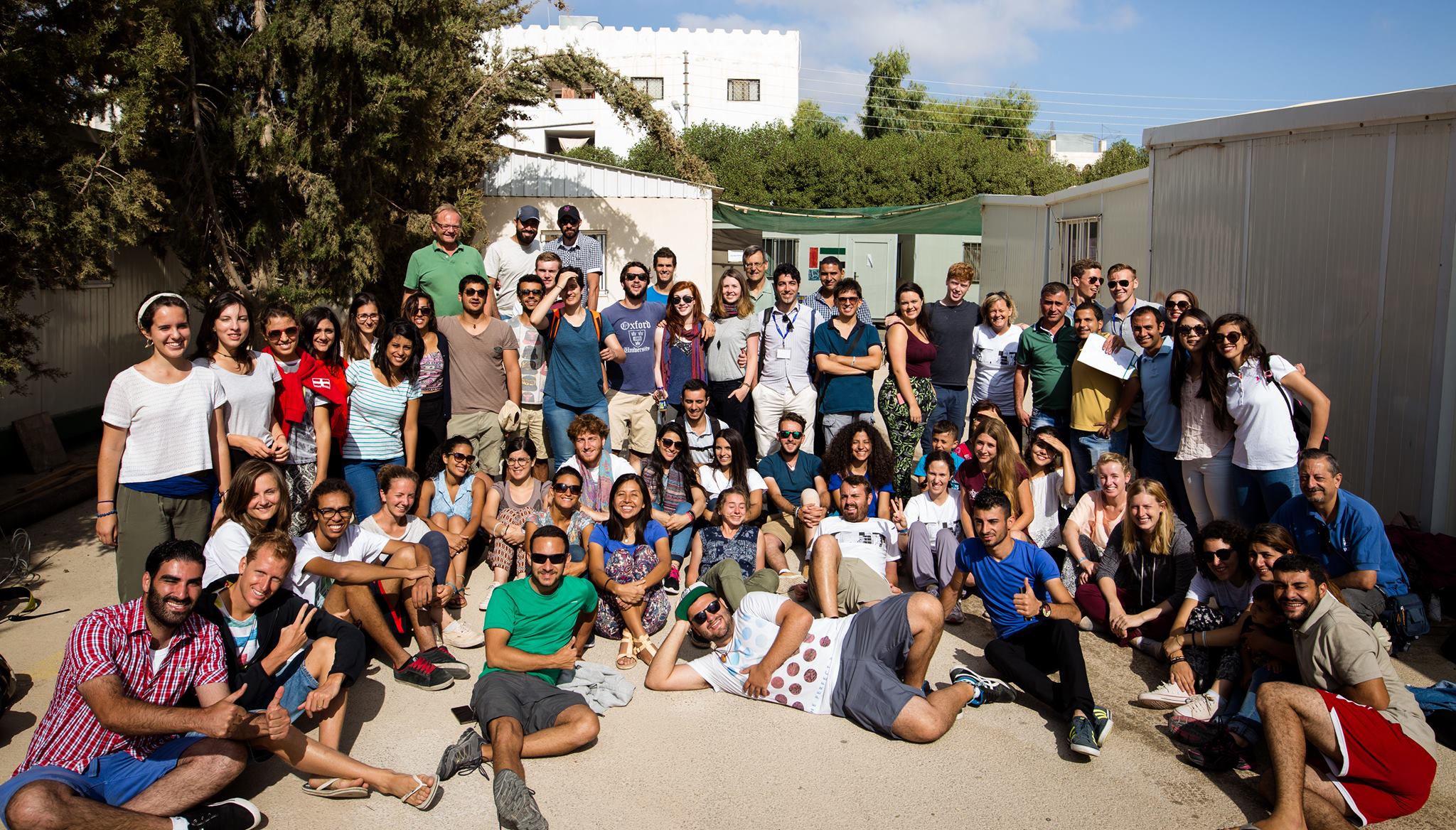 The president of New Humanity admits being very struck by the volunteers from Caritas Jordan: “Irreplaceable, precious, discreet, source of hope, of life of concrete love, medicine for everyone they meet.” Without them thousands of refugees would not have a roof over their heads and the means to survive – to find hope. Working with them we touched with our own hands the deepest meaning of the word ‘Caritas’: concrete love. Two weeks ago I was in Poland at the World Youth Day, and the message of Pope Francis to the two million young people is still fresh in my mind: ‘Don’t retire at the age of 25, [….] don’t be couch potatoes […] aim high. […] They might be able to judge you dreamers because you believe in a new humanity that does not accept hatred among peoples, that does not see borders between countries as barriers, and that preserves its own traditions without egoism and resentment. Don’t be discouraged! With your smiles and your open arms you preach hope and are a blessing for the human family.” Here in Jordan I’ve met young people who put these words in practice. Their work is certainly a small drop in front of the problems we’re facing. But with young people like them, the world will change. These days have turned us into ambassadors of the refugees, of their suffering, of a world of Peace.”
The president of New Humanity admits being very struck by the volunteers from Caritas Jordan: “Irreplaceable, precious, discreet, source of hope, of life of concrete love, medicine for everyone they meet.” Without them thousands of refugees would not have a roof over their heads and the means to survive – to find hope. Working with them we touched with our own hands the deepest meaning of the word ‘Caritas’: concrete love. Two weeks ago I was in Poland at the World Youth Day, and the message of Pope Francis to the two million young people is still fresh in my mind: ‘Don’t retire at the age of 25, [….] don’t be couch potatoes […] aim high. […] They might be able to judge you dreamers because you believe in a new humanity that does not accept hatred among peoples, that does not see borders between countries as barriers, and that preserves its own traditions without egoism and resentment. Don’t be discouraged! With your smiles and your open arms you preach hope and are a blessing for the human family.” Here in Jordan I’ve met young people who put these words in practice. Their work is certainly a small drop in front of the problems we’re facing. But with young people like them, the world will change. These days have turned us into ambassadors of the refugees, of their suffering, of a world of Peace.” 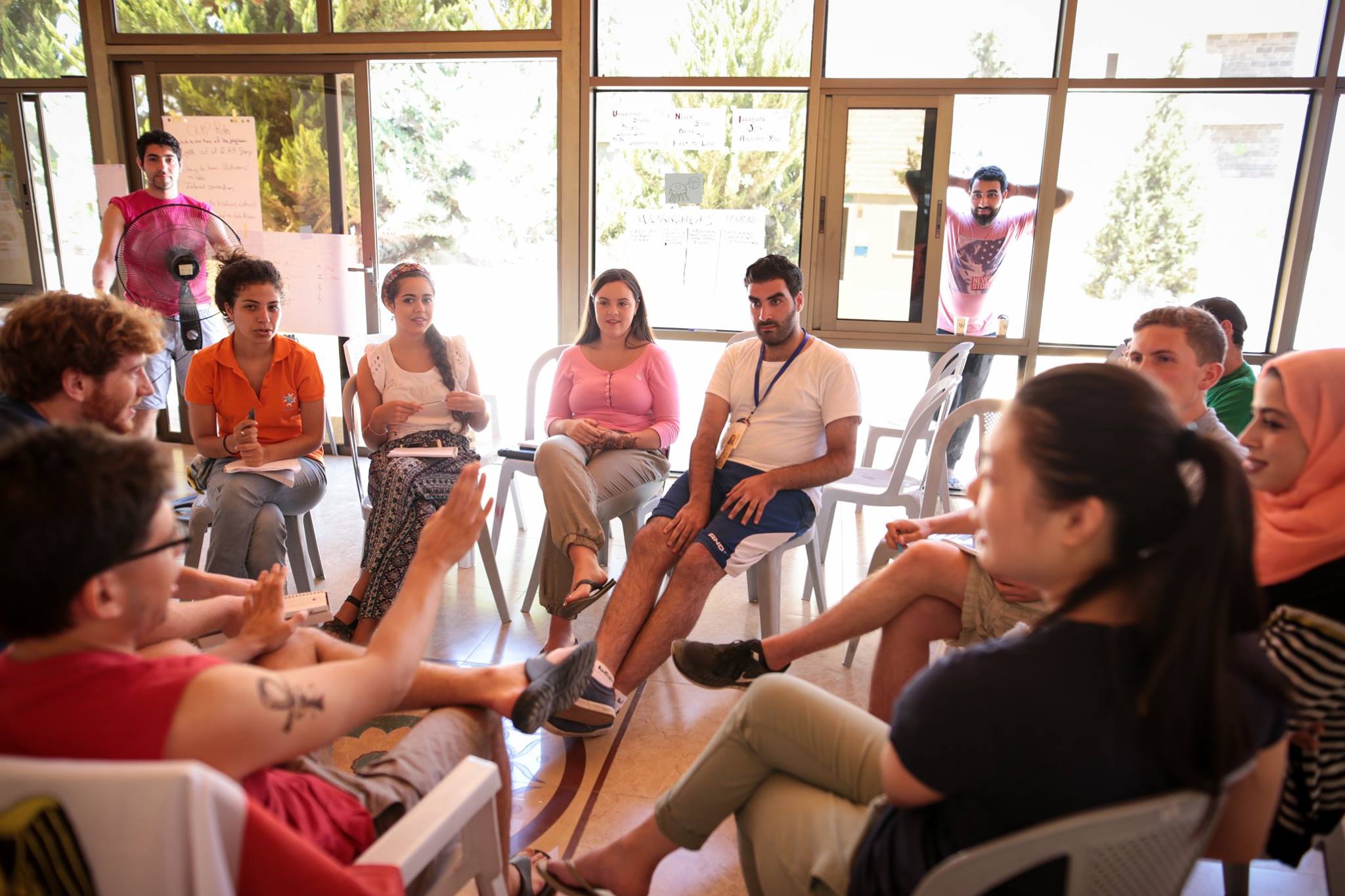 The Host Spot Project is promoted by New Humanity and other associations from nine countries, and is co-financed by the Erasmus+ programme. The objective: to spread a culture of human rights. These are young people from different backgrounds, ready to acquire the knowledge and skills to defend the right of freedom of expression and to be engaged in producing documentaries that tell the life stories of the refugees. After Jordan, the project is planning on a March 2017 training course in Germany to develop the technical skills needed to produce social documentaries. There will be the meeting with refugees in German refugee camps, and different forms of welcome will be compared. See also: Volunteerism in the refugee camps of Jordan Facebook: www.facebook.com/hostspot9/
The Host Spot Project is promoted by New Humanity and other associations from nine countries, and is co-financed by the Erasmus+ programme. The objective: to spread a culture of human rights. These are young people from different backgrounds, ready to acquire the knowledge and skills to defend the right of freedom of expression and to be engaged in producing documentaries that tell the life stories of the refugees. After Jordan, the project is planning on a March 2017 training course in Germany to develop the technical skills needed to produce social documentaries. There will be the meeting with refugees in German refugee camps, and different forms of welcome will be compared. See also: Volunteerism in the refugee camps of Jordan Facebook: www.facebook.com/hostspot9/
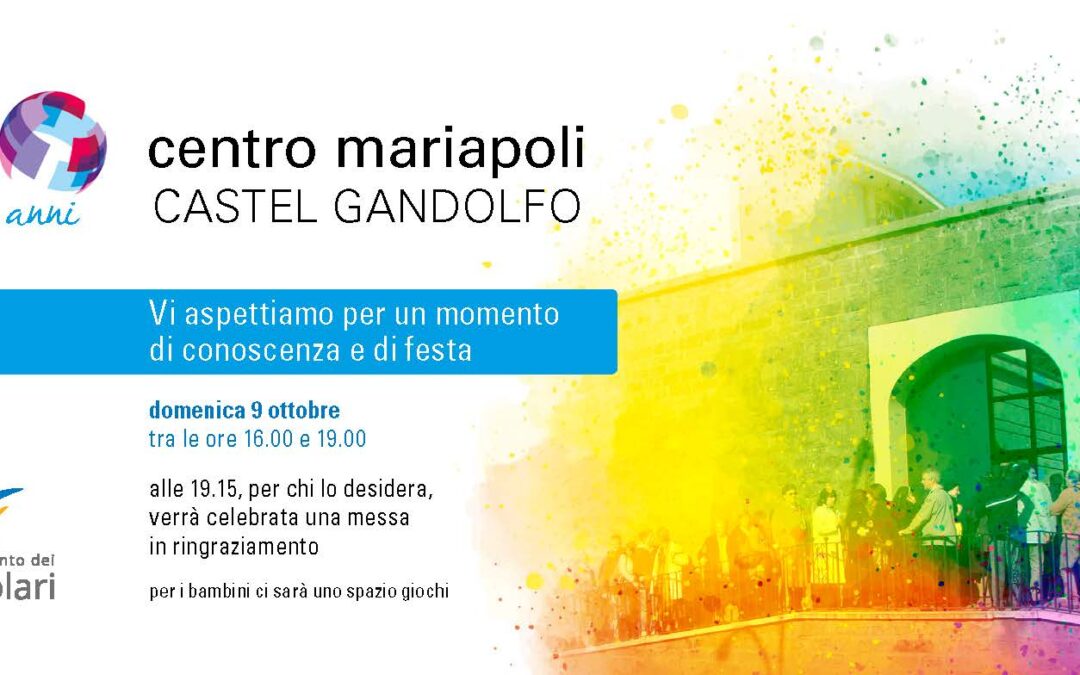
30th anniversary of the Mariapolis Centre in Castel Gandolfo
A bit of history: In 1982, John Paul II placed the Papal Audience Hall in Castel Gandolfo (Rome) at the disposition of the Focolare Movement. The refurbishment of the huge, empty building started. Through the contribution of all the members of the Movement around the world (even children), the International Mariapolis Centre was inaugurated in 1986 and has since hosted thousands of conferences. People from all over the world have attended congresses, symposiums, seminars and training courses, meetings for ecumenical and inter-religious dialogue. All these activities focussed on the one objective, that of contributing to universal brotherhood, which became tangible through living the life of the Gospel, through workshops and in-depth discussions, all of which took place in this embryonic “city of Mary”, in this “home”, as Chiara Lubich called it. Download invitation 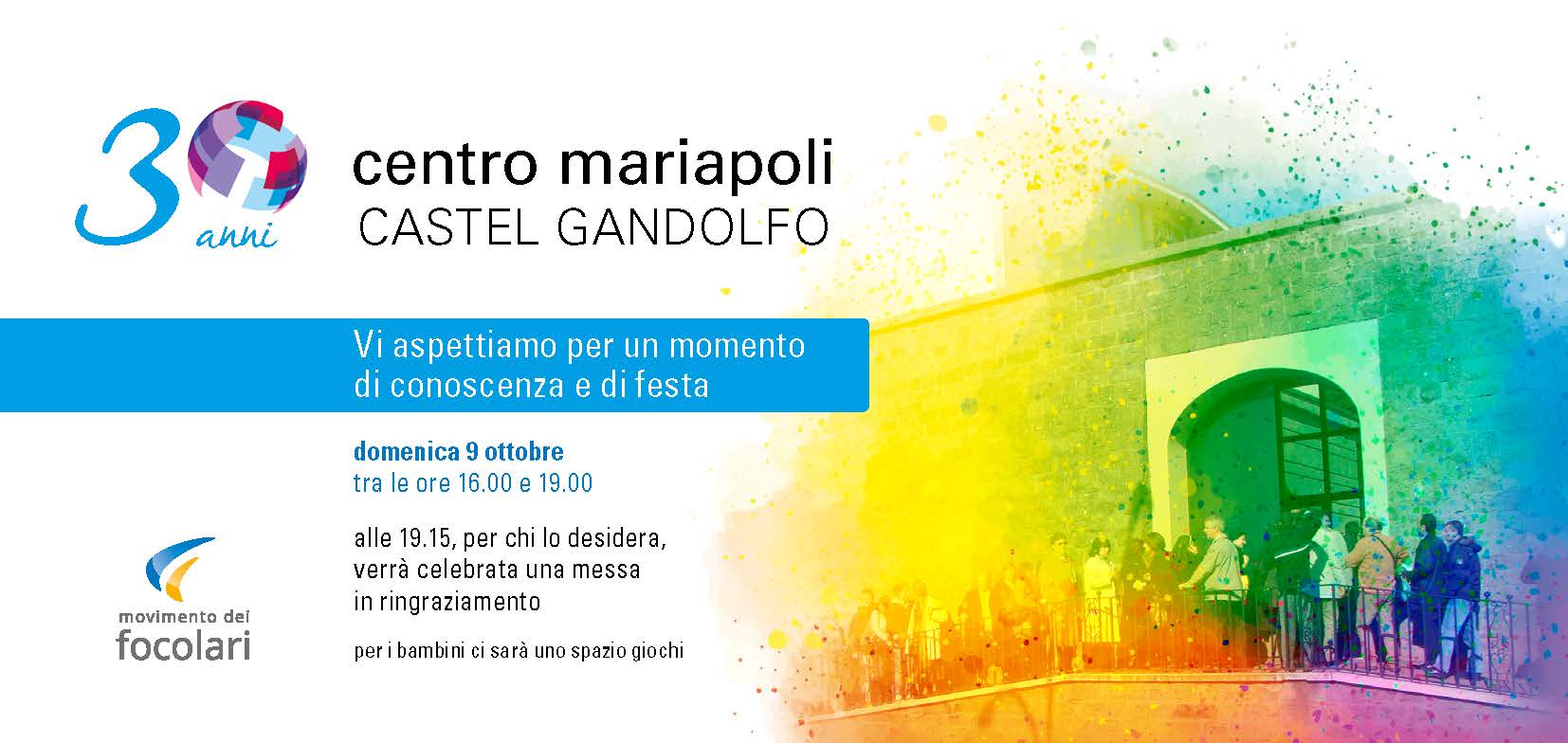
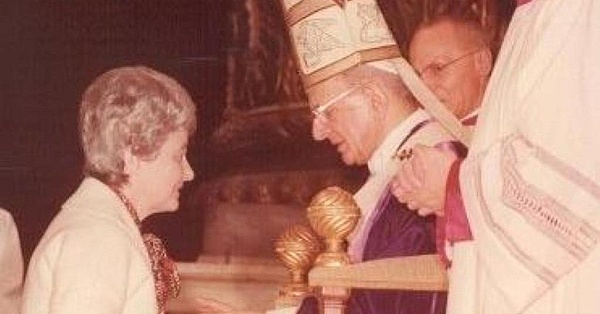
Pope Paul VI: Prophet, Apostle, Mediator
 Catholic Church leaders, representatives of the Islamic world, civil authorities, representatives of associations and the people of Brescia and neighbouring cities filled the cathedral of the Italian city on the 23rd of September, for the conference on “Paul VI, a Spiritual Portrait“. The event included the testimony of Maria Voce, President of the Focolare Movement, in a speech read on her behalf by Rosi Bertolassi. Her speech touched on three aspects of Giovanni Battista Montini’s life and work as: prophet, apostle and mediator. The President of the Focolare first of all expressed the deep gratitude that bound the Movement she represents to Blessed Paul VI, who was “…one of the gifts God wanted to make to humankind in our time.” She recalled the time when the Church was studying the emerging Movement, saying, “When he became Pope he played a key role in discerning the charism of Chiara Lubich and in making possible what, at the beginning of the sixties, still seemed” impossible,” expertly identifying juridically appropriate ways to express the specific character of this new movement in the Church.” “Therefore”, she stressed, “Because he was “imbued with the Word, we saw the figure of Giovanni Battista Montini – Paul VI – in this triple dimension of prophet, apostle and mediator.” In the prophetic dimension, Maria Voce highlighted “his ability to open new paths with courage and wisdom, to break down walls and express the renewal of the Church which his soul craved for,” Examples were Pope Paul VI’s historic embrace of peace with Patriarch Athenagoras in January 1964 in the Holy Land; or when, in 1970, through an historic decision he raised two women, St Teresa of Avila and St Catherine of Siena, to the status of Doctor of the Church – a title previously only given to men; or when, in the 1975 Holy Year, he knelt to kiss the feet of the Orthodox Metropolitan Meliton. “Paul VI was truly the Pope of dialogue. This is how Pope John Paul II described him in Concesio during his pastoral visit in 1982, emphasizing his predecessor’s ability to dialogue with the whole of humanity.” Maria Voce also emphasized his apostolic dimension saying, “In Ecclesiam Suam (…) we perceive the thought and mind of the apostle whose name he had chosen, the name of the missionary apostle and the first theologian of Christ, the one who made himself all things to all people. Pope Paul VI did not spare himself so that the announcement of the Gospel could reach all nations.” In this respect, Maria Voce recalled his apostolic journeys “that brought him closer to the peoples of the world, making the Church more one and more ‘catholic’, as Paul VI liked to emphasize, in the etymological sense of the word. Particularly significant and universal in outlook was his historic and profoundly human speech delivered at the United Nations. I am pleased to recall once more his innovative inclusion of the laity in key areas of work of the Church; his confidence in the contribution of lay people’s ideas; and his recognition, in Octogesima adveniens, of the legitimacy of a variety of political opinions while remaining faithful to Gospel principles.” Finally, his ability to be a “mediator of the One Mediator“. After recalling his surprising letter to the Red Brigade which “flowed from his soul at the painful time when his friend Honourable Aldo Moro was kidnapped” Maria Voce affirmed his role as mediator and added, “Paul VI – in the footsteps of his Master – took upon himself the anguish and torment of the world, feeling it deeply as if it were his own. He bore the sin of the world, perceiving truly the weight of it and suffering profoundly, as could sometimes be seen in his face. In that way he manifested clearly the fatherhood of God, bridging the distance between heaven and earth, healing wounds, wiping away tears, bringing peace and unity.”
Catholic Church leaders, representatives of the Islamic world, civil authorities, representatives of associations and the people of Brescia and neighbouring cities filled the cathedral of the Italian city on the 23rd of September, for the conference on “Paul VI, a Spiritual Portrait“. The event included the testimony of Maria Voce, President of the Focolare Movement, in a speech read on her behalf by Rosi Bertolassi. Her speech touched on three aspects of Giovanni Battista Montini’s life and work as: prophet, apostle and mediator. The President of the Focolare first of all expressed the deep gratitude that bound the Movement she represents to Blessed Paul VI, who was “…one of the gifts God wanted to make to humankind in our time.” She recalled the time when the Church was studying the emerging Movement, saying, “When he became Pope he played a key role in discerning the charism of Chiara Lubich and in making possible what, at the beginning of the sixties, still seemed” impossible,” expertly identifying juridically appropriate ways to express the specific character of this new movement in the Church.” “Therefore”, she stressed, “Because he was “imbued with the Word, we saw the figure of Giovanni Battista Montini – Paul VI – in this triple dimension of prophet, apostle and mediator.” In the prophetic dimension, Maria Voce highlighted “his ability to open new paths with courage and wisdom, to break down walls and express the renewal of the Church which his soul craved for,” Examples were Pope Paul VI’s historic embrace of peace with Patriarch Athenagoras in January 1964 in the Holy Land; or when, in 1970, through an historic decision he raised two women, St Teresa of Avila and St Catherine of Siena, to the status of Doctor of the Church – a title previously only given to men; or when, in the 1975 Holy Year, he knelt to kiss the feet of the Orthodox Metropolitan Meliton. “Paul VI was truly the Pope of dialogue. This is how Pope John Paul II described him in Concesio during his pastoral visit in 1982, emphasizing his predecessor’s ability to dialogue with the whole of humanity.” Maria Voce also emphasized his apostolic dimension saying, “In Ecclesiam Suam (…) we perceive the thought and mind of the apostle whose name he had chosen, the name of the missionary apostle and the first theologian of Christ, the one who made himself all things to all people. Pope Paul VI did not spare himself so that the announcement of the Gospel could reach all nations.” In this respect, Maria Voce recalled his apostolic journeys “that brought him closer to the peoples of the world, making the Church more one and more ‘catholic’, as Paul VI liked to emphasize, in the etymological sense of the word. Particularly significant and universal in outlook was his historic and profoundly human speech delivered at the United Nations. I am pleased to recall once more his innovative inclusion of the laity in key areas of work of the Church; his confidence in the contribution of lay people’s ideas; and his recognition, in Octogesima adveniens, of the legitimacy of a variety of political opinions while remaining faithful to Gospel principles.” Finally, his ability to be a “mediator of the One Mediator“. After recalling his surprising letter to the Red Brigade which “flowed from his soul at the painful time when his friend Honourable Aldo Moro was kidnapped” Maria Voce affirmed his role as mediator and added, “Paul VI – in the footsteps of his Master – took upon himself the anguish and torment of the world, feeling it deeply as if it were his own. He bore the sin of the world, perceiving truly the weight of it and suffering profoundly, as could sometimes be seen in his face. In that way he manifested clearly the fatherhood of God, bridging the distance between heaven and earth, healing wounds, wiping away tears, bringing peace and unity.”
Chiara Lubich Prize 2017
In this competition – promoted by the “Cities for Fraternity” Association – all local administrations from any part of the world may participate. Projects and initiatives can compete if: – they institute and/or spread, principally within the local territory, but also on a national or international level, practices of universal brotherhood, according to the diverse interpretations of the meaning of such a principle; – they stimulate the citizens to commit themselves for the common good and to participate in the life of civil society, – they encourage the growth of a culture of active and inclusive citizenry. The project must be representative of a style of administration that is not occasional and always more aware of the value of the principle of universal brotherhood. On the side of the public adminitrations and other social, economic, cultural subjects, it is possible both to become candidates, and also to nominate the projects of others. All the recommendations must be sent on or before January 10, 2017 , to the office of the Chairman of the “Cities for Fraternity” Association, c/oTown Council of Castel Gandolfo, Piazza Libertà, 7 00040 Castel Gandolfo (Rome). Download fact sheet (in Italian) Info: www.cittaperlafraternita.org/
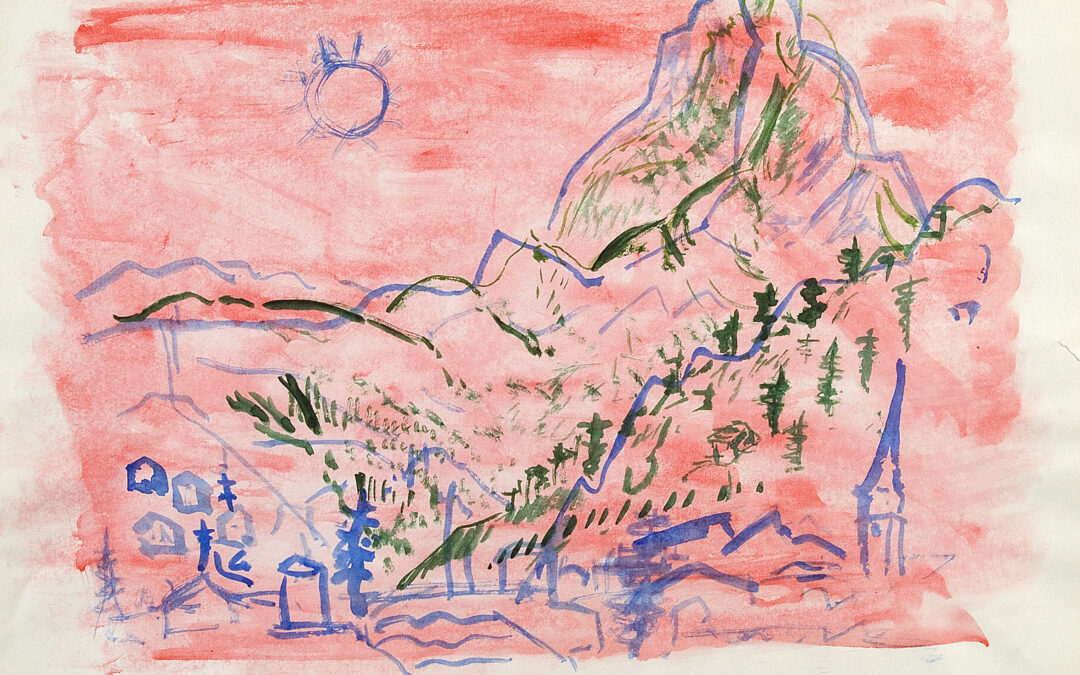
Klaus Hemmerle. The Sun in the Valley
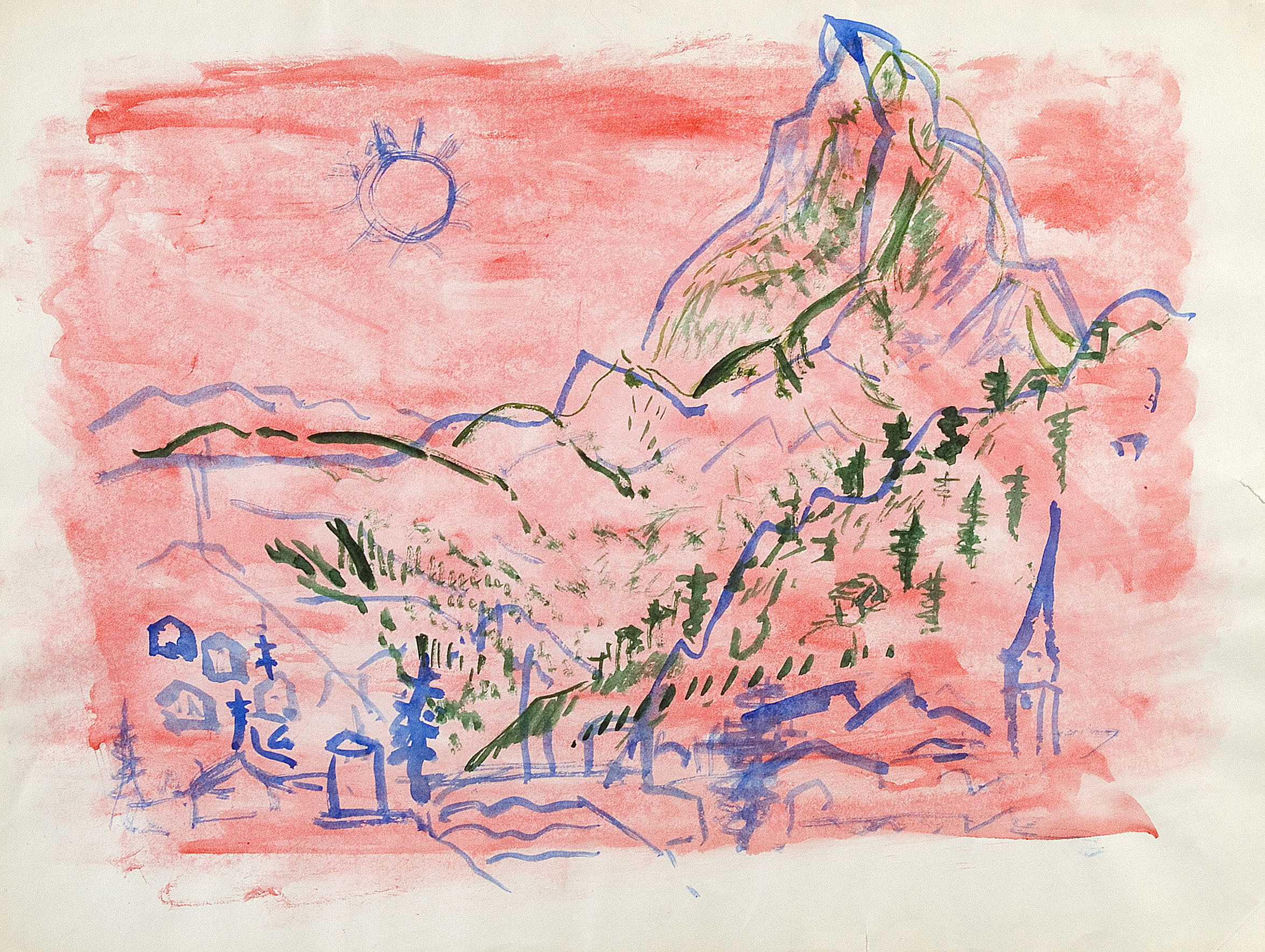
Watercolour by Klaus Hemmerle (1980 – Matterhorn mit Zermatt, Schweiz. http://www.klaus-hemmerle.de)
Australia: Action for Refugees
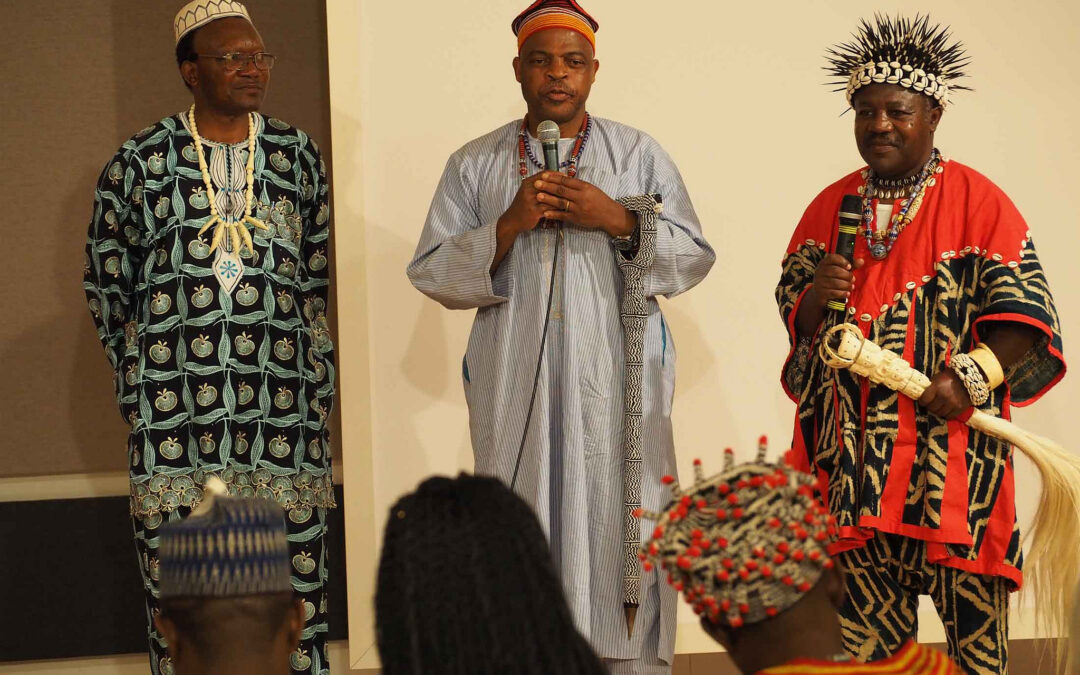
Fontem and the Light of Mafua Ndem
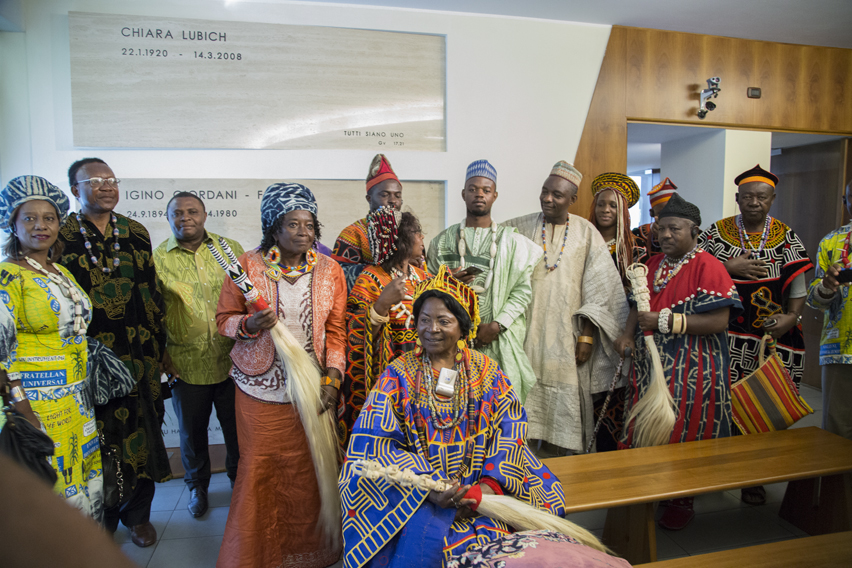
© CSC Audiovisivi – Caris Mendes
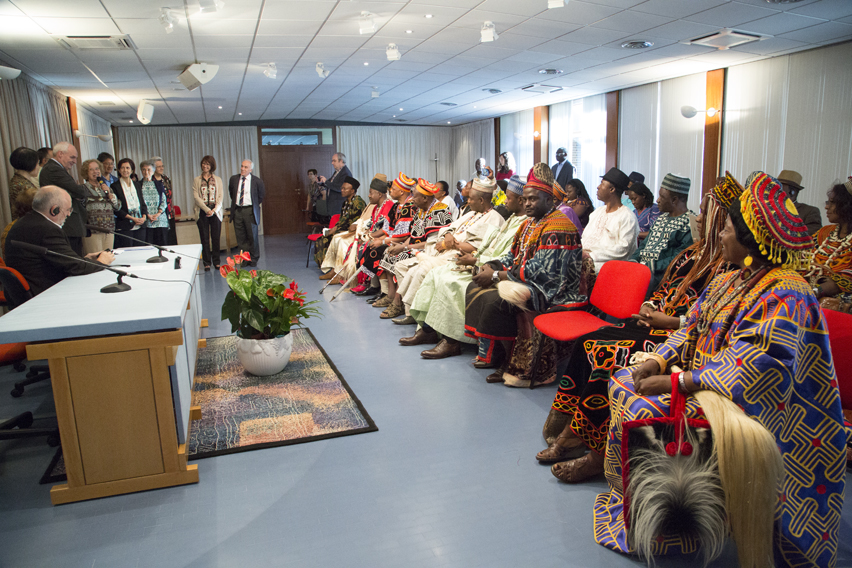
© CSC Audiovisivi – Caris Mendes
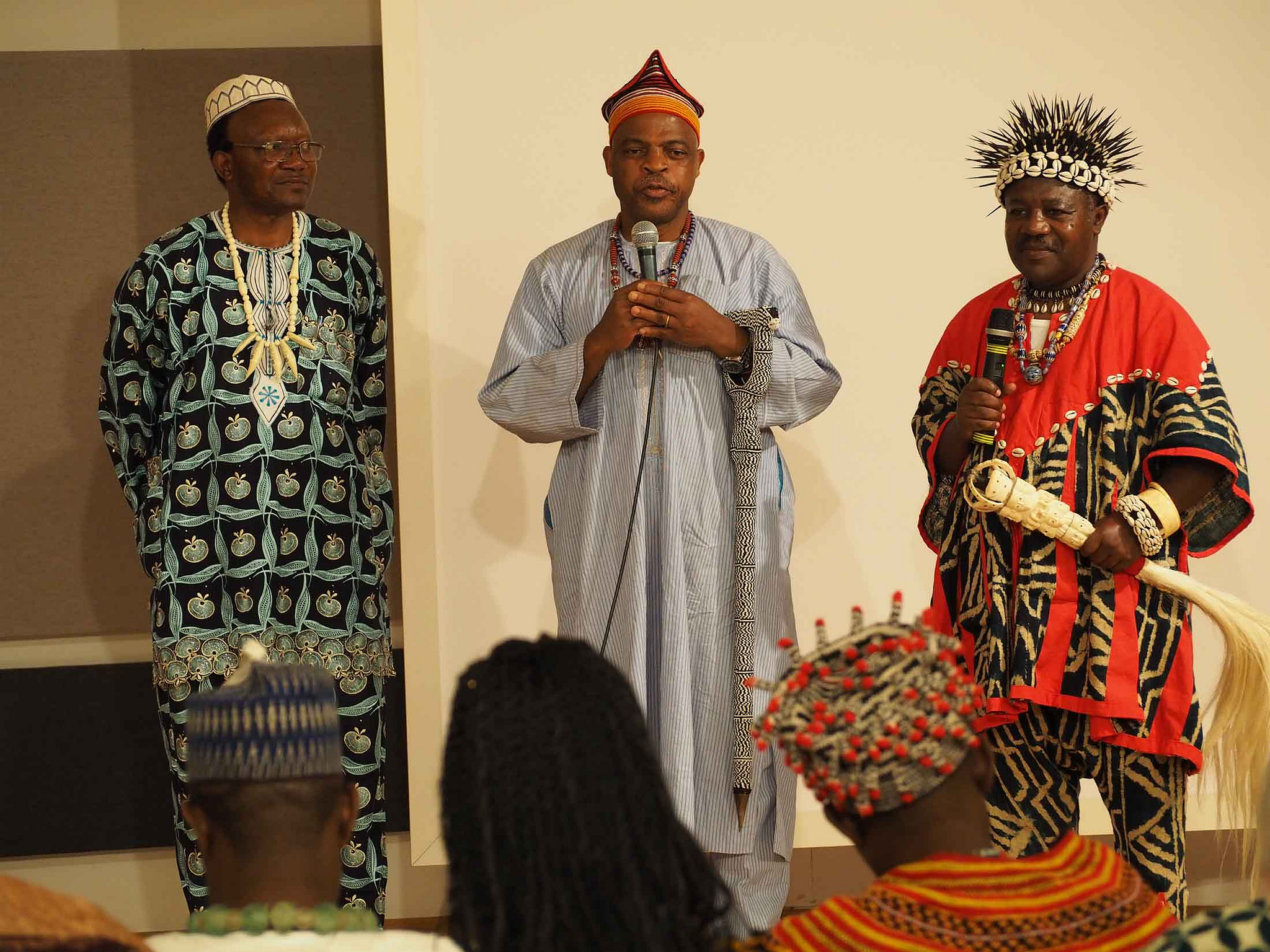
Photo Credit: SIF Loppiano
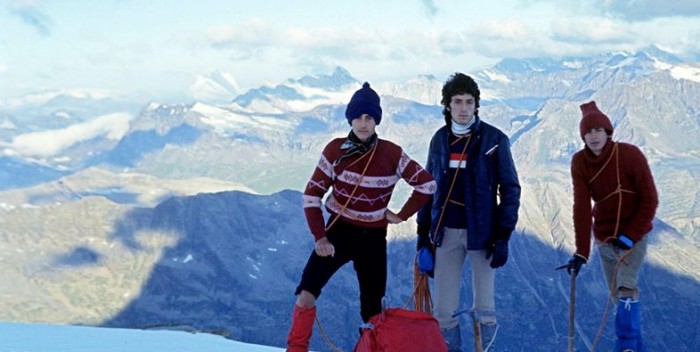
Carlo and Alberto: Friends also in holiness
Alberto Michelotti was born in Genoa on August 1958. He was an engineering student, head of a group of youths of the Focolare Movement, and loved to put himself in the last place to serve others. A mountain climbing enthusiast, on 20 August 1980 he fell during an ascent, and died in an iced gorge in the Maritime Alps. The day after his death, Carlo Grisolia, another boy in his group, was diagnosed with one of the most malignant tumours, and so started his 40-day stint of passing on the baton “to meet Jesus,” during which he often affirmed that as always, Alberto was there with him to give him support. Both were real troopers of the spirituality of communion, and still today continue to touch the hearts of the people who knew them.
In the mountains
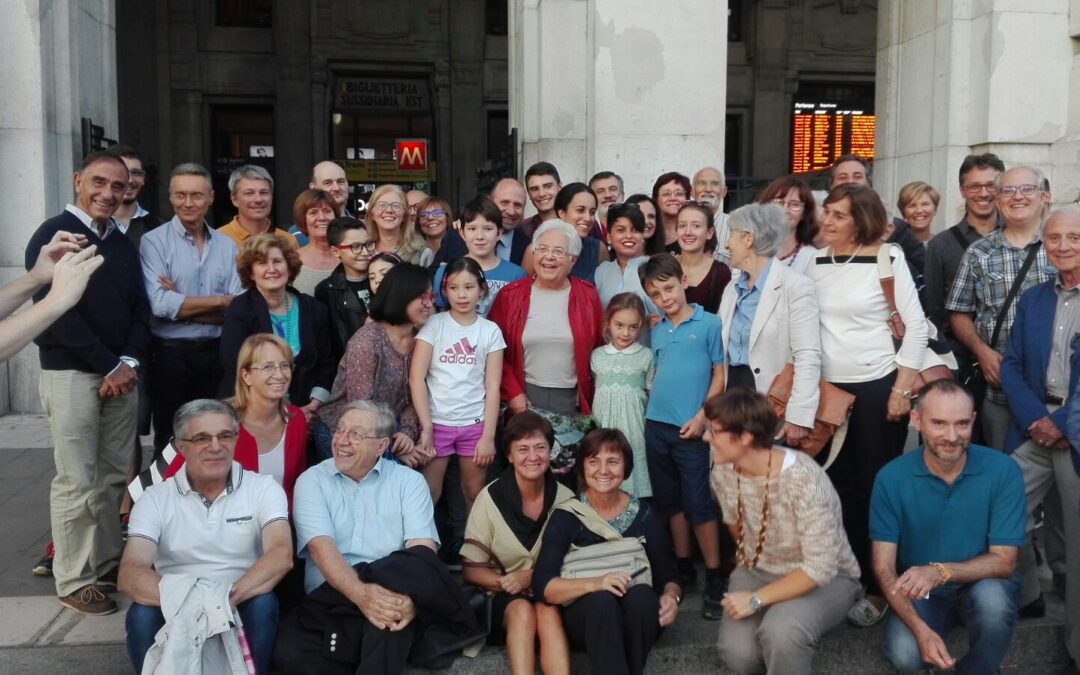
The Focolare thanks everyone
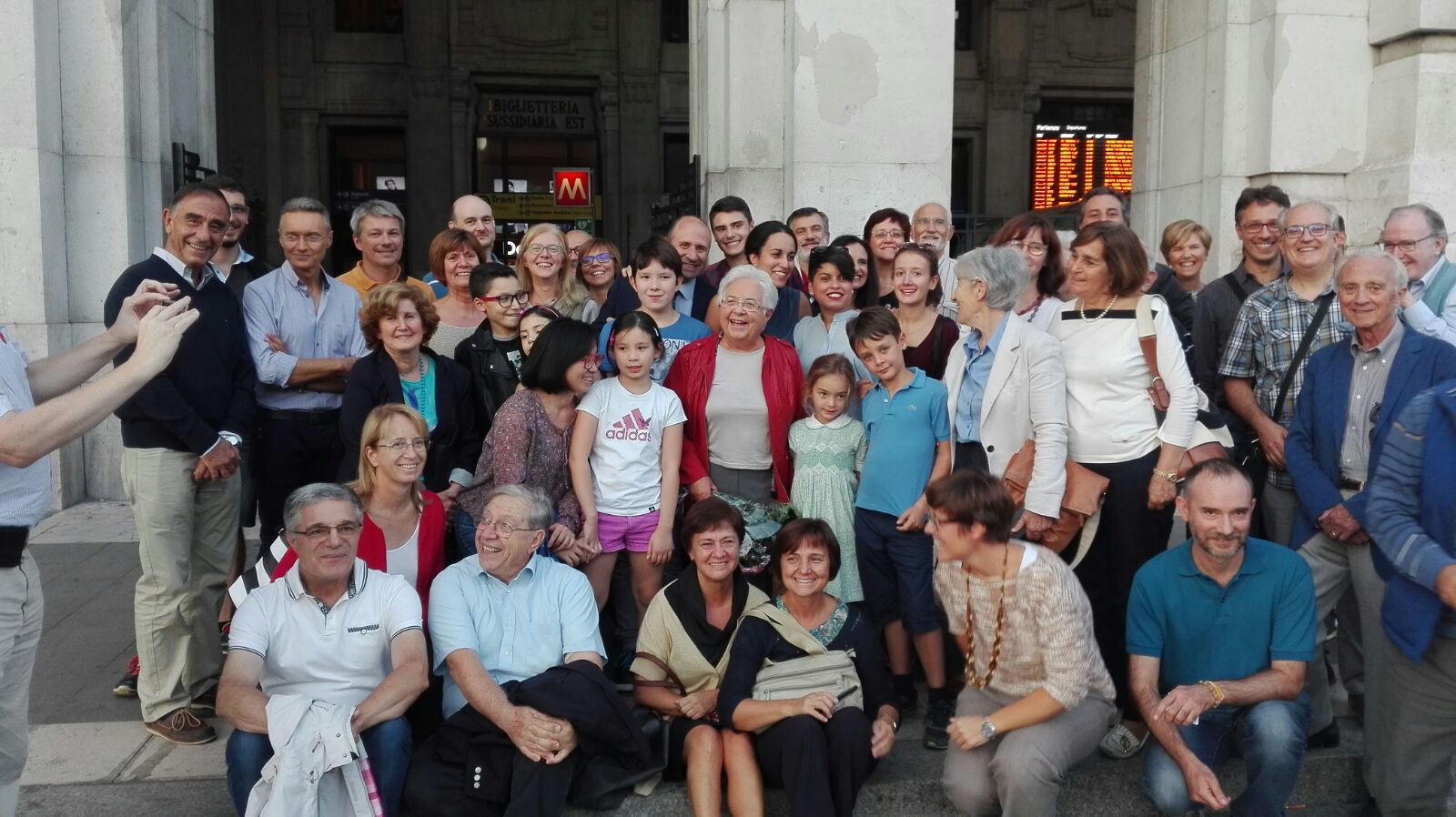
Members of the Focolare community in Milan welcomes Maria Voce.
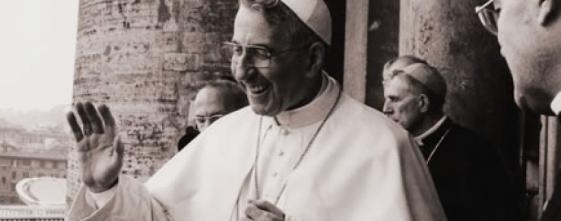
John Paul I, the “Smiling Pope”
 “The “Smiling Pope,” John Paul I, rose to the chair of St. Peter on 26 August, 20 days after Pope Paul VI’s death. Though his brief pontificate lasted only a month, there was time enough for us to receive a smile from him, along with words of benediction.» This is what Chiara Lubich wrote in the book, “The Cry” (1), where she highlighted the uninterrupted rapport established with the successors of Peter, and also with Albino Luciani in the brief stretch of his pontificate. “The new pope has the gift of making himself immediately understood by all – even by children – wrote Guglielmo Boselli (2), then the director of Città Nuova. His language, like that of Jesus, is normal and straight to the point. It is this wisdom coming from the heart that gives the capacity to immediately create a spontaneous relationship: the wonderful gift of one who came from a long pastoral experience, was always in touch with the people, and did not need any difficult speeches typical of professionals of the trade. He is a man of extensive humanistic and theological culture, who has overcome the phase of those still studying Christianity in a laboratory: his words are immediately and exactly what they should be. He just has to open his mouth and there is already communication, real communication.” He was elected after a brief conclave of only 26 hours, and as they said, “an apostolate of the Council” was elected. In fact, at the audience with the cardinals on 30 August, when reference was made to the Lumen gentium 22, he broached one of the key points of the Vatican II ecclesiology. “The Bishops – he said, speaking off the cuff – have to also think of the universal Church… behind you I see your bishops, and the Conferences which in the atmosphere established by the Council, have to give strong support to the Pope… So this is true, but today it is vital that the world sees us united… Have pity for this poor new Pope, who really didn’t expect to rise to this role. Try to help him and let us try together to give the world a show of unity, even sacrificing some things at times since we have so much to lose if the world does not see us firmly united.” On 28 September, after only 33 days, came the bewildering news of his death. “John Paul I – again wrote Guglielmo Boselli (3) – maybe had the task of bringing down the last external evidences of every type of “distance” between the pope, the bishop of Rome, “president of charity” and the people who still could resist: this was by carrying out dialogue as a man among many in a church, in which all is credible, and authentic. Pope Luciani did his share, which he perhaps shouldn’t have and couldn’t have done… The clear continuity with Pope Francis is very evident.”
“The “Smiling Pope,” John Paul I, rose to the chair of St. Peter on 26 August, 20 days after Pope Paul VI’s death. Though his brief pontificate lasted only a month, there was time enough for us to receive a smile from him, along with words of benediction.» This is what Chiara Lubich wrote in the book, “The Cry” (1), where she highlighted the uninterrupted rapport established with the successors of Peter, and also with Albino Luciani in the brief stretch of his pontificate. “The new pope has the gift of making himself immediately understood by all – even by children – wrote Guglielmo Boselli (2), then the director of Città Nuova. His language, like that of Jesus, is normal and straight to the point. It is this wisdom coming from the heart that gives the capacity to immediately create a spontaneous relationship: the wonderful gift of one who came from a long pastoral experience, was always in touch with the people, and did not need any difficult speeches typical of professionals of the trade. He is a man of extensive humanistic and theological culture, who has overcome the phase of those still studying Christianity in a laboratory: his words are immediately and exactly what they should be. He just has to open his mouth and there is already communication, real communication.” He was elected after a brief conclave of only 26 hours, and as they said, “an apostolate of the Council” was elected. In fact, at the audience with the cardinals on 30 August, when reference was made to the Lumen gentium 22, he broached one of the key points of the Vatican II ecclesiology. “The Bishops – he said, speaking off the cuff – have to also think of the universal Church… behind you I see your bishops, and the Conferences which in the atmosphere established by the Council, have to give strong support to the Pope… So this is true, but today it is vital that the world sees us united… Have pity for this poor new Pope, who really didn’t expect to rise to this role. Try to help him and let us try together to give the world a show of unity, even sacrificing some things at times since we have so much to lose if the world does not see us firmly united.” On 28 September, after only 33 days, came the bewildering news of his death. “John Paul I – again wrote Guglielmo Boselli (3) – maybe had the task of bringing down the last external evidences of every type of “distance” between the pope, the bishop of Rome, “president of charity” and the people who still could resist: this was by carrying out dialogue as a man among many in a church, in which all is credible, and authentic. Pope Luciani did his share, which he perhaps shouldn’t have and couldn’t have done… The clear continuity with Pope Francis is very evident.”
- Chiara Lubich, The Cry, New City ed. 2001
- Città Nuova, 17/1978, p. 8
- 19/1978, p. 9
October Word of Life
We can experience a new peace and a surprising joy when we forgive properly, realistically, sincerely. It is our ‘vendetta of love’. In a violent society such as the one we live in, forgiveness is a difficult issue to face. How can you forgive someone who has destroyed your family, committed unspeakable acts of criminality or, more simply, has deeply hurt you in personal matters, ruining your career or betraying your trust? The first instinctive reaction is to get your own back, rendering evil for evil, unleashing a spiral of hatred and aggression, and increasing barbarism in society. Or else it causes a breakdown in relations, nursing grudges and spite, an attitude that embitters life and poisons relationships. The Word of God erupts with force in the most varied situations of conflict and proposes, uncompromisingly, the most difficult and bravest solution: forgiveness. The invitation this time comes from a wise man from the ancient people of Israel, Ben Sirach, who shows how absurd it is to ask forgiveness of God if, in turn, you do not know how to forgive. And in an ancient text from Jewish tradition we read: ‘To whom does God pardon iniquity? To whoever pardons the wrongs done by others.’1 It is what Jesus himself taught in our prayer to the Father: ‘Father … forgive us our trespasses as we forgive those who trespass against us.’2 We too make mistakes, and every time we wish to be forgiven! We beg humbly and hope that we will be given again the chance for a new start, that we will be trusted once more. If it is like that for us, will it not be so also for others? Must we not love our neighbour as ourselves? Chiara Lubich, who continues to inspire our understanding of the Word, commented on the invitation to forgive in this way: ‘It is not the kind of forgetfulness that means not looking reality in the face. Forgiveness is not weakness, which is to say it is not failing out of fear of the strong to take account of the wrong they have done. Forgiveness is not about saying that something serious does not matter, or calling good what is evil. Forgiveness is not indifference. Forgiveness is an act of will and of clear thinking, and so of freedom. It is about accepting our brother or sister as they are, despite the wrong that has been committed, as God accepts us sinners, despite our defects. Forgiveness is about not responding to an affront with an affront, but it does as Paul says: “Do not be overcome by evil, but overcome evil with good” (Rom 12:21). ‘Forgiveness is about opening up for whoever does you wrong the possibility of a new relationship with you. So it gives the possibility for the two of you to begin life again, to have a future where evil does not have the last word.’ The Word of Life will help us resist the temptation of replying in kind, of immediately getting our own back. It will help us to see whoever is our ‘enemy’ with new eyes, recognizing them as a brother or sister. However bad they may be, they need someone to love them, to help them to change. It will be our ‘vendetta of love’. Chiara went on to explain: ‘You will say, “But it’s impossible.” That’s understandable. But here is the beauty of Christianity. It is not for nothing that you follow a God who, dying upon the cross, asked his Father to forgive those who killed him. Take courage. New life starts here. I can assure you, you will have a peace never tasted till now and a huge but surprising new joy.’3
Fr Fabio Ciardi, OMI
1 See Babylonian Talmud, Megillah 28a
2 See Mt 6:12 3 Costruire sulla roccia, Rome: Città Nuova, 1983, pp. 46-58
Subscribe to the monthly Word of Life (UK) October Word of Life (Living City Magazine – New York)
Living the Gospel: We’re not alone
Manna from Heaven “I’m an Iraqi veterinarian. My work was impacted by the current historic and dramatic situation my country is going through: now, the clients are few and far between. As I tried to find a way to push on, I was promised a job with a high salary in a city far from my own. It would be a favourable solution for my family, but would have placed me far from everyone else. My parents were insisting that I accept what seemed like manna from heaven. I spoke at length with my wife and it seemed to us that it wouldn’t be opportune for us, to leave at that moment, both because of our children and because several friends whose families were in need of our support, at least our moral support. Therefore we let go of the idea, blindly entrusting ourselves to God’s love. Incredibly, already from the day after we made this difficult decision my work picked up. I’m now earning four times more than what I was before.” (Y.K. Iraq) The Unexpected “We had been married for a short time when we discovered that we were expecting our first child. Something quite unexpected was also added to that: a small lump in the breast. Exams revealed a tumour. For me and my husband, who is a doctor, it was a hard blow, the first serious one in our marriage. Just three days after talking with a specialist I underwent surgery. He and his colleagues concluded that keeping the child would only aggravate the illness: we needed to proceed with an abortion immediately, so that I could begin chemotherapy. Finally, we decided on caesarean birth in the seventh month of pregnancy, when the child would be perfectly able to survive. Only afterwards would I begin chemotherapy and radiotherapy. Eight years have gone by since then. Now, we’re expecting our third child.” (M.D. France) More Joy in Giving “I searched for happiness in the wrong way: bad company, discos, cigarettes and alcohol. My boyfriend both peddled and took drugs. I was rebellious and morose both in school and at home, I dressed strangely, always in black with clothing full of studs and spikes. And I was totally indifferent to God. When I realized I had hit rock bottom, by sheer force of will I left that boy and abandoned the friendships. But how could I resolve the sorrow and sense of emptiness that I was feeling? When I began the new schoolyear my new Religion teacher inspired trust in me. Through my conversations with him I received the gift of faith. The encounter with God-Mercy changed me totally and satisfied my longing for love. I began to pray and seek God, getting involved in volunteering, experiencing that ‘there is more joy in giving than in receiving.’ I live a normal life: I go to school and do all the things a girl of my age does, with the only difference that now I have God in my heart.” (A.R. Italy)
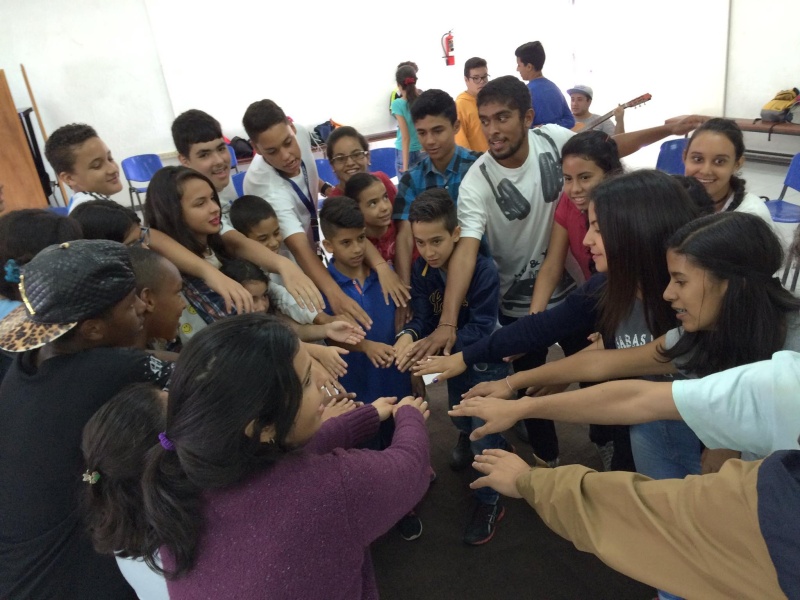
Travel Notes from Venezuela
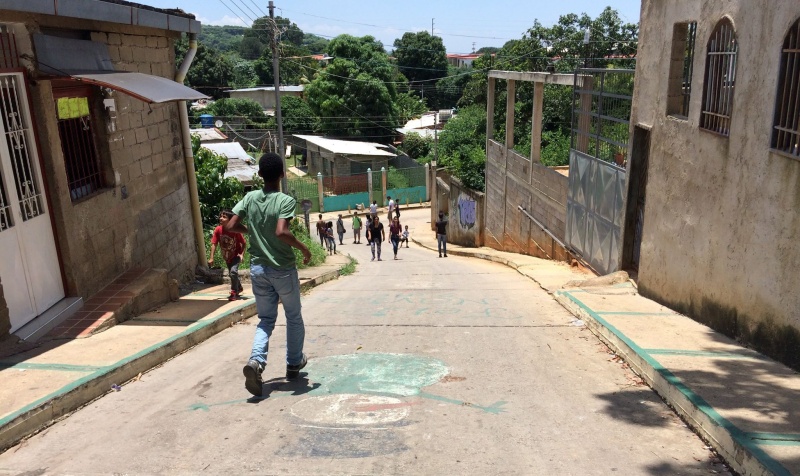 “I go back after 5 years. The impact is shocking. I don’t recognize Venezuela. The description given to me by the young man sitting next to me on the plane expresses the suffering of an afflicted but unresigned people. ‘I still have a bit of hope!’ he said to me as he described the beautiful sites in his country and invited to visit them. There’s a sense of emptiness in Caracas. Only the children provide a touch of liveliness to the absurd-looking reality. The journey to Puerto Ayucucho lasts 17 hours. Along the way my gaze is fixed on a girl rummaging in the garbage bins, looking for something to eat. But it is mostly the news of two boys 14 and 15 years old who were killed when caught stealing some mangos from a tree, that highlights the level of fear and non-sharing that has been reached. This is another form of homicide that is caused by hunger. The city is on the Colombia border. Its festering wound is represented in the murders of young people who, in the eyes of those who should protect them, appear to be violent thieves to be served the ulitmate punishment. This is also what happened to Felipe Andrés, a young seventeen-year-old who protected his brother by not telling those who had taken Felipe from his grandmother’s house where his brother could be found. Because of that he was brutally murdered with 17 bullets to match his age.
“I go back after 5 years. The impact is shocking. I don’t recognize Venezuela. The description given to me by the young man sitting next to me on the plane expresses the suffering of an afflicted but unresigned people. ‘I still have a bit of hope!’ he said to me as he described the beautiful sites in his country and invited to visit them. There’s a sense of emptiness in Caracas. Only the children provide a touch of liveliness to the absurd-looking reality. The journey to Puerto Ayucucho lasts 17 hours. Along the way my gaze is fixed on a girl rummaging in the garbage bins, looking for something to eat. But it is mostly the news of two boys 14 and 15 years old who were killed when caught stealing some mangos from a tree, that highlights the level of fear and non-sharing that has been reached. This is another form of homicide that is caused by hunger. The city is on the Colombia border. Its festering wound is represented in the murders of young people who, in the eyes of those who should protect them, appear to be violent thieves to be served the ulitmate punishment. This is also what happened to Felipe Andrés, a young seventeen-year-old who protected his brother by not telling those who had taken Felipe from his grandmother’s house where his brother could be found. Because of that he was brutally murdered with 17 bullets to match his age. 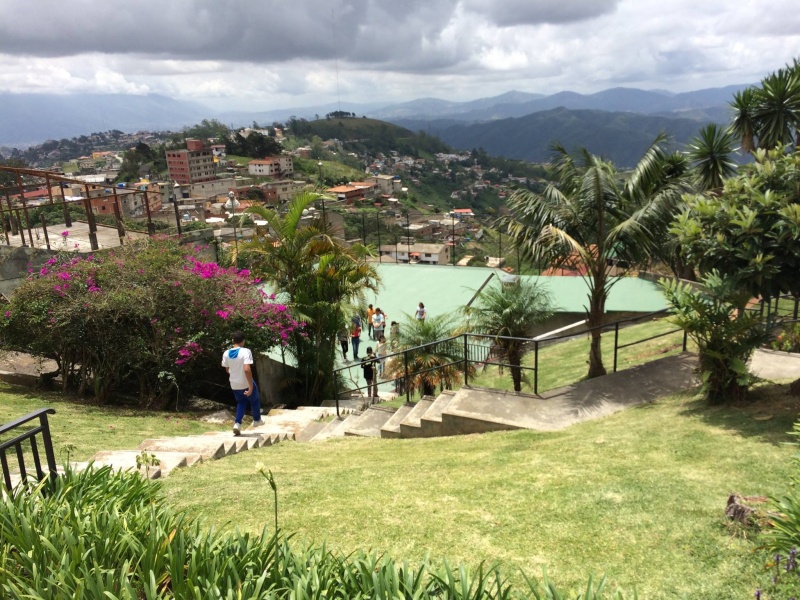 We’re in one of the quarters outside Valencia. I’m surprised by the queue for buying gas tanks. Twelve year-old Angel, candid as an angel, confides with disarming simplicity: ‘I don’t grow because I never drink milk.’ Even powdered milk is a luxury item in this country. I’m left impressed by the lively, simple gazes of the little ones I have met. An evening with the youth. You can feel their strong and palpable desire for redemption. Their experiences strengthen their desire to be carriers of hope, beginning with their friends at school, at work…. La Nuvoletta. A minibus takes us up to the Mariapolis Centre called La Nuvoletta. On the way we pass through some poverty-stricken areas. Here too, we find long queues of people hoping to be able to buy at least something. Gabriel thanks me for the lunch I offered him. ‘You know, I only eat pasta on Sunday.’ ‘And the other days?’ I ask. ‘On the other days, only sopa.’ I ask him if he likes being with people. “Yes,” he tells me, “because here everybody’s happy.”
We’re in one of the quarters outside Valencia. I’m surprised by the queue for buying gas tanks. Twelve year-old Angel, candid as an angel, confides with disarming simplicity: ‘I don’t grow because I never drink milk.’ Even powdered milk is a luxury item in this country. I’m left impressed by the lively, simple gazes of the little ones I have met. An evening with the youth. You can feel their strong and palpable desire for redemption. Their experiences strengthen their desire to be carriers of hope, beginning with their friends at school, at work…. La Nuvoletta. A minibus takes us up to the Mariapolis Centre called La Nuvoletta. On the way we pass through some poverty-stricken areas. Here too, we find long queues of people hoping to be able to buy at least something. Gabriel thanks me for the lunch I offered him. ‘You know, I only eat pasta on Sunday.’ ‘And the other days?’ I ask. ‘On the other days, only sopa.’ I ask him if he likes being with people. “Yes,” he tells me, “because here everybody’s happy.”  At the departure time, another bombshell: I learn that Fabián, such an innocent and lively child, had lost his father a few months earlier, murded by assassins. It felt like I was reliving my own experience: the illness and death of my father, which led me back to God. We look at each other and seem to understand one another. We arrive in Maracaibo, the hottest city in Venezuela. We look around and travel the 8 or more kilometres across the bridge that connects Maracaibo to San Francisco. A day with the Young For Unity awaits us in Tamale. Hearing a thirteen-year-old say: “I encouraged my mother to forgive those who had killed my father,” cannot leave you indifferent. The next appointment was in a parish. They greeted us with songs and then the dicusssion began: ‘What do you do when a kid tells you that he doesn’t go home because there’s nothing to eat?’ I try to respond by talking about the suffering and silence on the part of God that Jesus felt on the Cross. We say goodbye with a thought that one of the boys shared with everyone: ‘The strength of love is stronger than suffering’.” (A. S.)
At the departure time, another bombshell: I learn that Fabián, such an innocent and lively child, had lost his father a few months earlier, murded by assassins. It felt like I was reliving my own experience: the illness and death of my father, which led me back to God. We look at each other and seem to understand one another. We arrive in Maracaibo, the hottest city in Venezuela. We look around and travel the 8 or more kilometres across the bridge that connects Maracaibo to San Francisco. A day with the Young For Unity awaits us in Tamale. Hearing a thirteen-year-old say: “I encouraged my mother to forgive those who had killed my father,” cannot leave you indifferent. The next appointment was in a parish. They greeted us with songs and then the dicusssion began: ‘What do you do when a kid tells you that he doesn’t go home because there’s nothing to eat?’ I try to respond by talking about the suffering and silence on the part of God that Jesus felt on the Cross. We say goodbye with a thought that one of the boys shared with everyone: ‘The strength of love is stronger than suffering’.” (A. S.)

The Healing Power of Love
 John: “At the beginning of the school year, our son came home after his first day in year 11 and said to my wife that he was not returning to school – he said that he couldn’t stand people! He disappeared silently into his room for over a year, coming out only when he thought we were asleep. He withdrew from me entirely and only talked to his mother sporadically. I felt completely abandoned and lost, but Claire’s love managed to help me accept the rejection. What helped me was the phrase of the Gospel: ‘As I have loved you, so you must love one another’ (Jn 13:34). One night he made a desperate decision to commit suicide. As we called for an ambulance, he climbed out a window and ran away. The next hours were a blur: the ambulance arrived but he was gone; police support came too. He eventually came back and he was rushed to hospital for treatment. A week in hospital intensive care for someone stricken with panic and terror of people and spaces is a pretty scary thing. Night after night, and day after day, we slept in shifts so one of us would be there whenever he woke up. That ‘night shift’ was the only concrete love I could offer him; I could at least be a presence if needed – something I know that he later understood. When he came home, we thought that we could keep up that 24 hour suicide watch, but pretty soon had to accept that this was humanly impossible. We prayed together in a new way seeking God’s will. Together we offered and entrusted to God our son – His son – accepting completely that we could not prevent him trying to commit suicide again. I well remember the fear, pain, emptiness, anguish and hopelessness of this time, and then, in my acceptance of this terrible role, the feeling of real union with God and with Claire. In the year that followed, we managed to get him to reluctantly agree to enter a day therapy program. We hung in with our background support role and I think that God did the rest from the mundane of our ever-extending health insurance cover, to the miraculous – of an incredible group of fractured kids who supported and lived for each other.” Claire: “One of the girls in the group, with her multiple challenges, not the least of which was drug addiction, became part of our family life, and, as time went on, she and our son grew closer together. She hung in with him and helped draw him through his anxious times. And he stood by her rugged attempts at drug withdrawal. But it wasn’t easy.” John: “Their relationship suffered a setback due to our son’s stand on drugs, his personal abhorrence of them. But slowly, over the period after release from her months of involuntary hospitalisation, they tried again and worked at rebuilding their relationship on a firmer ‘no drugs’ foundation. Eventually they decided to marry.” Claire: “But, as everyone knows, wedding preparation is a pretty stressful experience, and our soon-to-be daughter-in-law was still working in an environment where drug taking was a common way to cope with life. So the inevitable happened. Our son rang me a month before the wedding and said bleakly, ‘Mum, she’s on ice again*. What should I do?’ My heart fell through the floor, and my brain went blank. Then I said, ‘I can’t tell you what to do – only the two of you have the grace for that. But I can tell you that, if you look into your heart and you see that you have loved wisely to the very end, then that tells you that it’s time for your part to finish. But if you look into your heart and you see that there is even the smallest bit more of loving wisely that you can give, then you keep trying.’ There was a long, long pause. Then a big, sad sigh. And he said, ‘I guess I can love a bit more’. Eventually they found a place that allowed her to have an extended live-in rehabilitation program with its associated outpatient support systems. It’s now 14 hard months down the track, and she is still clean – a tribute to her continuing efforts in working with her counsellors, fuelled by her incredible love for her husband – our son – in his ‘no drugs’ stand, as well as to his extraordinary love for her through all their struggles. We’re so proud of both of them. It has been a long road for all of us. And I guess one that we’ll all travel or the rest of our lives. But what I have seen shining through all the tears is that God’s love for John and me gave us the wisdom and strength to love our son in the way he needed to the end, and that maybe our love showed our son the way to love his wife in just the way that was right for her.”
John: “At the beginning of the school year, our son came home after his first day in year 11 and said to my wife that he was not returning to school – he said that he couldn’t stand people! He disappeared silently into his room for over a year, coming out only when he thought we were asleep. He withdrew from me entirely and only talked to his mother sporadically. I felt completely abandoned and lost, but Claire’s love managed to help me accept the rejection. What helped me was the phrase of the Gospel: ‘As I have loved you, so you must love one another’ (Jn 13:34). One night he made a desperate decision to commit suicide. As we called for an ambulance, he climbed out a window and ran away. The next hours were a blur: the ambulance arrived but he was gone; police support came too. He eventually came back and he was rushed to hospital for treatment. A week in hospital intensive care for someone stricken with panic and terror of people and spaces is a pretty scary thing. Night after night, and day after day, we slept in shifts so one of us would be there whenever he woke up. That ‘night shift’ was the only concrete love I could offer him; I could at least be a presence if needed – something I know that he later understood. When he came home, we thought that we could keep up that 24 hour suicide watch, but pretty soon had to accept that this was humanly impossible. We prayed together in a new way seeking God’s will. Together we offered and entrusted to God our son – His son – accepting completely that we could not prevent him trying to commit suicide again. I well remember the fear, pain, emptiness, anguish and hopelessness of this time, and then, in my acceptance of this terrible role, the feeling of real union with God and with Claire. In the year that followed, we managed to get him to reluctantly agree to enter a day therapy program. We hung in with our background support role and I think that God did the rest from the mundane of our ever-extending health insurance cover, to the miraculous – of an incredible group of fractured kids who supported and lived for each other.” Claire: “One of the girls in the group, with her multiple challenges, not the least of which was drug addiction, became part of our family life, and, as time went on, she and our son grew closer together. She hung in with him and helped draw him through his anxious times. And he stood by her rugged attempts at drug withdrawal. But it wasn’t easy.” John: “Their relationship suffered a setback due to our son’s stand on drugs, his personal abhorrence of them. But slowly, over the period after release from her months of involuntary hospitalisation, they tried again and worked at rebuilding their relationship on a firmer ‘no drugs’ foundation. Eventually they decided to marry.” Claire: “But, as everyone knows, wedding preparation is a pretty stressful experience, and our soon-to-be daughter-in-law was still working in an environment where drug taking was a common way to cope with life. So the inevitable happened. Our son rang me a month before the wedding and said bleakly, ‘Mum, she’s on ice again*. What should I do?’ My heart fell through the floor, and my brain went blank. Then I said, ‘I can’t tell you what to do – only the two of you have the grace for that. But I can tell you that, if you look into your heart and you see that you have loved wisely to the very end, then that tells you that it’s time for your part to finish. But if you look into your heart and you see that there is even the smallest bit more of loving wisely that you can give, then you keep trying.’ There was a long, long pause. Then a big, sad sigh. And he said, ‘I guess I can love a bit more’. Eventually they found a place that allowed her to have an extended live-in rehabilitation program with its associated outpatient support systems. It’s now 14 hard months down the track, and she is still clean – a tribute to her continuing efforts in working with her counsellors, fuelled by her incredible love for her husband – our son – in his ‘no drugs’ stand, as well as to his extraordinary love for her through all their struggles. We’re so proud of both of them. It has been a long road for all of us. And I guess one that we’ll all travel or the rest of our lives. But what I have seen shining through all the tears is that God’s love for John and me gave us the wisdom and strength to love our son in the way he needed to the end, and that maybe our love showed our son the way to love his wife in just the way that was right for her.”
Experience shared at Health Symposium “Darkness to Light – Spirituality of Unity in Chronic Disease and Disability” Australia, July 2016
*Crystal methamphetamine
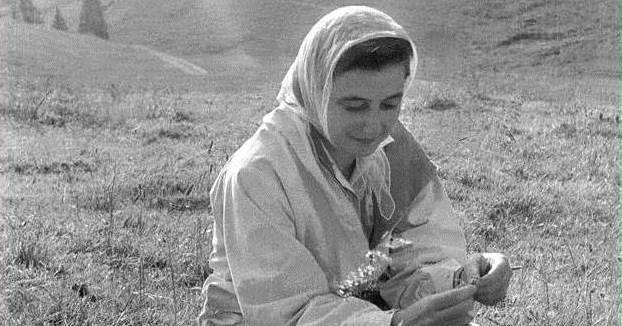
Chiara Lubich: “I have only one Spouse on earth”
 During the summer of 1949 Chiara Lubich, who was 29 years old at the time, had an experience of light and life. Leaving that “paradise” up in the mountains was very difficult, but she understood that God wanted her to be immersed in the sufferings of humanity “drying up the waters of tribulation” in those who suffer the most. There and then she wrote these words: “I have only one Spouse on earth: Jesus Forsaken. I have no other God but Him. In Him there is the whole of Paradise with the Trinity and the whole of the earth with Humanity. Therefore what is His is mine, and nothing else. And His is universal Pain, and therefore mine. I will go through the world seeking Him in every instant of my life. What hurts me is mine. Mine the pain that grazes me in the present. Mine the pain of the souls beside me (that is my Jesus). Mine all that is not peace, joy, beautiful, lovable, serene… in a word, what is not Paradise. Because I too have my Paradise, but is that in my Spouse’s heart. I know no other. So it will be for the years I have left: athirst for pain, for anguish, for despair, for sadness, for separation, for exile, for forsakenness, for torment, for… all that is Him, and He is Sin, Hell. In this way I will dry up the waters of tribulation in many hearts nearby and, through communion with my almighty Spouse, in many far away. I shall pass as a Fire that consumes all that must fall and leaves standing only the Truth. But it is necessary to be like Him: to be Him in the present moment of life.” From: Chiara Lubich, The Cry, Ed. New City London (pp. 61-2)
During the summer of 1949 Chiara Lubich, who was 29 years old at the time, had an experience of light and life. Leaving that “paradise” up in the mountains was very difficult, but she understood that God wanted her to be immersed in the sufferings of humanity “drying up the waters of tribulation” in those who suffer the most. There and then she wrote these words: “I have only one Spouse on earth: Jesus Forsaken. I have no other God but Him. In Him there is the whole of Paradise with the Trinity and the whole of the earth with Humanity. Therefore what is His is mine, and nothing else. And His is universal Pain, and therefore mine. I will go through the world seeking Him in every instant of my life. What hurts me is mine. Mine the pain that grazes me in the present. Mine the pain of the souls beside me (that is my Jesus). Mine all that is not peace, joy, beautiful, lovable, serene… in a word, what is not Paradise. Because I too have my Paradise, but is that in my Spouse’s heart. I know no other. So it will be for the years I have left: athirst for pain, for anguish, for despair, for sadness, for separation, for exile, for forsakenness, for torment, for… all that is Him, and He is Sin, Hell. In this way I will dry up the waters of tribulation in many hearts nearby and, through communion with my almighty Spouse, in many far away. I shall pass as a Fire that consumes all that must fall and leaves standing only the Truth. But it is necessary to be like Him: to be Him in the present moment of life.” From: Chiara Lubich, The Cry, Ed. New City London (pp. 61-2)
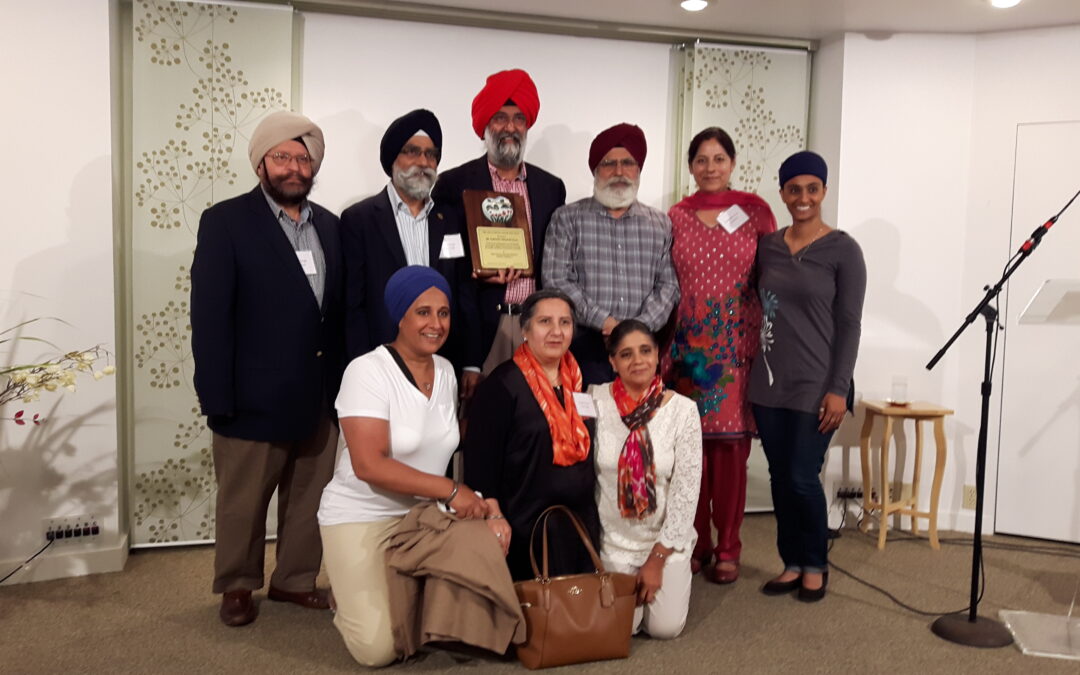
2016 Luminosa Award to Sikh Leader
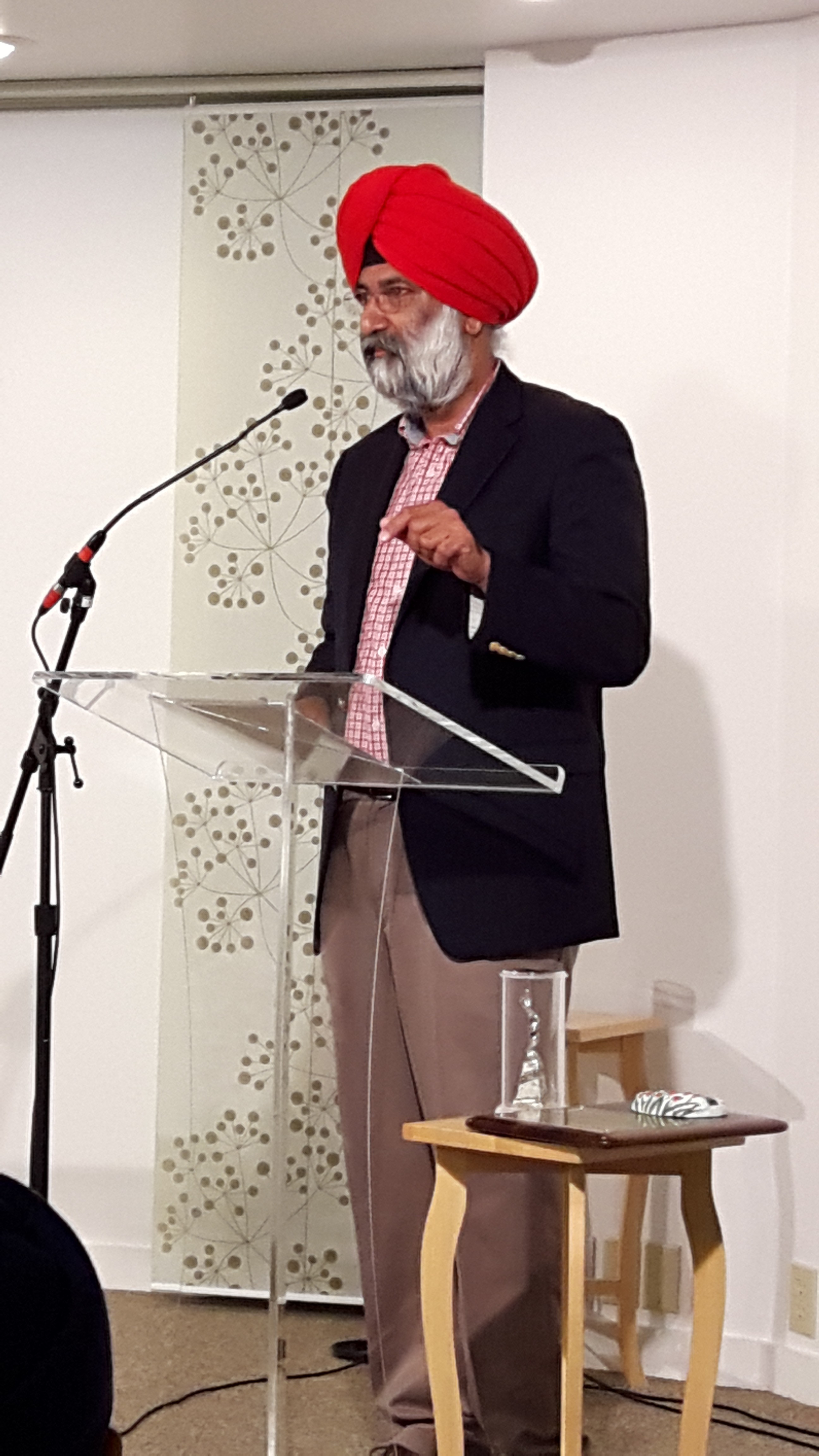 Unity, dialogue, communion – these are words that describe the heart of the mission of the Focolare, and these three words sum up the commitment of Dr Tarunjit Singh Butalia, a scientist at Ohio State University in Columbus, USA. On September 18, 2016 he accepted the 2016 Luminosa Award in Hyde Park, NY. “Your decade-long tireless effort in building bridges on various levels” said Focolare president, Maria Voce, “deserves our admiration and deep appreciation. We feel solidarity and fraternal ties with you and with the Sikh community in the promoting, together with others, peace and care of our common home.” Urged by a strong belief that religions have a crucial role to play in the great work of interreligious dialogue, in 2011 he accepted the invitation of Pope Benedict XVI to participate in the World Day of Prayer for Peace in Assisi. In his acceptance speech the scientist recalled the friendly invitations to interreligious meals and picnics that marked the beginnings of his contacts with the Focolare Movement. A friendship, he explained, that over time developed into trust. He stressed the particular role that religion has always played in American society, precisely because it is a nation of immigrants. While former waves of immigrants seamlessly blended into the people after a few generations, many immigrants from the last 50 years – like Muslims, Buddhists, Sikhs, Hindus, Jains and Baha’i – want to maintain their religious identity. Butalia said “they have made the United States one of the most cosmopolitan countries in the world.” He also observed the importance of acknowledging pluralism as a value “where each part maintains its identity and yet remains part of the harmonious whole.” “We have to focus on building relationships,’ he said; “we need to be able to talk about our differences.”
Unity, dialogue, communion – these are words that describe the heart of the mission of the Focolare, and these three words sum up the commitment of Dr Tarunjit Singh Butalia, a scientist at Ohio State University in Columbus, USA. On September 18, 2016 he accepted the 2016 Luminosa Award in Hyde Park, NY. “Your decade-long tireless effort in building bridges on various levels” said Focolare president, Maria Voce, “deserves our admiration and deep appreciation. We feel solidarity and fraternal ties with you and with the Sikh community in the promoting, together with others, peace and care of our common home.” Urged by a strong belief that religions have a crucial role to play in the great work of interreligious dialogue, in 2011 he accepted the invitation of Pope Benedict XVI to participate in the World Day of Prayer for Peace in Assisi. In his acceptance speech the scientist recalled the friendly invitations to interreligious meals and picnics that marked the beginnings of his contacts with the Focolare Movement. A friendship, he explained, that over time developed into trust. He stressed the particular role that religion has always played in American society, precisely because it is a nation of immigrants. While former waves of immigrants seamlessly blended into the people after a few generations, many immigrants from the last 50 years – like Muslims, Buddhists, Sikhs, Hindus, Jains and Baha’i – want to maintain their religious identity. Butalia said “they have made the United States one of the most cosmopolitan countries in the world.” He also observed the importance of acknowledging pluralism as a value “where each part maintains its identity and yet remains part of the harmonious whole.” “We have to focus on building relationships,’ he said; “we need to be able to talk about our differences.”  Dr Butalia then proposed to take a step further than the Golden Rule (Do to others as you would want them to do to you,” Mt 7:12). He called his version the “Platinum Rule”: “Do to others as they would want you to do to them,” moving beyond the assumption that the other people would like to be treated the way that you would like to be treated yourself.” He then invited the 130 participants to “listen more than we speak” and to never compare the “best of our religion with the worst of the others.” Referring to Islamophobia, Butalia remembered that all religions are interdependent on each other and that we have to stand up against discrimination against any faith. Closing, he quoted a disciple of the Sikh founder Guru Nanak, “No one is my enemy, and no one is a stranger. I get along with all.”
Dr Butalia then proposed to take a step further than the Golden Rule (Do to others as you would want them to do to you,” Mt 7:12). He called his version the “Platinum Rule”: “Do to others as they would want you to do to them,” moving beyond the assumption that the other people would like to be treated the way that you would like to be treated yourself.” He then invited the 130 participants to “listen more than we speak” and to never compare the “best of our religion with the worst of the others.” Referring to Islamophobia, Butalia remembered that all religions are interdependent on each other and that we have to stand up against discrimination against any faith. Closing, he quoted a disciple of the Sikh founder Guru Nanak, “No one is my enemy, and no one is a stranger. I get along with all.”
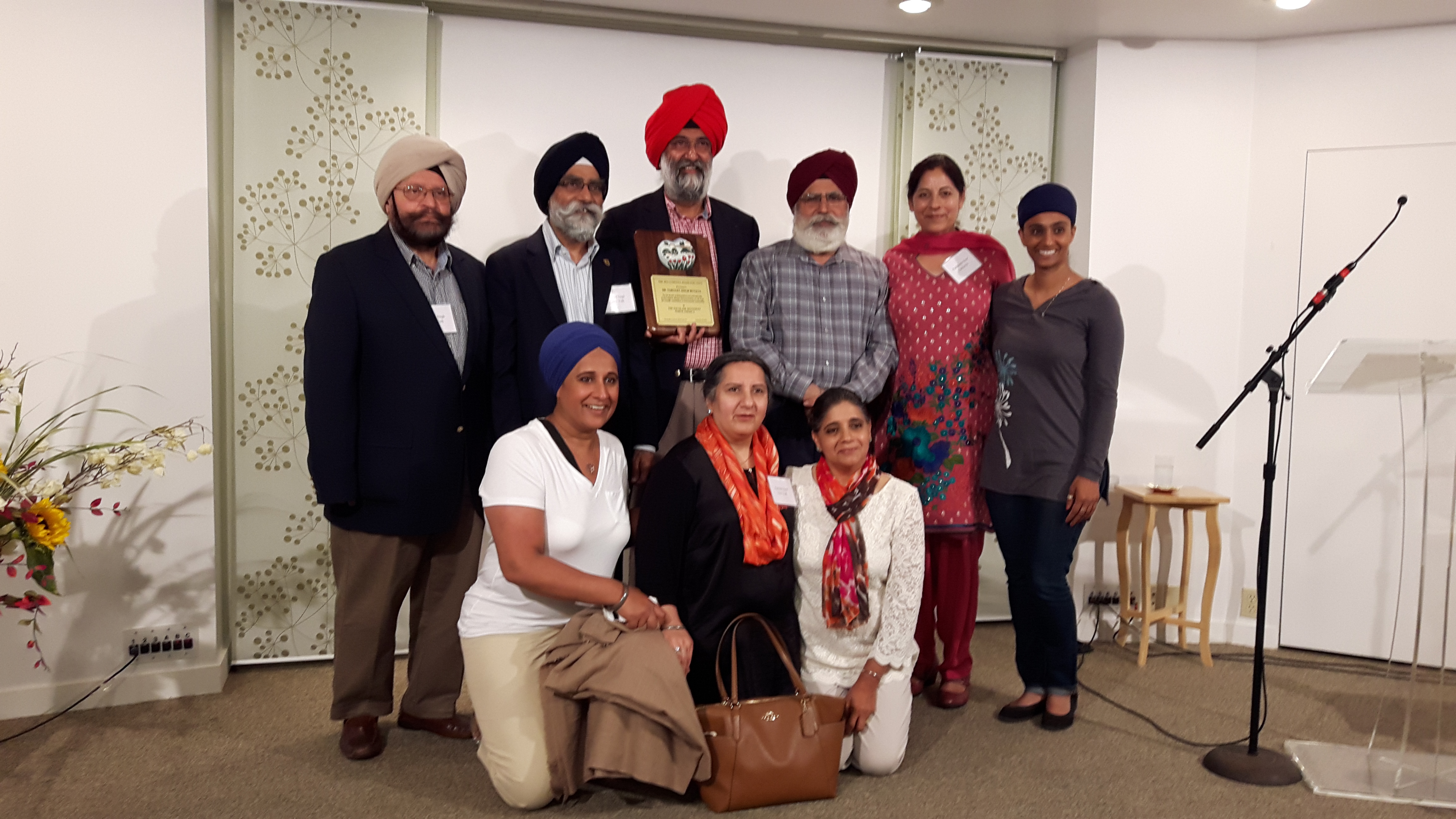
Dr Tarunjit Butalia with the Sikh delegation
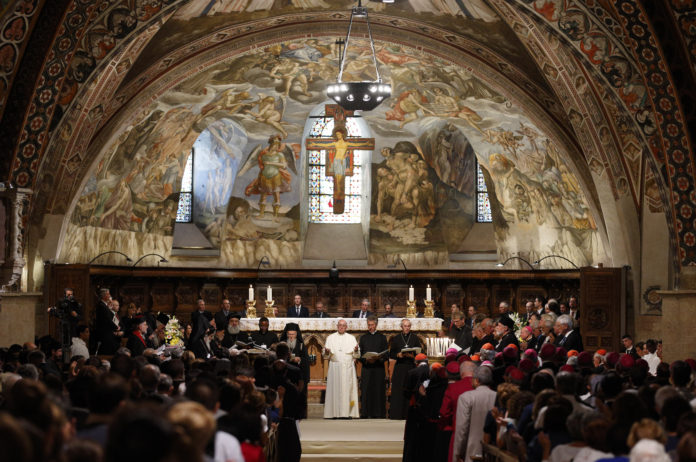
From Assisi to Assisi, from Francis to Francis
 Organized by the Umbria Diocese with the Franciscan family and the St. Egidio Community, the event gathered the religious leaders of the world, and was also attended by cultured men and women and representatives of institutions. Also the Focolare Movement was present in both the preparatory and participation phases, especially the communities in Umbria and in the persons of Rita Moussalem and Roberto Catalano, heads of the Focolare’s interreligious dialogue. With his presence on 20 September, Pope Francis continued the work of John Paul II who had felt the need in 1986 to institute a day of prayer for peace, and had foreseen the role religions could play to avoid conflicts and also contribute to resolving them. In 2011, Benedict XVI had presented peace not only as a commitment of men of faith, but also as a cultural project. But the world is no longer that of the 1980s, the bipolar world of the Cold war. The world is now globalized and multipolar, where the wars have multiplied without ever being wars of religion. Pope Francis greeted each of the leaders personally, starting from a group of refugees who represented the challenges of the world today. It was not only a formal act. There were deep moments of intense bonding that were able to establish important ties for the future. A second moment was the luncheon at the Holy Convent, to which the Pope had invited all to be by his side. Having a meal together under the same roof was in itself an act of peace, after which, a common moment of prayer followed, but not together. Each religion had a facility where members could go to pray for world peace, according to their own religious tradition. Each did so distinctly; this fact aimed to cancel the doubt that these moments were an attempt to amalgamate all religions together. The Christians prayed together to demonstrate that unity among the Churches is fundamental in giving important contribution to peace, as followers of Christ.
Organized by the Umbria Diocese with the Franciscan family and the St. Egidio Community, the event gathered the religious leaders of the world, and was also attended by cultured men and women and representatives of institutions. Also the Focolare Movement was present in both the preparatory and participation phases, especially the communities in Umbria and in the persons of Rita Moussalem and Roberto Catalano, heads of the Focolare’s interreligious dialogue. With his presence on 20 September, Pope Francis continued the work of John Paul II who had felt the need in 1986 to institute a day of prayer for peace, and had foreseen the role religions could play to avoid conflicts and also contribute to resolving them. In 2011, Benedict XVI had presented peace not only as a commitment of men of faith, but also as a cultural project. But the world is no longer that of the 1980s, the bipolar world of the Cold war. The world is now globalized and multipolar, where the wars have multiplied without ever being wars of religion. Pope Francis greeted each of the leaders personally, starting from a group of refugees who represented the challenges of the world today. It was not only a formal act. There were deep moments of intense bonding that were able to establish important ties for the future. A second moment was the luncheon at the Holy Convent, to which the Pope had invited all to be by his side. Having a meal together under the same roof was in itself an act of peace, after which, a common moment of prayer followed, but not together. Each religion had a facility where members could go to pray for world peace, according to their own religious tradition. Each did so distinctly; this fact aimed to cancel the doubt that these moments were an attempt to amalgamate all religions together. The Christians prayed together to demonstrate that unity among the Churches is fundamental in giving important contribution to peace, as followers of Christ.  The concluding ceremony took place in the square in front of the Basilica of St. Francis. The leaders of each religion sat in a semicircle around Pope Francis, as a sign that nobody claimed superiority, notwithstanding the esteem and recognition of the Pope of Rome. His name, his example of a measured life, his words and gestures were constantly cited in the course of the 29 panels or round tables that were held during the prior two days in every corner of Assisi. The conclusion was marked by profound and vital considerations by the Christian, Buddhist and Muslim leaders, and also by moving testimonials: that of a young Syrian mother who arrived in Italy through the humanitarian corridors and that of an elderly Jewish Rabbi, who survived the Nazi concentration camps. The evening was heightened by the speech of Pope Francis who traced a peace roadmap. In fact, «Only peace is holy, not war!» The Pope expressed the meaning of peace by speaking of forgiveness, acceptance, collaboration and education as the fundamental elements to make it possible. «Our future is to live together», he affirmed. It is an idea that universalises the interpretation of the great Bauman who, in the opening ceremony, had underlined how humanity is called today to live the dimension of “we,” and forget the “they.” Once again the framework of Assisi was a decisive element. In fact, peace here is present even in the air we breathe. During these days the Franciscan family offered an example of humble, intelligent and respectful hospitality, constantly at the service of the leaders of the different faiths. It was an evident demonstration of how the humbleness of Francis of Assisi spoke out and asked his followers to make this a fundamental condition for dialogue and peace. It was a sign that peace is built by all of us together, and that each one brings a unique and indispensable gift for the processes of peace. by Roberto Catalano Source: New City
The concluding ceremony took place in the square in front of the Basilica of St. Francis. The leaders of each religion sat in a semicircle around Pope Francis, as a sign that nobody claimed superiority, notwithstanding the esteem and recognition of the Pope of Rome. His name, his example of a measured life, his words and gestures were constantly cited in the course of the 29 panels or round tables that were held during the prior two days in every corner of Assisi. The conclusion was marked by profound and vital considerations by the Christian, Buddhist and Muslim leaders, and also by moving testimonials: that of a young Syrian mother who arrived in Italy through the humanitarian corridors and that of an elderly Jewish Rabbi, who survived the Nazi concentration camps. The evening was heightened by the speech of Pope Francis who traced a peace roadmap. In fact, «Only peace is holy, not war!» The Pope expressed the meaning of peace by speaking of forgiveness, acceptance, collaboration and education as the fundamental elements to make it possible. «Our future is to live together», he affirmed. It is an idea that universalises the interpretation of the great Bauman who, in the opening ceremony, had underlined how humanity is called today to live the dimension of “we,” and forget the “they.” Once again the framework of Assisi was a decisive element. In fact, peace here is present even in the air we breathe. During these days the Franciscan family offered an example of humble, intelligent and respectful hospitality, constantly at the service of the leaders of the different faiths. It was an evident demonstration of how the humbleness of Francis of Assisi spoke out and asked his followers to make this a fundamental condition for dialogue and peace. It was a sign that peace is built by all of us together, and that each one brings a unique and indispensable gift for the processes of peace. by Roberto Catalano Source: New City
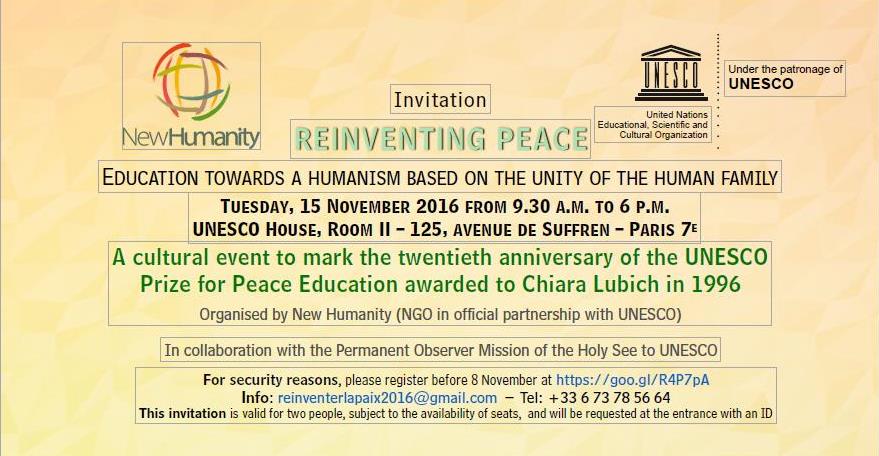
Chiara Lubich: “Reinventing Peace”
 “EDUCATION TOWARDS A HUMANISM BASED ON THE UNITY OF THE HUMAN FAMILY” Paris, 19 December 1996: UNESCO awarded the prestigious Prize for Peace Education to Chiara Lubich, Founder of the Focolare Movement, in recognition of her lifelong efforts in the building of Peace, and education of thousands of people of every creed and latitude, towards this goal. The theme of peace education is more than ever actual today. Promoted by the UNESCO and the New Humanity Movement, the event will be celebrated at the UNESCO Headquarters (Paris, France) on 15 November, from 10.00 am to 6.00 pm. A representative from UNESCO will open the session, to be followed by the speeches of Bishop Francesco Follo, Permanent Observer of the Holy See to UNESCO, and Maria Voce and Jesús Morán, President and Co-President of the Focolare Movement, respectively. Other two focal points will follow: five ideas for peace education today, and dialogue in a united and plural world. Invitation: Unesco Event Registration “Reinventing Peace” event Read Chiara Lubich’s speech in 1996 Watch video (Italian) https://vimeo.com/77226264
“EDUCATION TOWARDS A HUMANISM BASED ON THE UNITY OF THE HUMAN FAMILY” Paris, 19 December 1996: UNESCO awarded the prestigious Prize for Peace Education to Chiara Lubich, Founder of the Focolare Movement, in recognition of her lifelong efforts in the building of Peace, and education of thousands of people of every creed and latitude, towards this goal. The theme of peace education is more than ever actual today. Promoted by the UNESCO and the New Humanity Movement, the event will be celebrated at the UNESCO Headquarters (Paris, France) on 15 November, from 10.00 am to 6.00 pm. A representative from UNESCO will open the session, to be followed by the speeches of Bishop Francesco Follo, Permanent Observer of the Holy See to UNESCO, and Maria Voce and Jesús Morán, President and Co-President of the Focolare Movement, respectively. Other two focal points will follow: five ideas for peace education today, and dialogue in a united and plural world. Invitation: Unesco Event Registration “Reinventing Peace” event Read Chiara Lubich’s speech in 1996 Watch video (Italian) https://vimeo.com/77226264
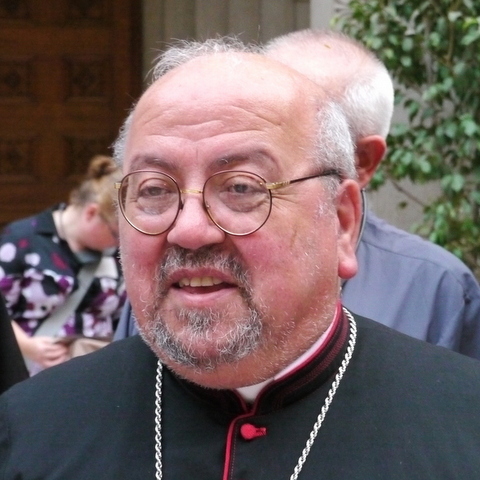
Syria. Are we to be the guardians of stones?
 It’s been six years since the beginning of the war in your country. What do you think have been the worst effects on society? Six years of war have shaken the very bulwark of Syrian society: the family, the basic cell that has absorbed the blows and the disgrace of this unending violence. The family was the safeguard of the country and of the Church up until 2014. But the insecurity, intolerance, violence and chaotic destruction have now completely uprooted more than two million families. Without houses and scattered all over the world, how could they have gone on under the weight of such a heavy Calvary? It was common at the beginning of the war – March 15, 2011 – to see the family gathered around a mother. The men go to war and often die. The saying now is: ‘An orphan without a father is not an orphan’. The family is left gathered around its mother who ensures the unity and the survival of the hearth. In the midst of this long and burdensome suffering these heroic mothers live in poverty and in tears. They have honoured their calling, living in tents and dying drowned. Is there any greater suffering? The destruction of the basic cell of society, and the youth? Can we count on them to look towards the future? The general mobilization that was decreed in October 2015 invited all men under the age of 45 to enter military service. It was a decision that also distressed other family members who couldn’t leave and had to stay where they were, waiting for a conclusion to this endless war. This age group that vanished had once comprised the backbone of economic activity that was still being carried out. Some reached the barracks and others chose to flee on the trail of illegal immigrants that is often irreversible. This destabilized the job market and the modest family life that found itself even more deprived of resources. What future is there for a community without young people? How has the war affected the Church? These things have weakened the Church. Families often decide to get up and go to their son who has left the country. Hence, you have the exodus of families resulting in the dizzying drop in the number of the faithful in parishes. There is the demographic imbalance: in the absence of young men, our young women who find themselves alone often marry Muslim polygamists. With fewer marriages, there are fewer baptisms. For the first time the Church finds itself facing another crucial problem as well: one in three priests in Damascus have decided to move to another more peaceful country. What can be done to keep priests in Damascus? What will come of the Church without priests? What do you think is the challenge and the hope of the Christians living in Syria today? The dead cities in the north of Syria are an unsettling photograph of what we could become. How are we to avoid becoming the guardians of brick and stone? It remains to the Christians of the East to reconsider their calling and to live along the lines of the small primitive Church that lived without protection or guarantee. Will we be capable of responding to this apostolic challenge? The Gospel encourages: ‘Fear not, little flock” (Lk 12:32).
It’s been six years since the beginning of the war in your country. What do you think have been the worst effects on society? Six years of war have shaken the very bulwark of Syrian society: the family, the basic cell that has absorbed the blows and the disgrace of this unending violence. The family was the safeguard of the country and of the Church up until 2014. But the insecurity, intolerance, violence and chaotic destruction have now completely uprooted more than two million families. Without houses and scattered all over the world, how could they have gone on under the weight of such a heavy Calvary? It was common at the beginning of the war – March 15, 2011 – to see the family gathered around a mother. The men go to war and often die. The saying now is: ‘An orphan without a father is not an orphan’. The family is left gathered around its mother who ensures the unity and the survival of the hearth. In the midst of this long and burdensome suffering these heroic mothers live in poverty and in tears. They have honoured their calling, living in tents and dying drowned. Is there any greater suffering? The destruction of the basic cell of society, and the youth? Can we count on them to look towards the future? The general mobilization that was decreed in October 2015 invited all men under the age of 45 to enter military service. It was a decision that also distressed other family members who couldn’t leave and had to stay where they were, waiting for a conclusion to this endless war. This age group that vanished had once comprised the backbone of economic activity that was still being carried out. Some reached the barracks and others chose to flee on the trail of illegal immigrants that is often irreversible. This destabilized the job market and the modest family life that found itself even more deprived of resources. What future is there for a community without young people? How has the war affected the Church? These things have weakened the Church. Families often decide to get up and go to their son who has left the country. Hence, you have the exodus of families resulting in the dizzying drop in the number of the faithful in parishes. There is the demographic imbalance: in the absence of young men, our young women who find themselves alone often marry Muslim polygamists. With fewer marriages, there are fewer baptisms. For the first time the Church finds itself facing another crucial problem as well: one in three priests in Damascus have decided to move to another more peaceful country. What can be done to keep priests in Damascus? What will come of the Church without priests? What do you think is the challenge and the hope of the Christians living in Syria today? The dead cities in the north of Syria are an unsettling photograph of what we could become. How are we to avoid becoming the guardians of brick and stone? It remains to the Christians of the East to reconsider their calling and to live along the lines of the small primitive Church that lived without protection or guarantee. Will we be capable of responding to this apostolic challenge? The Gospel encourages: ‘Fear not, little flock” (Lk 12:32).
Getting involved in peace
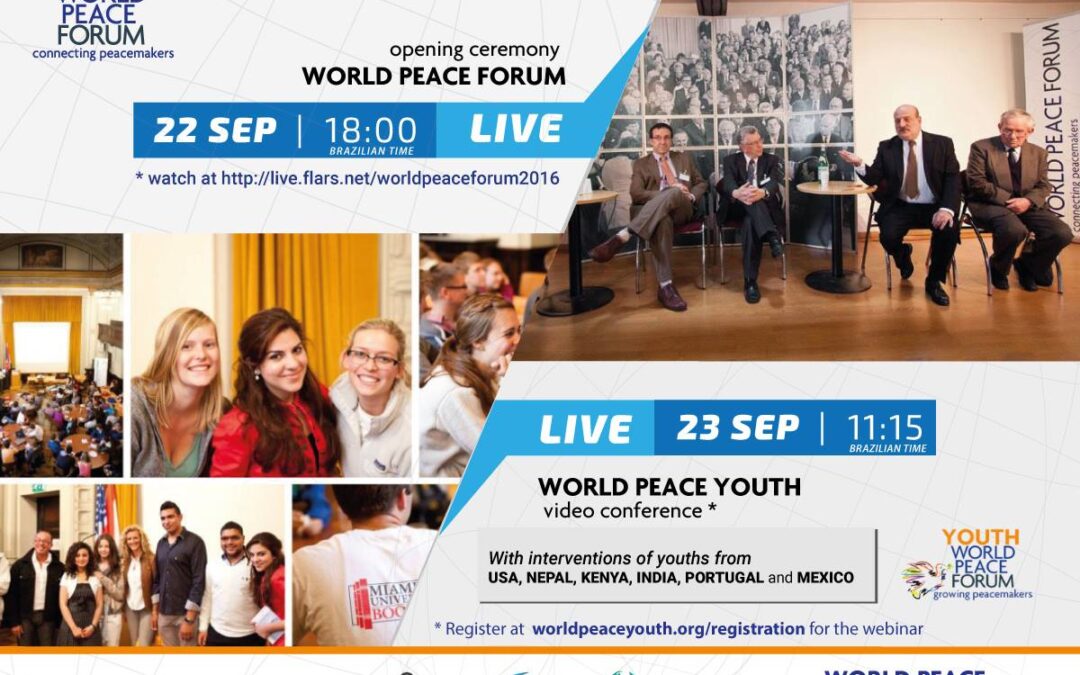
Brazil: World Peace Forum 2016
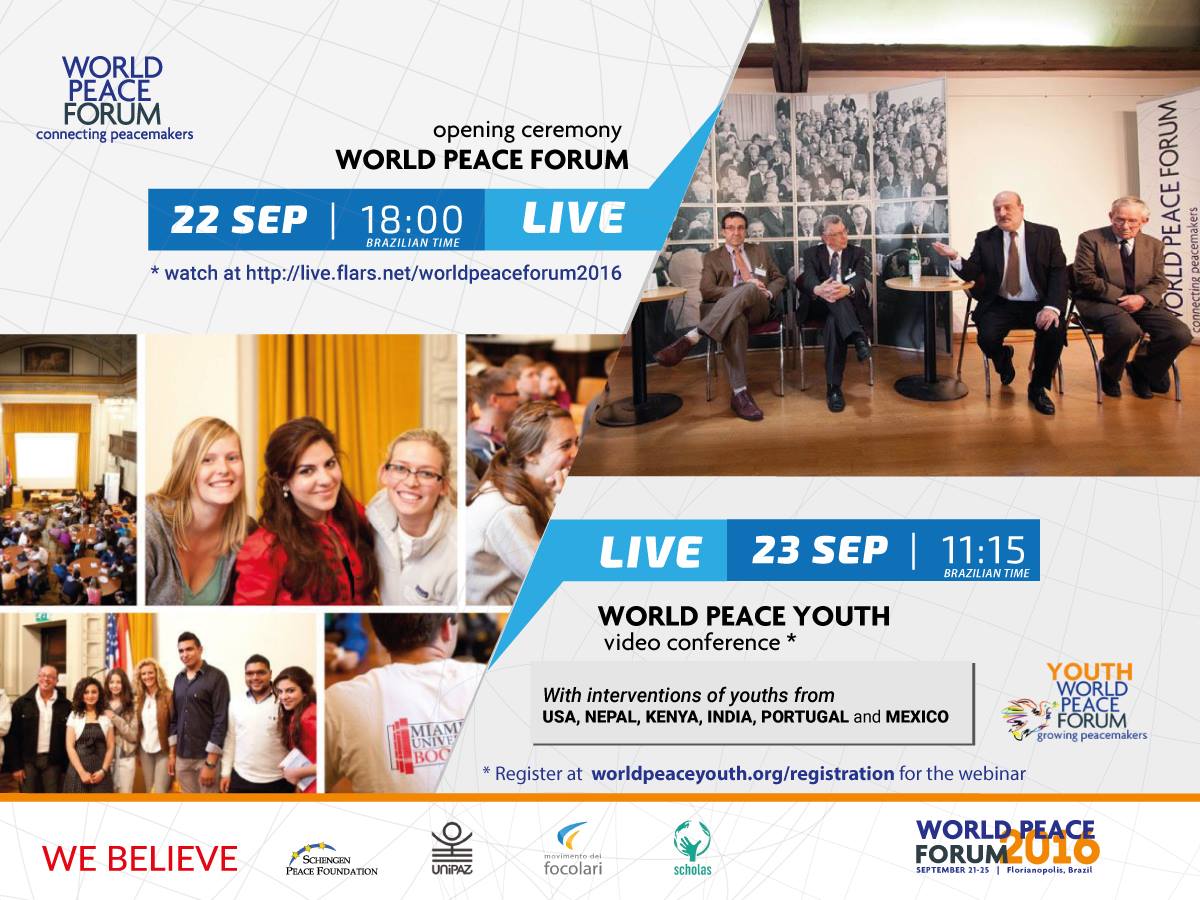 “The World Forum for Peace” will be held in Brazil, in the city of Florianópolis, during 22-25 September.
“The World Forum for Peace” will be held in Brazil, in the city of Florianópolis, during 22-25 September.
The opening ceremony of the 10th World Peace Forum and 2nd Youth World Peace Forum will be transmitted life via streaming on Thursday, 22 September, from 6 pm – 8.30pm (Brazil time)
Live transmission: http://live.flars.net/worldpeaceforum2016 On Friday, 23 September, at 11.15 am (Brazil time), there will be a Youth Video Conference. To register for the live webinar: worldpeaceyouth.org/registration Official Website for World Peace Forum 2016
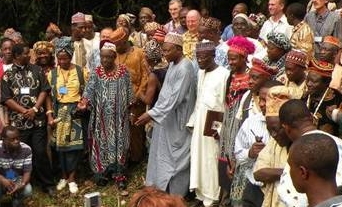
On a pilgrimage to Rome from Cameroon as a sign of mercy and gratitude
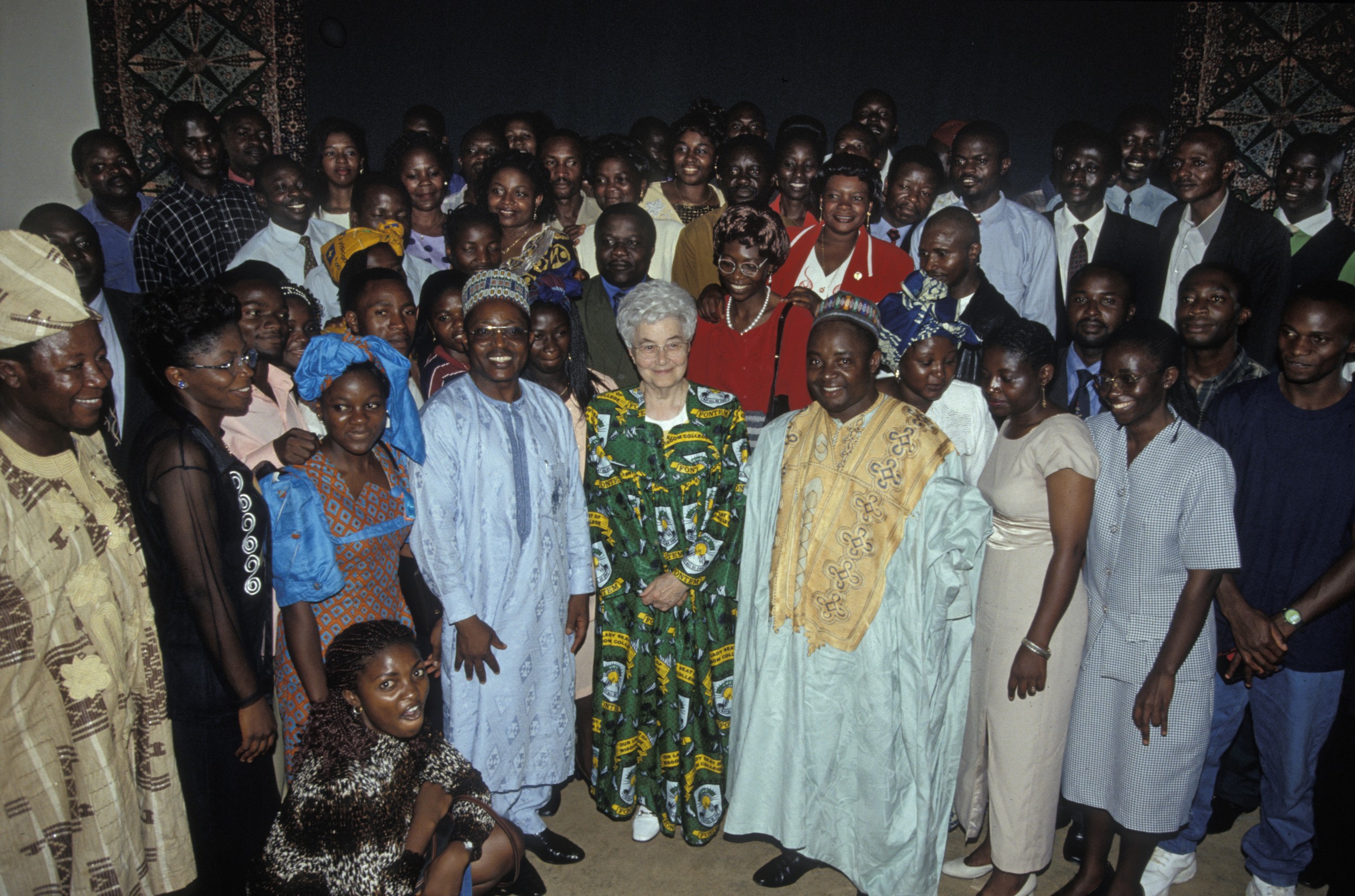 A delegation of 40 people from Cameroon are on their way to Rome. Among them are 9 traditional leaders (Fon), the native Kings of the Bangwa people of Lebialem, South-West Cameroon (Fon-Fontem, Fon-Nwametaw, Fon-Nwangong, Fon- Esoh Attah, Fon-Akum, Fon-Lewoh, Fon-Nkar, Fon-Bamenda and Fon-Douala),who are accompanied by Mafuas (Queens), two Mayors and other distinguished persons. They travel to Italy to celebrate the Jubilee of Mercy with Pope Francis and to thank God for the 50 years that has passed since the Bangwa people and the Focolare Movement met for the first time in Fontem. Their “pilgrimage” starts at the Vatican. They look foward to meet Pope Francis during the General Audience on Wednesday, September 21, when the Fon-Kings will greet the Pope on behalf of the delegation and their peoples, offer gifts typical of their culture and thank him for all that the Church has done for them. During their stay in Italy, they will be guests of the Focolare Movement and they will visit places where Chiara Lubich was born, lived and is buried: Trent, Loppiano (Florence) and Rocca di Papa (Rome). In fact, it was Chiara and the Focolare Movement, who answered the plea of Bangwa people, that came through Msgr Peters, bishop of Buea in the early 60’s, when the endemic sleeping sickness and other tropical diseases provoked a 90% rate of infantile mortality, threatening the extinction of the whole population. Today, these diseases have almost disappeared and the hospital, with its outpatient clinics, laboratory, operating theatre, male and female internal medicine department, surgery, maternity and pediatrics departments and the new department for infectious diseases, excels in the healthcare for the whole region. In the early70’s, a power plant, a carpentry shop, a nursery school and college were also built. The college,which takes more than 500 students, is one of the most popular pre-university insitutions in Cameroon.
A delegation of 40 people from Cameroon are on their way to Rome. Among them are 9 traditional leaders (Fon), the native Kings of the Bangwa people of Lebialem, South-West Cameroon (Fon-Fontem, Fon-Nwametaw, Fon-Nwangong, Fon- Esoh Attah, Fon-Akum, Fon-Lewoh, Fon-Nkar, Fon-Bamenda and Fon-Douala),who are accompanied by Mafuas (Queens), two Mayors and other distinguished persons. They travel to Italy to celebrate the Jubilee of Mercy with Pope Francis and to thank God for the 50 years that has passed since the Bangwa people and the Focolare Movement met for the first time in Fontem. Their “pilgrimage” starts at the Vatican. They look foward to meet Pope Francis during the General Audience on Wednesday, September 21, when the Fon-Kings will greet the Pope on behalf of the delegation and their peoples, offer gifts typical of their culture and thank him for all that the Church has done for them. During their stay in Italy, they will be guests of the Focolare Movement and they will visit places where Chiara Lubich was born, lived and is buried: Trent, Loppiano (Florence) and Rocca di Papa (Rome). In fact, it was Chiara and the Focolare Movement, who answered the plea of Bangwa people, that came through Msgr Peters, bishop of Buea in the early 60’s, when the endemic sleeping sickness and other tropical diseases provoked a 90% rate of infantile mortality, threatening the extinction of the whole population. Today, these diseases have almost disappeared and the hospital, with its outpatient clinics, laboratory, operating theatre, male and female internal medicine department, surgery, maternity and pediatrics departments and the new department for infectious diseases, excels in the healthcare for the whole region. In the early70’s, a power plant, a carpentry shop, a nursery school and college were also built. The college,which takes more than 500 students, is one of the most popular pre-university insitutions in Cameroon.  These 50 years built on facts and involving the whole region of Lebialem, led tens of thousands of people to accept the Christian message, in their personal life and in the life of society. They were supported by the work of the Mill Hill missionaries, the White Fathers and religious men and women of other congregations, who contributed towards the setting up of parishes, of the recent diocese of Manfi, of other schools and of public and administrative State structures. The baggage of the delegation led by the nine Fons contains this story of their people, a story which makes them feel the need to thank God and “Mafua Ndem Chiara Lubich” (queen sent by God), as the Bangwa people call her.
These 50 years built on facts and involving the whole region of Lebialem, led tens of thousands of people to accept the Christian message, in their personal life and in the life of society. They were supported by the work of the Mill Hill missionaries, the White Fathers and religious men and women of other congregations, who contributed towards the setting up of parishes, of the recent diocese of Manfi, of other schools and of public and administrative State structures. The baggage of the delegation led by the nine Fons contains this story of their people, a story which makes them feel the need to thank God and “Mafua Ndem Chiara Lubich” (queen sent by God), as the Bangwa people call her.
See also: http://focolare-fontem.org/
Video: General Hospital, Fontem
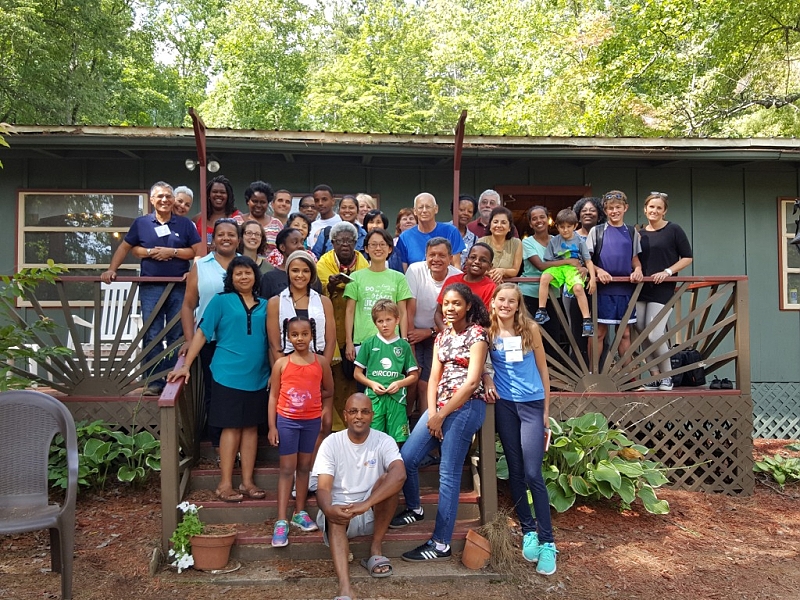
Atlanta (USA): We have a dream

Members of the Focolare community in Atlanta
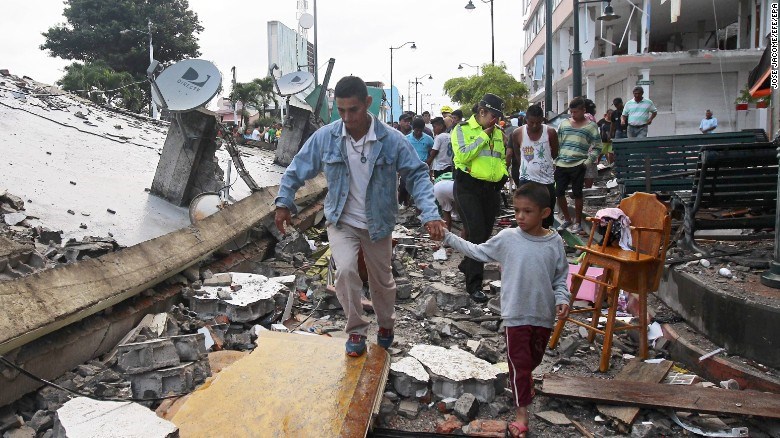
Emergency aid in response to Ecuador earthquake
 As the news media reported, a magnitude 7.8 earthquake hit Ecuador on April 16, especially the provinces of Manabi, Esmeraldas, Santo Domingo and Pichincha, leaving nearly 30 people without a roof.
As the news media reported, a magnitude 7.8 earthquake hit Ecuador on April 16, especially the provinces of Manabi, Esmeraldas, Santo Domingo and Pichincha, leaving nearly 30 people without a roof.
The Focolare Movement immediately got to work in many ways: beginning from the early relief efforts with the many spontaneous volunteers, and morning on to a large-scale fundraiser coordinated by AMU and AFN. Meanwhile a local commission was set up to identify the main priorities for the relief effort and to coordinate over a long term. They write from the commission: “In the past months several of us have gone to visit the different sites of the earthquake, meeting with the communities and seeking to collaborate with agencies that had similar goals. By the end of August the first proposals were ready and we began to collaborate with the Ecuadoran Popolorum Progressio Fund (FEPP) and the Fundación Amiga.” 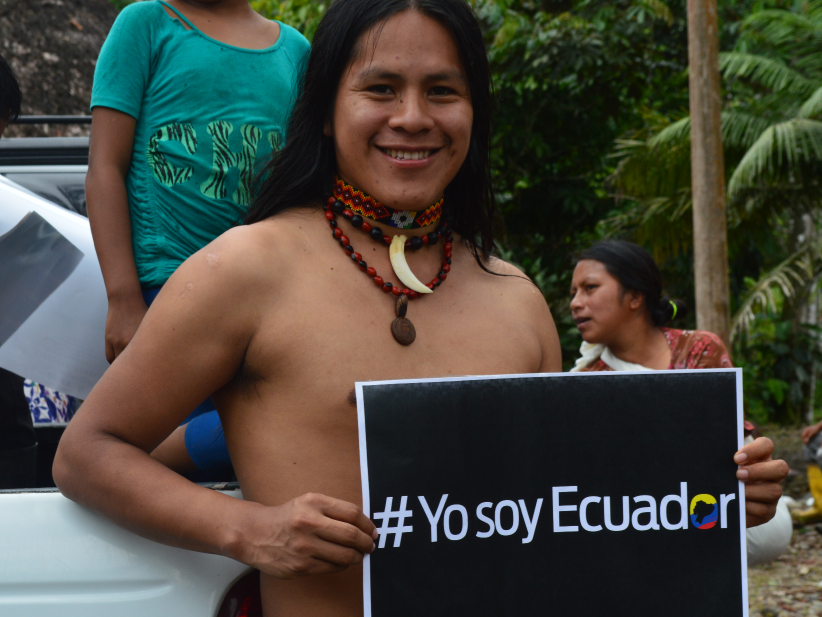 At this stage, the post-emergency interventions that were deemed most serious regarded the production of goods that could be sold and provide economic support for the local populations, and psychological support in overcoming the trauma which – as they write – “is still very quite strong after 5 months.” They also underscored another important point: “We saw the need to offer training in the procedure for applying for assistance from the Ecuador Government for the reconstruction of housing. At first, relief efforts concentrated on three localities, all located in the Province of Esmeraldas: Salima, “10 de Agosto” and Macara, “where projects will carried out to alleviate the consequences of trauma and to reinforce the organizational skills of the community,” they explain. “Moreover, a cooperative bread bakery and a training course in making fishing nets, involving the elderly fishermen as trainers. In the locality known as “10 de Agosto”, handicraft workshops will be held and a group of mothers will be helped in setting up a nursery.” The local commission writes: “this represents the first stage of the project, which corresponds to current funds. As we work with the community, we’ll delve more deeply into the future needs of the people and be able to respond to them. As of today: € 35.502 have been donated by AMU for the Ecuador emergency, € 10.000 of which have already been paid out, whereas the sum of € 10.000 has been donated to the cause by AFN (Action for New Families). Read earlier news: – Ecuador Emergency – Two months after the Ecuador earthquake
At this stage, the post-emergency interventions that were deemed most serious regarded the production of goods that could be sold and provide economic support for the local populations, and psychological support in overcoming the trauma which – as they write – “is still very quite strong after 5 months.” They also underscored another important point: “We saw the need to offer training in the procedure for applying for assistance from the Ecuador Government for the reconstruction of housing. At first, relief efforts concentrated on three localities, all located in the Province of Esmeraldas: Salima, “10 de Agosto” and Macara, “where projects will carried out to alleviate the consequences of trauma and to reinforce the organizational skills of the community,” they explain. “Moreover, a cooperative bread bakery and a training course in making fishing nets, involving the elderly fishermen as trainers. In the locality known as “10 de Agosto”, handicraft workshops will be held and a group of mothers will be helped in setting up a nursery.” The local commission writes: “this represents the first stage of the project, which corresponds to current funds. As we work with the community, we’ll delve more deeply into the future needs of the people and be able to respond to them. As of today: € 35.502 have been donated by AMU for the Ecuador emergency, € 10.000 of which have already been paid out, whereas the sum of € 10.000 has been donated to the cause by AFN (Action for New Families). Read earlier news: – Ecuador Emergency – Two months after the Ecuador earthquake
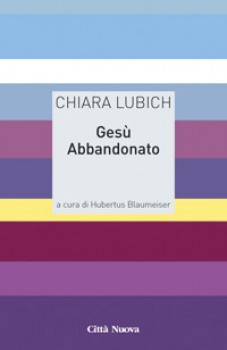
The God of Today
 “I’d like to console Him, to run through the world, gathering hearts for Him.” This was Chiara Lubich’s first impulse on January 24, 1944 when she became aware of Jesus’s abysmal cry from the cross: “My God, my God, why have you abandoned me?” If that was the moment when he suffered most,” she reasoned, “then it was the moment when he loved us most. Let’s make Him the ideal of our life!” And to think that back then theology did not take into consideration the abandonment experienced by Jesus! Catholic piety focused its attention on the physical suffering, the agony in the Garden of Gethsemane. But World War II and the Holocaust in particular dug a hole in the human conscience that only Jesus’s experience of extreme abandonment could fill. While still young Chiara chose to love the abandoned Jesus in the innumerable faces of personal and collective human suffering, so that the Abandoned One would not be alone in His abandonment. Very soon, however, she experienced something quite unexpected: “You throw yourself into a sea of pain and find yourself swimming in a sea of love.” The agony subsides into joy and transforms relationships, creating communion: “They are two sides of the same medal. To all the souls I show the face of Unity. For me and the souls that are on the front lines of Unity: the abandoned Jesus is all for us.” The years 1949-1951 were a well-spring of new intuitions. The wound of the abandonment as the expression of maximum Love becomes for Chiara the keystone of her vision of human history, of life itself and of God. She contemplates His abandonment as “the pupil of God’s Eye [through which he looks] on the world: an Infinite Emptiness through which God looks at us: God’s window thrown open onto the world, and the window through which humanity sees God.” Years of trial followed as the Church carried out its close examination of the new charism, a time of suspension that Chiara experienced in the light of the Son who was abandoned by the Father, convinced that through it all the Church was being a Mother. Stage by stage, the book traces the trajectory of Chiara’s spiritual adventure, through her letters, notes, diaries and talks that are compiled in six chapters. Its 160 pages, including an introduction by theologian Hubertus Blausmeiser, could accompany and illuminate our daily life. – and includes an introduction by theologian Hubertus Blaumeiser. With the Church’s official approval of the Focolare in early 1960, a new perspective is opened: Abandoned Jesus becomes the motivating drive behind the thrust to move out and face the social challenges, in every form of suffering. He is the “Teacher of dialogue” in the ecumenical and interreligious environment. He presents Himself as the God of today, who is even able to talk to non-believers and be a source of cultural change. The author takes up the “Holy Journey” with Him, a communitarian journey to holiness that has included hundreds and thousands of people from around the world: “He is the supreme Master of the spiritual life, of detachment from self, detachment from everything, from what is of God, but not God.” “Loving abandoned Jesus,’ she writes, “we find the reason and the strength to not escape from these evils, these divisions, but to accept them and consume them and bring to them our own personal and collective remedy.” And she states with certitude: “If we manage to encounter Him in every suffering, if we love Him, if we turn to the Father like Jesus on the cross: “Father, into your hands I commend my spirit” (Lk. 23:46), then with Him the night will be a thing of the past, and light will illuminate us.”
“I’d like to console Him, to run through the world, gathering hearts for Him.” This was Chiara Lubich’s first impulse on January 24, 1944 when she became aware of Jesus’s abysmal cry from the cross: “My God, my God, why have you abandoned me?” If that was the moment when he suffered most,” she reasoned, “then it was the moment when he loved us most. Let’s make Him the ideal of our life!” And to think that back then theology did not take into consideration the abandonment experienced by Jesus! Catholic piety focused its attention on the physical suffering, the agony in the Garden of Gethsemane. But World War II and the Holocaust in particular dug a hole in the human conscience that only Jesus’s experience of extreme abandonment could fill. While still young Chiara chose to love the abandoned Jesus in the innumerable faces of personal and collective human suffering, so that the Abandoned One would not be alone in His abandonment. Very soon, however, she experienced something quite unexpected: “You throw yourself into a sea of pain and find yourself swimming in a sea of love.” The agony subsides into joy and transforms relationships, creating communion: “They are two sides of the same medal. To all the souls I show the face of Unity. For me and the souls that are on the front lines of Unity: the abandoned Jesus is all for us.” The years 1949-1951 were a well-spring of new intuitions. The wound of the abandonment as the expression of maximum Love becomes for Chiara the keystone of her vision of human history, of life itself and of God. She contemplates His abandonment as “the pupil of God’s Eye [through which he looks] on the world: an Infinite Emptiness through which God looks at us: God’s window thrown open onto the world, and the window through which humanity sees God.” Years of trial followed as the Church carried out its close examination of the new charism, a time of suspension that Chiara experienced in the light of the Son who was abandoned by the Father, convinced that through it all the Church was being a Mother. Stage by stage, the book traces the trajectory of Chiara’s spiritual adventure, through her letters, notes, diaries and talks that are compiled in six chapters. Its 160 pages, including an introduction by theologian Hubertus Blausmeiser, could accompany and illuminate our daily life. – and includes an introduction by theologian Hubertus Blaumeiser. With the Church’s official approval of the Focolare in early 1960, a new perspective is opened: Abandoned Jesus becomes the motivating drive behind the thrust to move out and face the social challenges, in every form of suffering. He is the “Teacher of dialogue” in the ecumenical and interreligious environment. He presents Himself as the God of today, who is even able to talk to non-believers and be a source of cultural change. The author takes up the “Holy Journey” with Him, a communitarian journey to holiness that has included hundreds and thousands of people from around the world: “He is the supreme Master of the spiritual life, of detachment from self, detachment from everything, from what is of God, but not God.” “Loving abandoned Jesus,’ she writes, “we find the reason and the strength to not escape from these evils, these divisions, but to accept them and consume them and bring to them our own personal and collective remedy.” And she states with certitude: “If we manage to encounter Him in every suffering, if we love Him, if we turn to the Father like Jesus on the cross: “Father, into your hands I commend my spirit” (Lk. 23:46), then with Him the night will be a thing of the past, and light will illuminate us.”
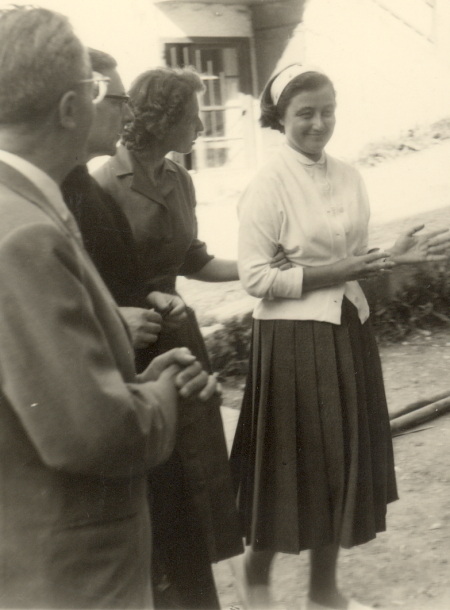
Igino Giordani: The encounter that made him a new person
 The following is recorded in the personal diary of Igino Giordani: “17 September 1948. This morning at Montecitorio I was called upon by angels: a Capuchin, a Friar Minor, a Conventual, a Third Order man and a Third Order woman, Silvia Lubig (sic!), who is beginning a community in Trent. She spoke like a saint inspired by the Holy Spirit.” Recounting the event: “One day I was urged to listen to an apostle – as they said – of unity. It was in September 1948. I exhibited the usual courtesy of any deputy towards possible electors when some Religious came to Montecitorio, representatives of different branches of the Franciscan family, a young lay woman and a young layman. To see a Conventual, a Friar Minor, a Capuchin, and a woman and man from the Third Order of Saint Francis all united together already looked like a miracle of unity to me: and I said so. The young lady spoke: I was sure I’d hear a sentimental propagandist tell me about some utopian welfare. Instead, right from the first words I felt something new. A half hour later when she had finished talking, I was taken by the enchanting atmosphere: I would have liked that voice to continue on. Without realizing it, it was the voice that I had been waiting for. She placed holiness within everyone’s reach; she took away the grates that separated the lay world from the mystical life. She made public the treasures of a castle that only a few were admitted to. She brought God near: she made him feel like a Father, brother, friend, present to humankind. I wanted to look into it: and getting familiar with the life of the Focolare of unity – as they called it – I recognized in their experience the realization of the desire that overwhelmed Saint John Chrysostom: that the laity would live as monks, minus celibacy. I had much cultivated that desire. What happened was that the idea of God had yielded its place to God’s love, the ideal image of the living God. In Chiara I had found someone who didn’t talk about God, but someone who spoke with God: a daughter speaking in loving conversation with the Father. If I did a critical examination of it, I found that I hadn’t discovered anything new. In the way of life that was opening to my soul, I found all the same names, characters and doctrines that I had loved. All my study, my ideals, the very events of my life all seemed directed to this goal. Nothing new: yet everything was new: the elements of my cultural and spiritual formation began to come together in accordance with God’s plan. They took their rightful place. All was old and all was new. The key that unlocked the mystery had been discovered: love was allowed to pass, which had too often been barricaded: and it burst forth spreading like fire and becoming a blaze. A collective, socialized holiness – to use terms that were later popularized by the Second Vatican Council – drawn out of the individualism that had accustomed everyone to become holy on one’s own, meticulously caring for one’s own soul, with endless analyses in order not to lose that soul. A piety, an interior life that came from Religious houses, from a certain exclusiveness of the privileged classes was now poured out into the public, into offices and factories, into houses and fields – and into convents – because wherever you find people, you find candidates for the perfection of holiness. And to live this new life, to be born in God, I didn’t have to renounce my doctrines: I only had to place them in the fire of love so that they would come alive. Through my neighbour I began to live God. Life became a total adventure, consciously lived in union with the Creator, which is what life is. Mary was resplendent with a new beauty; the saints entered among the relatives; Heaven became a common home. This was the discovery, this the experience. This made me a new man.”
The following is recorded in the personal diary of Igino Giordani: “17 September 1948. This morning at Montecitorio I was called upon by angels: a Capuchin, a Friar Minor, a Conventual, a Third Order man and a Third Order woman, Silvia Lubig (sic!), who is beginning a community in Trent. She spoke like a saint inspired by the Holy Spirit.” Recounting the event: “One day I was urged to listen to an apostle – as they said – of unity. It was in September 1948. I exhibited the usual courtesy of any deputy towards possible electors when some Religious came to Montecitorio, representatives of different branches of the Franciscan family, a young lay woman and a young layman. To see a Conventual, a Friar Minor, a Capuchin, and a woman and man from the Third Order of Saint Francis all united together already looked like a miracle of unity to me: and I said so. The young lady spoke: I was sure I’d hear a sentimental propagandist tell me about some utopian welfare. Instead, right from the first words I felt something new. A half hour later when she had finished talking, I was taken by the enchanting atmosphere: I would have liked that voice to continue on. Without realizing it, it was the voice that I had been waiting for. She placed holiness within everyone’s reach; she took away the grates that separated the lay world from the mystical life. She made public the treasures of a castle that only a few were admitted to. She brought God near: she made him feel like a Father, brother, friend, present to humankind. I wanted to look into it: and getting familiar with the life of the Focolare of unity – as they called it – I recognized in their experience the realization of the desire that overwhelmed Saint John Chrysostom: that the laity would live as monks, minus celibacy. I had much cultivated that desire. What happened was that the idea of God had yielded its place to God’s love, the ideal image of the living God. In Chiara I had found someone who didn’t talk about God, but someone who spoke with God: a daughter speaking in loving conversation with the Father. If I did a critical examination of it, I found that I hadn’t discovered anything new. In the way of life that was opening to my soul, I found all the same names, characters and doctrines that I had loved. All my study, my ideals, the very events of my life all seemed directed to this goal. Nothing new: yet everything was new: the elements of my cultural and spiritual formation began to come together in accordance with God’s plan. They took their rightful place. All was old and all was new. The key that unlocked the mystery had been discovered: love was allowed to pass, which had too often been barricaded: and it burst forth spreading like fire and becoming a blaze. A collective, socialized holiness – to use terms that were later popularized by the Second Vatican Council – drawn out of the individualism that had accustomed everyone to become holy on one’s own, meticulously caring for one’s own soul, with endless analyses in order not to lose that soul. A piety, an interior life that came from Religious houses, from a certain exclusiveness of the privileged classes was now poured out into the public, into offices and factories, into houses and fields – and into convents – because wherever you find people, you find candidates for the perfection of holiness. And to live this new life, to be born in God, I didn’t have to renounce my doctrines: I only had to place them in the fire of love so that they would come alive. Through my neighbour I began to live God. Life became a total adventure, consciously lived in union with the Creator, which is what life is. Mary was resplendent with a new beauty; the saints entered among the relatives; Heaven became a common home. This was the discovery, this the experience. This made me a new man.”
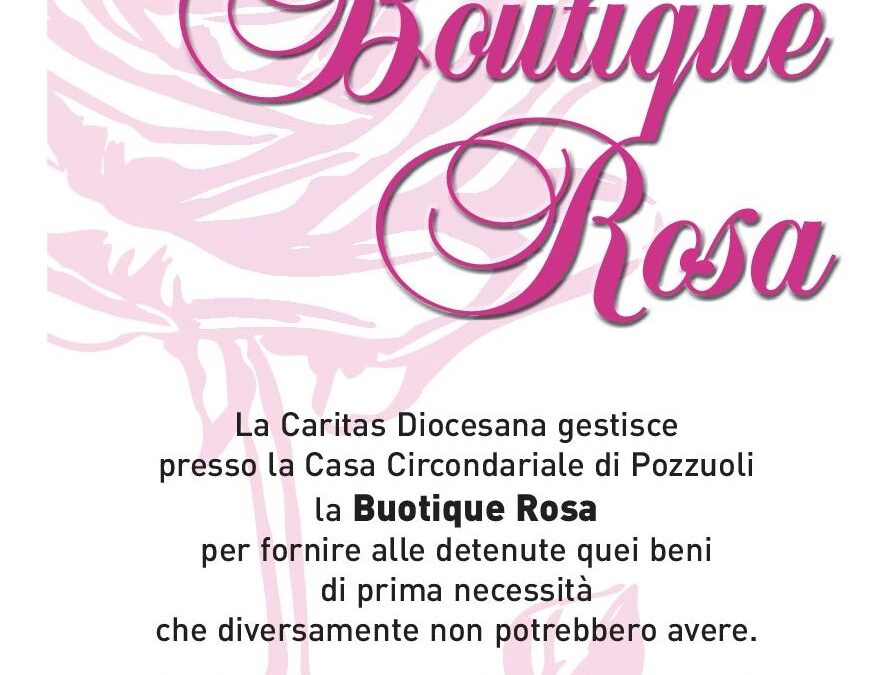
The “pink boutique” behind bars
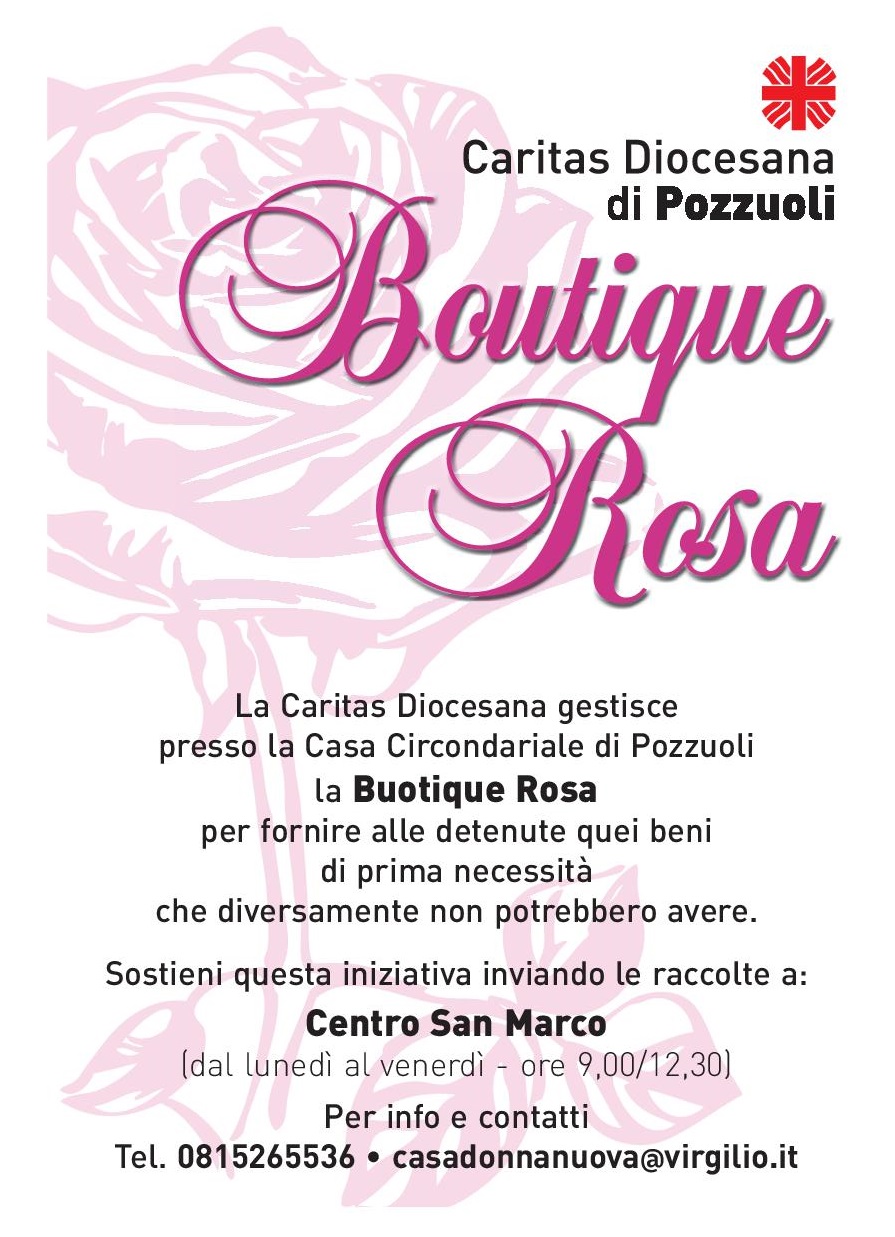 In 2011, Maria Clara who had just retired, transferred her services to the women’s jail of Pozzuoli (Naples-Italy), a huge jail, and one of the most overcrowded in Italy. Struck by the cries of pain that reached her ears from the barred windows, she discussed it with her friends of the local Focolare community and 25 of them (boys, girls, families…) decided to respond to the appeal. In collaboration with the diocesan Caritas and other Movements, the group thus immersed themselves into that suffering humanity behind bars. It was not an easy experience, but one that led to refine, in the name of mercy, every gesture and word, so as to be really that presence of love the world awaits. Each one became more aware that they did not go there to “absolve,” judge, or just to carry out social work, but only to give love, focusing on the reconstruction of the person. And probably because of this attitude, very soon they saw the positive aspects emerge in each person. “When I get out of here I want to be a new person,” one of them confided. And another said: “Now I know what it means to be a Christian, and I want to live by the Gospel, loving my cellmates, even if they make life impossible.” Still another said: “I understood that the real help comes from Jesus in the Eucharist and not from the “power–wielding people of the world.” This flow of light and grace was not earned with a magic wand. It was the fruit of continual attention to the needs of the inmates, helping them to rediscover their own dignity through living the Gospel. It consisted in going with them to Sunday Mass, enlivening it with songs, and placing oneself at their disposal to renovate the chapel. It meant asking and obtaining the permit from the jail administration to organise a series of workshops on health education, cooking, yoga, sewing courses, etc., in the Family Home “Donna Nuova” which hosts women under alternative detention regimes. One of the things the inmates needed – not expressed but which immediately came to the fore – was self-care. This inspired the establishment of the “Pink boutique,” a free facility within the jail, with pink walls, curtains and coloured shelves in contrast with the greyness of the cells. It is a point where the inmates, often abandoned or far from their own families, can weekly receive products for their personal hygiene, clothes, underwear, etc., and in short, all that serves to boost their own self-esteem. In the meantime, they could talk to one another or to the wardens and listen to each other’s difficulties, to comfort one another in their regret for not being able to care for their children at home, thus building really close relationships. It was also the occasion to share big and small joys, such as a reduced prison sentence, an unexpected visit, and the steps taken in starting again. All of them are from different ethnic groups and cultures, and belong to various Christian churches and religions. “I remember an Orthodox woman,” Maria Clara recounts, “who during the Unity of Christians Prayer Week, wanted to contribute with a prayer-song. Crying, she told me that she was offering the immense suffering of her prison term for the unity of the churches. We then went to Naples to meet her husband and five children, with some aid for them. We share this experience with some people belonging to Christian churches of various denominations, with which an ecumenical dialogue was opened in the diocese. This was exactly what they were waiting for! Now also four evangelical sisters have started working with us. Thanks to them, inmates of various churches have established really close relationships that at times, continue even when they leave the jail.”
In 2011, Maria Clara who had just retired, transferred her services to the women’s jail of Pozzuoli (Naples-Italy), a huge jail, and one of the most overcrowded in Italy. Struck by the cries of pain that reached her ears from the barred windows, she discussed it with her friends of the local Focolare community and 25 of them (boys, girls, families…) decided to respond to the appeal. In collaboration with the diocesan Caritas and other Movements, the group thus immersed themselves into that suffering humanity behind bars. It was not an easy experience, but one that led to refine, in the name of mercy, every gesture and word, so as to be really that presence of love the world awaits. Each one became more aware that they did not go there to “absolve,” judge, or just to carry out social work, but only to give love, focusing on the reconstruction of the person. And probably because of this attitude, very soon they saw the positive aspects emerge in each person. “When I get out of here I want to be a new person,” one of them confided. And another said: “Now I know what it means to be a Christian, and I want to live by the Gospel, loving my cellmates, even if they make life impossible.” Still another said: “I understood that the real help comes from Jesus in the Eucharist and not from the “power–wielding people of the world.” This flow of light and grace was not earned with a magic wand. It was the fruit of continual attention to the needs of the inmates, helping them to rediscover their own dignity through living the Gospel. It consisted in going with them to Sunday Mass, enlivening it with songs, and placing oneself at their disposal to renovate the chapel. It meant asking and obtaining the permit from the jail administration to organise a series of workshops on health education, cooking, yoga, sewing courses, etc., in the Family Home “Donna Nuova” which hosts women under alternative detention regimes. One of the things the inmates needed – not expressed but which immediately came to the fore – was self-care. This inspired the establishment of the “Pink boutique,” a free facility within the jail, with pink walls, curtains and coloured shelves in contrast with the greyness of the cells. It is a point where the inmates, often abandoned or far from their own families, can weekly receive products for their personal hygiene, clothes, underwear, etc., and in short, all that serves to boost their own self-esteem. In the meantime, they could talk to one another or to the wardens and listen to each other’s difficulties, to comfort one another in their regret for not being able to care for their children at home, thus building really close relationships. It was also the occasion to share big and small joys, such as a reduced prison sentence, an unexpected visit, and the steps taken in starting again. All of them are from different ethnic groups and cultures, and belong to various Christian churches and religions. “I remember an Orthodox woman,” Maria Clara recounts, “who during the Unity of Christians Prayer Week, wanted to contribute with a prayer-song. Crying, she told me that she was offering the immense suffering of her prison term for the unity of the churches. We then went to Naples to meet her husband and five children, with some aid for them. We share this experience with some people belonging to Christian churches of various denominations, with which an ecumenical dialogue was opened in the diocese. This was exactly what they were waiting for! Now also four evangelical sisters have started working with us. Thanks to them, inmates of various churches have established really close relationships that at times, continue even when they leave the jail.”
Gen Rosso releases new DVD for Year of Mercy
https://www.youtube.com/watch?v=8Asjy1-9mxI After We Are Coming To You (1972), Wherever You Are (1982), Se siamo uniti (1987) and – with Gen Verde – Come fuoco vivo (1998) and Messa della Concordia (2004), Gen Rosso releases a new DVD for the Year of Mercy: Voce del mio canto. We are led into the music by Lito Amuchastegui, from Argentina, who has been with Gen Rosso for 20 years. He composed most of the songs that led to the composition of a complete Mass. He was helped by Beni Enderle for the music, Valerio Lode Ciprì for the lyrics and Emanuele Chirco for the final mixing. Lito has loved music all his life and began singing in public at the age of five. With Gen Rosso he worked as a sound engineer. Voce del mio canto (Voice of my song) is his legacy to the group, as he returns to the place he was born in Córdoba, Argentina. “Writing a Mass is no joke,” he declares. “It requires awareness: you’re talking about who God is for you. In front of every piece I had to place myself in front of Him and ask: are You truly the voice of my song? Are You my only treasure? When there are crosses, are You my Simon of Cyrene? Il Cielo è con noi is one my favourite pieces. It was inspired by a writing of Chiara Lubich in which she says that Heaven has been poured on us, Heaven in all its infiniteness: “you were born among us/ you brought with you the fragrance of Heaven/ you died for us, you are pure love/ you are Divine love. It asks about God not on the theological or historical level, but on the personal level: Who is God for me? So, Voce del mio canto is most of all about an experience: prayer, the joy of experiencing that you are loved by God…. But where did the idea of a sung Mass come from? “The reason behind it was the desire to make music. I took guitar along on vacation and wrote Quelli che amono te (Those that love you) in one sitting. Then I put it to music and shared it with the people who were with me and they liked it. Then I kept going and ended up with eleven pieces, plus two more that we already had. Why a Mass? Perhaps it shows that God was saying to me: ‘I want to help you to give more glory to me.’ I set off from there. What is the story behind each of the songs? Lito revealed that he had put a bit of his own roots into each piece: “One song talks about Pane della Madre Terra (Bread of Mother Earth). We South Americans have strong feelings towards Mother Earth which stem from indigenous tradition. Moreover, I was in Uruguay where I got to know about the ‘candombe’ which has Afro-American features, and I wanted to leave a mark of the experience I had had with the Uruguayan musicians in the Santo. They are a people of singing and praising God, a people of the streets, with tambourines like King David who sang and danced in front of the Ark of the Covenant. Then there was Niña de Nazareth (Girl from Nazareth), a song I wrote before joining Gen Rosso but was never able to put it to music. I worked on it with Beni Henderle, and we came out with the song. Other pieces were a bit more difficult: for the Kyrie Eleison, for example, I had come with 7 different versions. I was trying to convey the experience that God loves us; His mercy is also born from being Love. The rest is relative; whereas, for me, this is like a splinter in my mind.” What suggestions could you give to those who want to play these songs? “I would suggest to them that these songs aren’t meant to be sung, but lived. I would wish to anyone who would like to use them – in a group, a parish, a choir – that they would be able to have this experience of God: to “enter” the songs. I would wish that they could be able to enter the songs with their souls, so that the correct interpretation of each piece would come out.” Song List:
- Verso di te (Towards You)
- Kyrie Eleison
- Gloria
- Loda il Signore anima mia (Praise the Lord, my soul)
- Alleluia
- Quelli che amano te (Those that love you)
- Santo, Candombe rhythm (Holy, holy, holy)
- Agnello di Dio (Lamb of God)
- Il cielo è con noi (Heaven is here with us)
- Voce del mio canto (Voice of my song)
- Come un fiume (Like a river)
- Ave Maria
- Niña de Nazareth.
Complete texts and musical scores are included with the CD Where to buy Voce del mio canto CD
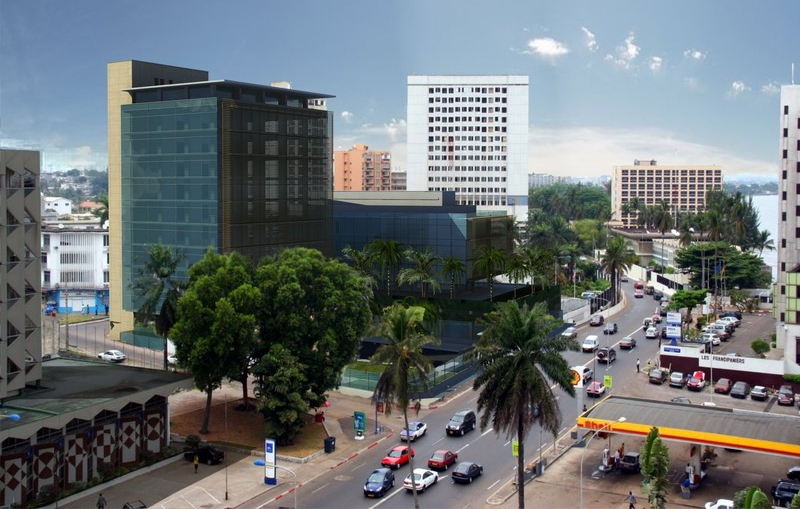
Gabon at an Impasse
 “When I was invited to visit the Focolare communities in Gabon, I searched for it on Google Earth to find out where on the African continent it was located. It’s actually a small country that is hardly ever talked about. Yet, perhaps few places on earth are so beautiful, rich in natural resources (oil, precious wood, extinct species that are still in existence, 800 km of coastland, the ocean of your dreams. . . .). That’s without saying anything about the people: more than 2 million citizens from 40 ethnic groups, Christians, Animists and Muslims, all living together in peace and – I have to stay it! – an extraordinary ability to welcome and include everyone, as I was able to experience for myself. Currently, Gabon is in a complicated political impasse, following the elections of August 27th and an announcement of victory for one of the presidential candidates. There has been a strong call for transparency both from within and outside the country, from the international community. There is also a strong call to reveal the final election results in each of the regions – as prescribed by the Gabonaise Constitution. The majority of the population are not convinced by the results that have actually been reported, and people have poured into squares in the capital city of Librevelle and in the industrial city Port-Gentil. The demonstrations were contained and repressed with an uncertain number of deaths and many arrests. Non-official means of communication and social networks have been blocked, making it difficult for me to receive news from my friends with whom I spent unforgettable days living the Gospel. It was they who managed to contact me, reporting that all are well and how they’re living through the situation. “Thanks for holding us in your heart!” they write from Libreville. “Unfortunately it’s true that the country is going through violence following the elections. Tensions are high and we’ve been told to stock up on water and basic necessities, and to stay inside our homes. Supermarkets have been ransacked. The communications media is in the hands of the government, and internet is available for only short periods of time between 8:00 and 14:00. Messaging, Facebook and Whatsapp are all blocked. There is a strong and visible military presence on the roads. Total confusion since the election results were announced in this free and democratic land. We’re still waiting for an announcement from the Constitutional Court, with the possibility of even more disorder. People are fearful for the near future of Gabon.” I also received news from Port-Gentil: “We’re well, thanks be to God. Internet access has been limited and complicated since August 31st. We hope it will be active again soon, since it’s such an important communication tool. Last week we were closed inside our houses, unable to go out because of the total chaos on the streets of Port-Gentil and many other places in the country. Moments like these remind of the importance of prayer.” Before saying goodbye to each other we had made a pact, committing ourselves to be peacebuilders, builders of unity and dialogue with everyone in our own work and family environment. Now is more than ever the moment to do it with the support of many other people around the world who live and work for a more united world.” Before saying goodbye to each other we had made a pact, committing ourselves to be peacebuilders, builders of unity and dialogue with everyone in our own work and family environment. Now is more than ever the moment to do it. We were further encouraged by what Pope Francis said yesterday, September 11th to those who were gathered with him in Saint Peter’s Square: “I entrust to the Lord the victims of the clashes and their families. I join the Bishops of that dear African country to invite the parties to reject all violence and to always aim for the common good. I encourage everyone, particularly Catholics, to be builders of peace within the law, in dialogue and fraternity.”
“When I was invited to visit the Focolare communities in Gabon, I searched for it on Google Earth to find out where on the African continent it was located. It’s actually a small country that is hardly ever talked about. Yet, perhaps few places on earth are so beautiful, rich in natural resources (oil, precious wood, extinct species that are still in existence, 800 km of coastland, the ocean of your dreams. . . .). That’s without saying anything about the people: more than 2 million citizens from 40 ethnic groups, Christians, Animists and Muslims, all living together in peace and – I have to stay it! – an extraordinary ability to welcome and include everyone, as I was able to experience for myself. Currently, Gabon is in a complicated political impasse, following the elections of August 27th and an announcement of victory for one of the presidential candidates. There has been a strong call for transparency both from within and outside the country, from the international community. There is also a strong call to reveal the final election results in each of the regions – as prescribed by the Gabonaise Constitution. The majority of the population are not convinced by the results that have actually been reported, and people have poured into squares in the capital city of Librevelle and in the industrial city Port-Gentil. The demonstrations were contained and repressed with an uncertain number of deaths and many arrests. Non-official means of communication and social networks have been blocked, making it difficult for me to receive news from my friends with whom I spent unforgettable days living the Gospel. It was they who managed to contact me, reporting that all are well and how they’re living through the situation. “Thanks for holding us in your heart!” they write from Libreville. “Unfortunately it’s true that the country is going through violence following the elections. Tensions are high and we’ve been told to stock up on water and basic necessities, and to stay inside our homes. Supermarkets have been ransacked. The communications media is in the hands of the government, and internet is available for only short periods of time between 8:00 and 14:00. Messaging, Facebook and Whatsapp are all blocked. There is a strong and visible military presence on the roads. Total confusion since the election results were announced in this free and democratic land. We’re still waiting for an announcement from the Constitutional Court, with the possibility of even more disorder. People are fearful for the near future of Gabon.” I also received news from Port-Gentil: “We’re well, thanks be to God. Internet access has been limited and complicated since August 31st. We hope it will be active again soon, since it’s such an important communication tool. Last week we were closed inside our houses, unable to go out because of the total chaos on the streets of Port-Gentil and many other places in the country. Moments like these remind of the importance of prayer.” Before saying goodbye to each other we had made a pact, committing ourselves to be peacebuilders, builders of unity and dialogue with everyone in our own work and family environment. Now is more than ever the moment to do it with the support of many other people around the world who live and work for a more united world.” Before saying goodbye to each other we had made a pact, committing ourselves to be peacebuilders, builders of unity and dialogue with everyone in our own work and family environment. Now is more than ever the moment to do it. We were further encouraged by what Pope Francis said yesterday, September 11th to those who were gathered with him in Saint Peter’s Square: “I entrust to the Lord the victims of the clashes and their families. I join the Bishops of that dear African country to invite the parties to reject all violence and to always aim for the common good. I encourage everyone, particularly Catholics, to be builders of peace within the law, in dialogue and fraternity.”
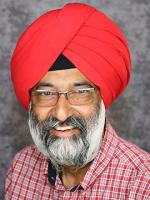
Luminosa Award for Unity

Dr Tarunjit Singh Butalia
Delegation of Fon from Fontem (Cameroon): Pilgrimage to Rome, Loppiano and Trent
Monday and Tuesday 19th and 20th of September 2016: different arrivals in Rome Wednesday 21st September 2016: Participation in an Audience with the Holy Father – Pope Francis in the Vatican – after the Audience, visit of the Tomb of Saint Peter the Apostles and the Popes – Visits of some selected holy sites of Rome Thursday 22nd September 2016: Touristic visit of Rome – Catacombs, Colosseum and Basilicas of Rome. Departure to Loppiano (Florence – first Focolare Citadel in the World created by Chiara Lubich) night at Loppiano. Friday 23rd of September 2016: Visit of Loppiano and meeting with the inhabitants of Loppiano Saturday 24th of September 2016: Departure from Loppiano to Trento – Chiara’s native town and citadel. A stop in Florence town – touristic visit. Night at Trento Sunday 25th of September 2016: Visit of Trent and inhabitants, Institutions, Municipality (Mayor) and Bishop of Trent. Monday 26th September 2016: departure from Trento to Rome – a touristic stop at Venice. Night in Rome – Castel Gandolfo . Focolare International Mariapolis Centre. Tuesday 27th September 2016: visit to the tomb of Mafua Ndem Chiara Lubich, at the Focolare Headquarters in Rocca di Papa. A meeting with the Centre of the Focolare Movement. Wednesday 28th September 2016: Departure and end of the Pilgrimage.

Living the Gospel: Everything belongs to us!
 The fruits of the Word “For years now, three of us have been asking the new parish priest to talk more about the Word of God. So he arranged for us to hold a meeting before Mass every Sunday. The more we strived to put the Word into practice, the more people kept asking to participate. In a few months, we formed a big group. There was a strong family relationship among the frequent participants, and in the parish the atmosphere started to change. Now we were no longer satisfied only with prayer and individual efforts to be good Christians, but were involved in a journey where each one tried to reach the goal of sanctity with the others. We strongly felt the presence of Jesus at our side and in our midst, and this started to show its effects: besides the joyful discovery of a new image of the Church, we began to feel the need to also share material things with the less fortunate, and support the disadvantaged families, disoriented youth, and people who needed to rediscover God’s love. And this was not only within the framework of the parish.” (Lucio – Italy) The forgotten Christmas bonus “I was at the market when I remembered that my parents didn’t have any money, so I did the shopping also for them. On my way home, I noticed a girl crying in the street: she was hungry and her family – she told me – had nothing to eat. After consulting my husband, Antonio, we decided to bring to that family half of our monthly groceries. The next day our neighbour’s daughter came to confide that her father had gone away to look for work and no longer returned. Also they, with many children, had nothing to eat. I said to myself: “Enough of all this, we have already done our part!” But when Antonio reminded me that we still had not given what was necessary, once again we divided the remainder of our supplies. By then there was no money left for the shopping, but every day we received some help from someone. At the end of the month my salary was double. It was not a mistake: I had forgotten about my Christmas bonus.” (B. P. – Brazil) Tradition with a new heart “As a tradition in our society, particularly in the villages, the men do not help in the housework, and the women go to work even when they are sick: they do not consider themselves as victims and neither do the men feel cruel. It was so also in my house. If my wife was doing some chore and was reading a book or watching TV, it never occurred to me to get up if our son was crying: it was her task. When with the help of my Christian friends, I realized that the others had the right to receive my love and help, I felt I had to start especially at home. One day, when my wife who was preparing breakfast had to tend to the baby, I set the table for her. When she returned, she was surprised but did not make any remarks. But when I ironed my own shirt to go to the office, it was simply too much for her…. So I told her about the beauty of being the first to love and doing to others what we want others to do to us. Now there is more harmony in the family.” (W.U. H. – Pakistan)
The fruits of the Word “For years now, three of us have been asking the new parish priest to talk more about the Word of God. So he arranged for us to hold a meeting before Mass every Sunday. The more we strived to put the Word into practice, the more people kept asking to participate. In a few months, we formed a big group. There was a strong family relationship among the frequent participants, and in the parish the atmosphere started to change. Now we were no longer satisfied only with prayer and individual efforts to be good Christians, but were involved in a journey where each one tried to reach the goal of sanctity with the others. We strongly felt the presence of Jesus at our side and in our midst, and this started to show its effects: besides the joyful discovery of a new image of the Church, we began to feel the need to also share material things with the less fortunate, and support the disadvantaged families, disoriented youth, and people who needed to rediscover God’s love. And this was not only within the framework of the parish.” (Lucio – Italy) The forgotten Christmas bonus “I was at the market when I remembered that my parents didn’t have any money, so I did the shopping also for them. On my way home, I noticed a girl crying in the street: she was hungry and her family – she told me – had nothing to eat. After consulting my husband, Antonio, we decided to bring to that family half of our monthly groceries. The next day our neighbour’s daughter came to confide that her father had gone away to look for work and no longer returned. Also they, with many children, had nothing to eat. I said to myself: “Enough of all this, we have already done our part!” But when Antonio reminded me that we still had not given what was necessary, once again we divided the remainder of our supplies. By then there was no money left for the shopping, but every day we received some help from someone. At the end of the month my salary was double. It was not a mistake: I had forgotten about my Christmas bonus.” (B. P. – Brazil) Tradition with a new heart “As a tradition in our society, particularly in the villages, the men do not help in the housework, and the women go to work even when they are sick: they do not consider themselves as victims and neither do the men feel cruel. It was so also in my house. If my wife was doing some chore and was reading a book or watching TV, it never occurred to me to get up if our son was crying: it was her task. When with the help of my Christian friends, I realized that the others had the right to receive my love and help, I felt I had to start especially at home. One day, when my wife who was preparing breakfast had to tend to the baby, I set the table for her. When she returned, she was surprised but did not make any remarks. But when I ironed my own shirt to go to the office, it was simply too much for her…. So I told her about the beauty of being the first to love and doing to others what we want others to do to us. Now there is more harmony in the family.” (W.U. H. – Pakistan)
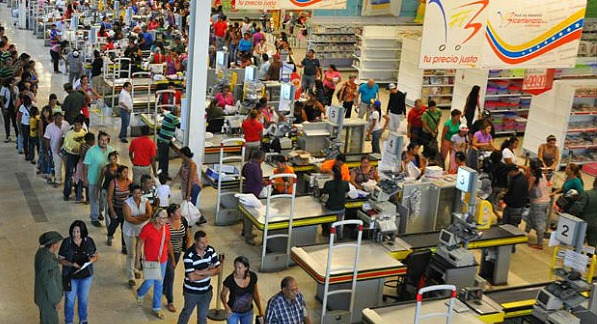
Venezuela: solidarity as a response to the crisis
 The news reaching us from Venezuela is not at all comforting. Furthermore, the Latin American Country is not only exhausted but also divided. In this framework, the Focolare community is making every effort to create reconcilement and solidarity, sharing all they have. The community of Colinas de Guacamaya (Valencia), after asking themselves in what way they could face this time of social, political and economic crisis that is reaching its peak, has responded by doubling their commitment to putting into practice the Gospel’s new commandment of mutual love, starting from the small daily gestures. One of them wrote: «Today, while I was buying 12 rolls of toilet paper at the supermarket, I thought of the many people here in Venezuela, who can find none on the shelves even if they had the money. I called a friend who was happy with the news and she asked me to get some for her. In turn she asked me if I needed anything, and so I told her that there was no more soap in the house. “Ah – she answered – I can give you some, and what’s more, you can take with you also some bananas which my son has just brought.” Once again I experienced concrete love, and when it circulates, that promise, “give and you shall be given,” which Jesus talked about, becomes a reality.» Those are simples acts, but also extreme ones, if we consider that for a stolen mango, people get to kill one another. Another woman recounted: «At the start of the day I met someone who was looking for cooking oil, and since I had some, I shared it with her; after a while I met another person who needed an injection, and so I administered it with great care. Much later a woman came knocking: her little girl had a bad case of flu and needed the nebulizer which luckily I had, and which I had already lent to many people. While passing by a friend’s house, I took the opportunity to ask if she needed anything: “Yes, some detergent for the laundry,” she said. I ran home to get mine and halved it with her. Since my husband works on the night shifts, in the evening some member of the community keeps me company. Having received an act of solidarity, I took the opportunity to prepare the dinner, knowing that there were those who did not have enough food. Upon examining my day before falling asleep, I feel a great joy: we have lived for one another, and together helped each other to live the Gospel. Tomorrow will give me another opportunity to see in every person that passes me by, the special presence of God.» The problems of the country are so great that these daily narrations may appear to be naive, or insignificant, like small drops in the ocean, and we all hope that solutions may come at the political, economic and social levels. Mother Theresa of Calcutta affirmed that “what we are doing is just a drop in the ocean, but if we fail to do this, the ocean would have a drop less.” It seems that this small community of Venezuela also has the same conviction.
The news reaching us from Venezuela is not at all comforting. Furthermore, the Latin American Country is not only exhausted but also divided. In this framework, the Focolare community is making every effort to create reconcilement and solidarity, sharing all they have. The community of Colinas de Guacamaya (Valencia), after asking themselves in what way they could face this time of social, political and economic crisis that is reaching its peak, has responded by doubling their commitment to putting into practice the Gospel’s new commandment of mutual love, starting from the small daily gestures. One of them wrote: «Today, while I was buying 12 rolls of toilet paper at the supermarket, I thought of the many people here in Venezuela, who can find none on the shelves even if they had the money. I called a friend who was happy with the news and she asked me to get some for her. In turn she asked me if I needed anything, and so I told her that there was no more soap in the house. “Ah – she answered – I can give you some, and what’s more, you can take with you also some bananas which my son has just brought.” Once again I experienced concrete love, and when it circulates, that promise, “give and you shall be given,” which Jesus talked about, becomes a reality.» Those are simples acts, but also extreme ones, if we consider that for a stolen mango, people get to kill one another. Another woman recounted: «At the start of the day I met someone who was looking for cooking oil, and since I had some, I shared it with her; after a while I met another person who needed an injection, and so I administered it with great care. Much later a woman came knocking: her little girl had a bad case of flu and needed the nebulizer which luckily I had, and which I had already lent to many people. While passing by a friend’s house, I took the opportunity to ask if she needed anything: “Yes, some detergent for the laundry,” she said. I ran home to get mine and halved it with her. Since my husband works on the night shifts, in the evening some member of the community keeps me company. Having received an act of solidarity, I took the opportunity to prepare the dinner, knowing that there were those who did not have enough food. Upon examining my day before falling asleep, I feel a great joy: we have lived for one another, and together helped each other to live the Gospel. Tomorrow will give me another opportunity to see in every person that passes me by, the special presence of God.» The problems of the country are so great that these daily narrations may appear to be naive, or insignificant, like small drops in the ocean, and we all hope that solutions may come at the political, economic and social levels. Mother Theresa of Calcutta affirmed that “what we are doing is just a drop in the ocean, but if we fail to do this, the ocean would have a drop less.” It seems that this small community of Venezuela also has the same conviction.
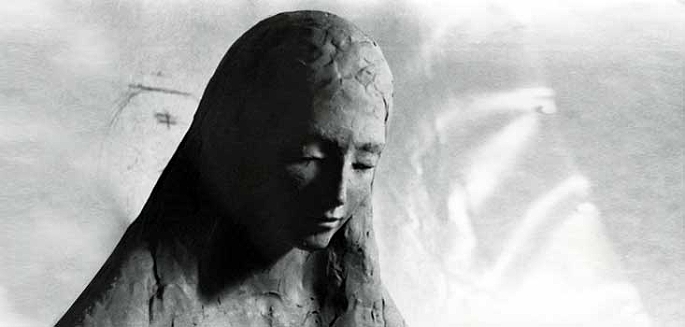
Foresi: “Mary of Nazareth”

Ave Cerquetti, ‘Bella Accoglienza’ – Rome, 1961
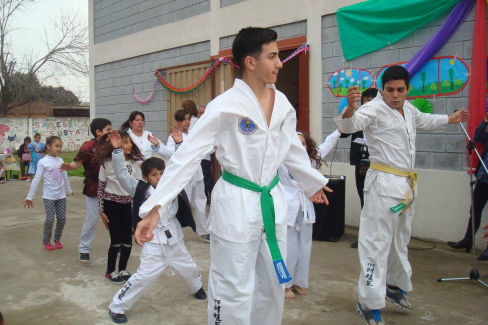
On the Periphery of Buenos Aires
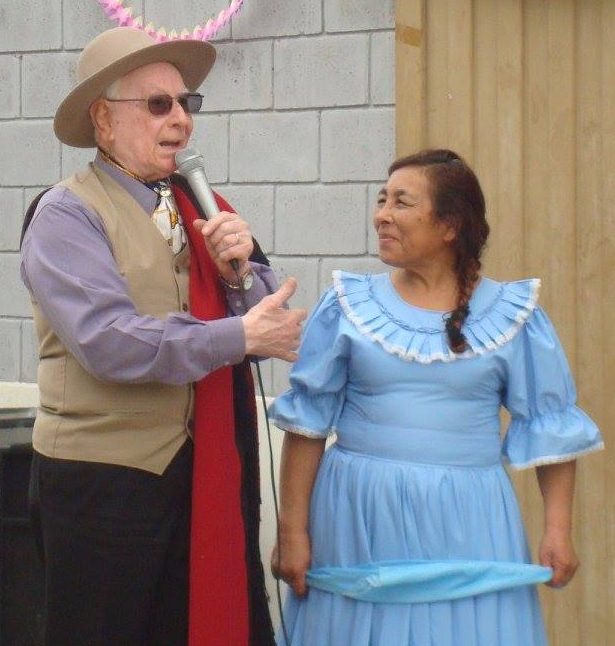 There was must festivity on August 14th at José C. Paz, fifty kilometres from Buenos Aires, Argentina. It was the 10th anniversary of a social centre that hosts the activities of the Juntos Por El Barrio Programme (Together for the Quarter), which is a social project that focuses especially on children, teenagers and their families. Even though the building is ten years old, the project began its work long before and, as is often the case, it was the people from the quarter that had initiated and carried it out. When Francis, the Pope from Argentina, invited everyone to take care of the peripheries, he was probably thinking about settlements like the barrio where the social centre is located. It is a residential settlement that was haphazardly put up behind some buildings by families that had moved to the city in search of fortune. Unfortunately, that fortune was nowhere to be found. The overwhelming unemployment made them even poorer and more vulnerable to every sort of threat: marginalization, alcoholism, drugs, violence and prostitution. And the ones most threatened were the many children and teenagers that spent most of their time on the streets.
There was must festivity on August 14th at José C. Paz, fifty kilometres from Buenos Aires, Argentina. It was the 10th anniversary of a social centre that hosts the activities of the Juntos Por El Barrio Programme (Together for the Quarter), which is a social project that focuses especially on children, teenagers and their families. Even though the building is ten years old, the project began its work long before and, as is often the case, it was the people from the quarter that had initiated and carried it out. When Francis, the Pope from Argentina, invited everyone to take care of the peripheries, he was probably thinking about settlements like the barrio where the social centre is located. It is a residential settlement that was haphazardly put up behind some buildings by families that had moved to the city in search of fortune. Unfortunately, that fortune was nowhere to be found. The overwhelming unemployment made them even poorer and more vulnerable to every sort of threat: marginalization, alcoholism, drugs, violence and prostitution. And the ones most threatened were the many children and teenagers that spent most of their time on the streets. 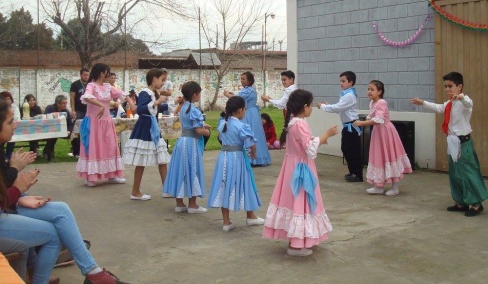 In 1999, with the support of the Focolare that had a meeting hall nearby, some local residents got together to do something for the newcomers. First they tried to identify the main issue for the barrio. It turned out to be the need for a safe place where children and teenagers could be welcomed and taken off the streets. This is how the “Juntos Por El Barrio” Project was begun. An academic support programme was set up in a makeshift classroom. Seeing how successful it was, receiving distance support from the Focolare’s New Families non-profit association (AFN onlus), many other projects were begun. With the help of donations from outside the country a building was constructed where the activities could be carried out. The centre quickly became a meeting place and a point of reference for the entire barrio.
In 1999, with the support of the Focolare that had a meeting hall nearby, some local residents got together to do something for the newcomers. First they tried to identify the main issue for the barrio. It turned out to be the need for a safe place where children and teenagers could be welcomed and taken off the streets. This is how the “Juntos Por El Barrio” Project was begun. An academic support programme was set up in a makeshift classroom. Seeing how successful it was, receiving distance support from the Focolare’s New Families non-profit association (AFN onlus), many other projects were begun. With the help of donations from outside the country a building was constructed where the activities could be carried out. The centre quickly became a meeting place and a point of reference for the entire barrio.  It was therefore necessary to celebrate, also because the quarter is really changing face. At Juntos Por El Barrio there are currently a variety of activities, many of them geared towards the young, but also towards people of all ages: food and nutrition, preventive health, sewing, literacy, artisan and screen printing workshops, classes for gardeners, hair-stylists, tailors and recreational activities. More than 70 families are supported by the project, and the centre is visited by 200 people every week. The 220 people that took part in the August 14th celebrations – including a hundred children – were spurting happiness from every pore. They all felt like protagonists not only of the feast, but also of their own liberation. Perhaps because they felt like they were part of a process in which what comes into light is not giving and receiving, but reciprocity.
It was therefore necessary to celebrate, also because the quarter is really changing face. At Juntos Por El Barrio there are currently a variety of activities, many of them geared towards the young, but also towards people of all ages: food and nutrition, preventive health, sewing, literacy, artisan and screen printing workshops, classes for gardeners, hair-stylists, tailors and recreational activities. More than 70 families are supported by the project, and the centre is visited by 200 people every week. The 220 people that took part in the August 14th celebrations – including a hundred children – were spurting happiness from every pore. They all felt like protagonists not only of the feast, but also of their own liberation. Perhaps because they felt like they were part of a process in which what comes into light is not giving and receiving, but reciprocity.
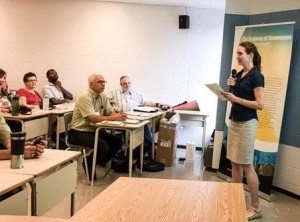
Montreal: Chiara Lubich’s New Humanity Movement at the 2016 World Social Forum
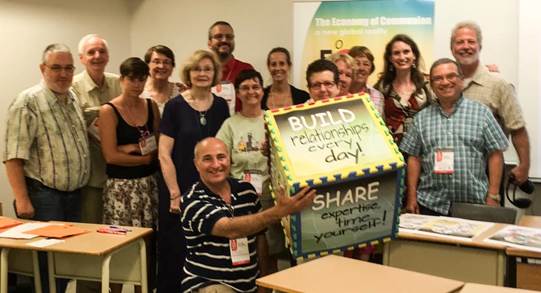 Courtesy Week at Yvonne’s school in Toronto, Canada, received a surprise visit from a Minister of the Canadian government who wanted to know more about how the students had used the Cube of Love to change the atmosphere in their classrooms, increase service and attention to others and alleviate bullying. That Peace Project received an award as one of the most exemplary practices in the school district and was adopted by other schools with the encouragement of the Minister of Education. In North Riverside, Illinois, USA, Carol began a social project called “The Art of Caring for Each Other”, which was adopted by the public administration and transformed foreigners and suspicious neighbours into a community marked by welcome and sharing.
Courtesy Week at Yvonne’s school in Toronto, Canada, received a surprise visit from a Minister of the Canadian government who wanted to know more about how the students had used the Cube of Love to change the atmosphere in their classrooms, increase service and attention to others and alleviate bullying. That Peace Project received an award as one of the most exemplary practices in the school district and was adopted by other schools with the encouragement of the Minister of Education. In North Riverside, Illinois, USA, Carol began a social project called “The Art of Caring for Each Other”, which was adopted by the public administration and transformed foreigners and suspicious neighbours into a community marked by welcome and sharing.  These are just a few of the best practices that the Focolare’s New Humanity Movement presented at the World Social Forum in Montreal, Canada during the second week of August. Projects, studies, social action and artistic performances helped to imagine that “Another world is necessary, together it becomes possible!”. It was the title chosen for this 12th edition of the worldwide workshop which originated in Porto Alegre, Brazil, 2001, as a response to the economic forum that was held by world economic leaders in Davos, Switzerland. The Social Forum provides an independent space to diverse expressions in civil society that are trying to bring change in the areas of human rights, economy, renewable energy and democracy. The Humanity Movement’s three public workshops at McGill University of Montreal and Quebec were an expo of best practices from the social, economic and political fields that have been influenced by Chiara Lubich’s charism of unity. Jean Charles Bitorirobe from Burundi, now a Canadian citizen, wanted to help heal the wound of ethnic conflict that still divides Hutu and Tutsi in his country and also in Quebec. “Our centre is meant as a cultural centre for all Burundians regardless of their ethnic roots. In February we gathered more than 420 people to share experiences, our sad baggage from the past and traditional customs that should no longer continue to divide our people. Our inspiration is the charism of unity.” Jean Claude also began a soccer team, a Kirundi language and dance class, a fundraiser for 150 mentally disable children from Burundi and a supper of typical dishes and traditional music. “Some people immediately thought we were thinking of starting a political party, but we only want to work for unity, and the ambassador expressed acknowledgement and appreciation of our work.” Cameroon politician and point of reference for the thousands of women Volunteers of the Focolare Movement, Patience Lobè, brought the workshop to a close. She had received death threats and was the target of several assassination attempts for having denounced corruption in the Public Works system in her country. “I felt I had to fight for justice. I don’t know if this is because it is part of my nature, but I do think that God uses us as his instruments.” As a civil engineer she earned a good salary, but the poverty all around her would not let her rest, and so this courageous woman created professional development centres that have led to jobs and cooperatives like the organic chicken farm that is now showpiece of the industrial edifice of the country. “Hunger and poverty are first of all a problem of values, but if we put ourselves together we can create the change and be people that do something new.” And that is totally in tune with the job description of the Social Forum.
These are just a few of the best practices that the Focolare’s New Humanity Movement presented at the World Social Forum in Montreal, Canada during the second week of August. Projects, studies, social action and artistic performances helped to imagine that “Another world is necessary, together it becomes possible!”. It was the title chosen for this 12th edition of the worldwide workshop which originated in Porto Alegre, Brazil, 2001, as a response to the economic forum that was held by world economic leaders in Davos, Switzerland. The Social Forum provides an independent space to diverse expressions in civil society that are trying to bring change in the areas of human rights, economy, renewable energy and democracy. The Humanity Movement’s three public workshops at McGill University of Montreal and Quebec were an expo of best practices from the social, economic and political fields that have been influenced by Chiara Lubich’s charism of unity. Jean Charles Bitorirobe from Burundi, now a Canadian citizen, wanted to help heal the wound of ethnic conflict that still divides Hutu and Tutsi in his country and also in Quebec. “Our centre is meant as a cultural centre for all Burundians regardless of their ethnic roots. In February we gathered more than 420 people to share experiences, our sad baggage from the past and traditional customs that should no longer continue to divide our people. Our inspiration is the charism of unity.” Jean Claude also began a soccer team, a Kirundi language and dance class, a fundraiser for 150 mentally disable children from Burundi and a supper of typical dishes and traditional music. “Some people immediately thought we were thinking of starting a political party, but we only want to work for unity, and the ambassador expressed acknowledgement and appreciation of our work.” Cameroon politician and point of reference for the thousands of women Volunteers of the Focolare Movement, Patience Lobè, brought the workshop to a close. She had received death threats and was the target of several assassination attempts for having denounced corruption in the Public Works system in her country. “I felt I had to fight for justice. I don’t know if this is because it is part of my nature, but I do think that God uses us as his instruments.” As a civil engineer she earned a good salary, but the poverty all around her would not let her rest, and so this courageous woman created professional development centres that have led to jobs and cooperatives like the organic chicken farm that is now showpiece of the industrial edifice of the country. “Hunger and poverty are first of all a problem of values, but if we put ourselves together we can create the change and be people that do something new.” And that is totally in tune with the job description of the Social Forum.
Gen Rosso in Spain
Guitar, drums, acoustic bass, piano, saxophone and the voices of Gen Rosso.  Twenty songs from 50 years of music-making: Un’altra umanità, Nascera, Costellazioni, and more. An acoustic and multi-cultural concert in three languages: Italian, Spanish and English. Below are the dates and locations of Gen Rosso’s tour in Spain: September 16, Teatro Jacinto Benavente de Galapagar, Madrid September 18, Teatro Fernández Baldor de Torrelodones, Madrid September 21, Auditorio Fundación Caja Rural de Granada September 23, Gran Teatro de Cáceres Sepember 24, Teatro Auditorio Riberas del Guadaíra, Alcalá de Guadaíra, Seville September 27, Vigil of Mercy at 20:30, Parish of San Pedro Poveda, Jaén September 29-30, Borja Hall, Valladolid October 2, Auditorio Colegio La Sagrada Familia, the Marists, Cartagena, Murcia Gen Rosso International Performing Arts Group is known for its internationality and the personal commitment of its members to spread a message of universal brotherhood and peace in favour of a more united world.
Twenty songs from 50 years of music-making: Un’altra umanità, Nascera, Costellazioni, and more. An acoustic and multi-cultural concert in three languages: Italian, Spanish and English. Below are the dates and locations of Gen Rosso’s tour in Spain: September 16, Teatro Jacinto Benavente de Galapagar, Madrid September 18, Teatro Fernández Baldor de Torrelodones, Madrid September 21, Auditorio Fundación Caja Rural de Granada September 23, Gran Teatro de Cáceres Sepember 24, Teatro Auditorio Riberas del Guadaíra, Alcalá de Guadaíra, Seville September 27, Vigil of Mercy at 20:30, Parish of San Pedro Poveda, Jaén September 29-30, Borja Hall, Valladolid October 2, Auditorio Colegio La Sagrada Familia, the Marists, Cartagena, Murcia Gen Rosso International Performing Arts Group is known for its internationality and the personal commitment of its members to spread a message of universal brotherhood and peace in favour of a more united world.
https://youtu.be/t5Cvfaz-e64
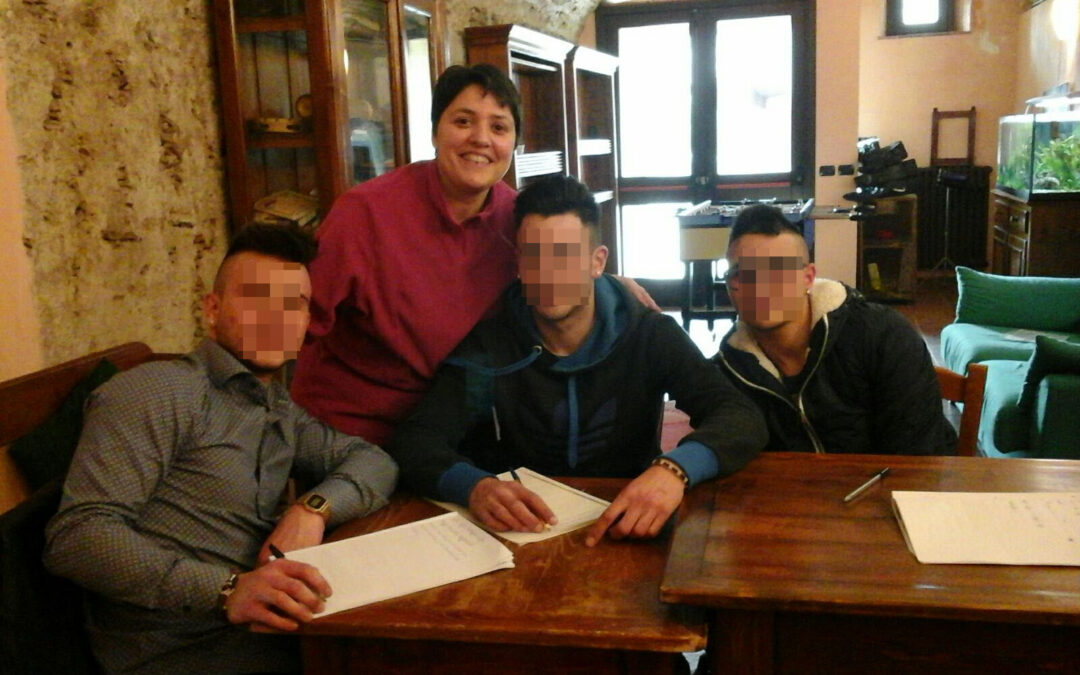
Sr Francesca: Courage to do acts of mercy
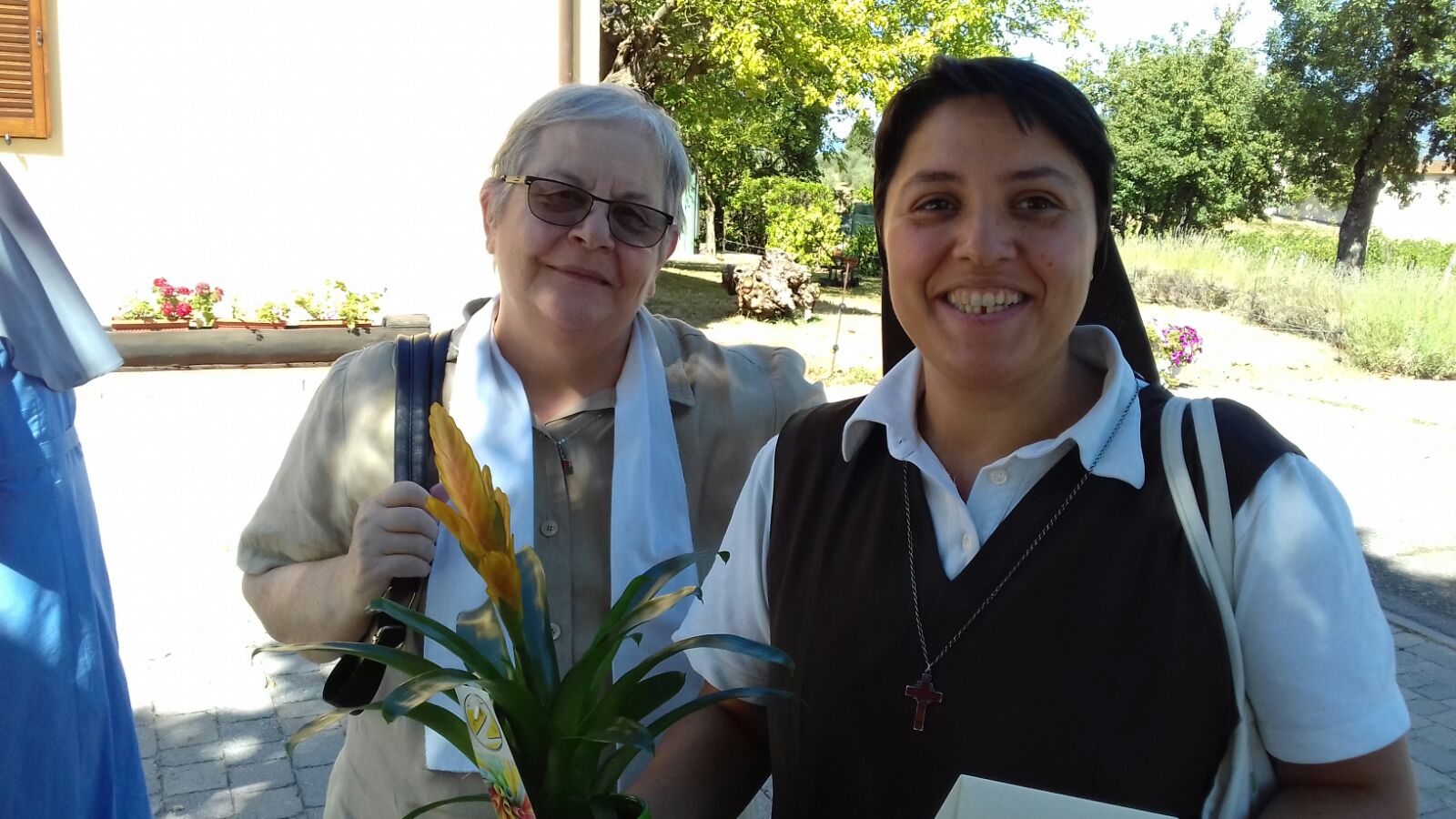 “I come from a simple family in the province of Naples. In my town, my father, a special deacon of the Eucharist, was in charge of the sick and the poor, who had in some way become members of our household. I was14 when dad passed away due to a tumour. I suffered so much, and in that time I didn’t believe that God was taking care of us, as he had always said. I threw myself into my studies, with the objective of earning lots of money to build a house of my own. At the age of 20 God appeared once more in my life: a group of friends had invited me to a meeting of which I honestly remember nothing; the only thing that pushed me to frequent succeeding ones was the joy I saw amongst them, and which was lacking in my life. I excelled in my studies, and had many friends but was not happy like them. I wanted to get to know more about this God they spoke to me about, and after a few years, also what I wanted to do with my life. I was introduced to my congregation almost by chance. To be sincere, I didn’t hold the nuns in great esteem. In my region the convent is still regarded as an escape from the world: and this certainly was not the life I wanted! I am a joyful, happy person and l love being with people. I had a degree and also many boyfriends. But in this religious family I found the love of my life – God, to whom I couldn’t say no. This was the house I had sought ever since I was an adolescent, but now with an addition: I was no longer alone, but had other sisters who loved Jesus, like me. My religious family – the Franciscan nuns of the Poor – had met the Focolare Movement at the turn of the 1960s. That period had been a painful one for the Congregation due to many internal problems. Our charism – to see Jesus in the poor and treat his wounds – in contact with the spirituality of unity, had taken on a new light and the Gospel with its message of mutual love was the answer to all that pain. The nuns created a Youth Centre so that the young girls could find their aim in life. Upon returning to the source of our charism, we also understood that the poor are not only in the sick, but in every suffering person.
“I come from a simple family in the province of Naples. In my town, my father, a special deacon of the Eucharist, was in charge of the sick and the poor, who had in some way become members of our household. I was14 when dad passed away due to a tumour. I suffered so much, and in that time I didn’t believe that God was taking care of us, as he had always said. I threw myself into my studies, with the objective of earning lots of money to build a house of my own. At the age of 20 God appeared once more in my life: a group of friends had invited me to a meeting of which I honestly remember nothing; the only thing that pushed me to frequent succeeding ones was the joy I saw amongst them, and which was lacking in my life. I excelled in my studies, and had many friends but was not happy like them. I wanted to get to know more about this God they spoke to me about, and after a few years, also what I wanted to do with my life. I was introduced to my congregation almost by chance. To be sincere, I didn’t hold the nuns in great esteem. In my region the convent is still regarded as an escape from the world: and this certainly was not the life I wanted! I am a joyful, happy person and l love being with people. I had a degree and also many boyfriends. But in this religious family I found the love of my life – God, to whom I couldn’t say no. This was the house I had sought ever since I was an adolescent, but now with an addition: I was no longer alone, but had other sisters who loved Jesus, like me. My religious family – the Franciscan nuns of the Poor – had met the Focolare Movement at the turn of the 1960s. That period had been a painful one for the Congregation due to many internal problems. Our charism – to see Jesus in the poor and treat his wounds – in contact with the spirituality of unity, had taken on a new light and the Gospel with its message of mutual love was the answer to all that pain. The nuns created a Youth Centre so that the young girls could find their aim in life. Upon returning to the source of our charism, we also understood that the poor are not only in the sick, but in every suffering person. 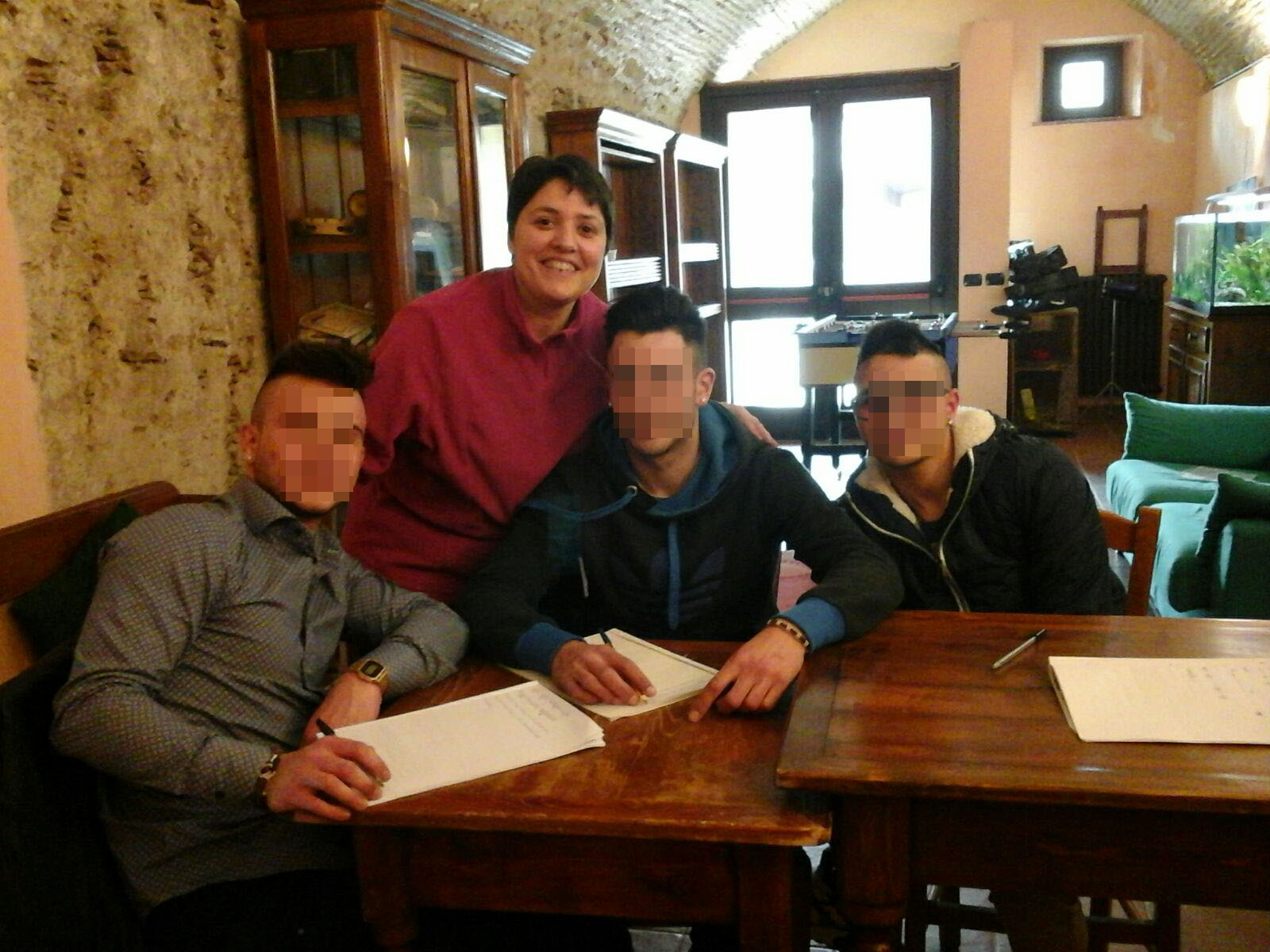 Today in Italy we care for the homeless, and the women who decide to escape from the trafficking of migrants, and work with the Caritas. We offer our help and consultancy also in the framework of the families: new unions, separations and divorce. We also work in the prisons and with minors, etc. Over the last six years I have worked as a teacher in Messina – I have a degree in Educational Sciences – in a therapeutic community for youths subjected to the control of the Juvenile Courts. I used to visit them to help them discover their importance in society. They would often say: “When you are with us, we feel the presence of something beautiful and good, could this be Jesus?” Recently, my superiors received a request for someone to work under a permanent contract, in the prisons of the Philippines and with street kids. I was assigned the job since the experience I have acquired in this field could be of great help. I have already said yes to God and do not want to back out just now. In September I shall leave for six months, to see if I can give my contribution there.”
Today in Italy we care for the homeless, and the women who decide to escape from the trafficking of migrants, and work with the Caritas. We offer our help and consultancy also in the framework of the families: new unions, separations and divorce. We also work in the prisons and with minors, etc. Over the last six years I have worked as a teacher in Messina – I have a degree in Educational Sciences – in a therapeutic community for youths subjected to the control of the Juvenile Courts. I used to visit them to help them discover their importance in society. They would often say: “When you are with us, we feel the presence of something beautiful and good, could this be Jesus?” Recently, my superiors received a request for someone to work under a permanent contract, in the prisons of the Philippines and with street kids. I was assigned the job since the experience I have acquired in this field could be of great help. I have already said yes to God and do not want to back out just now. In September I shall leave for six months, to see if I can give my contribution there.”
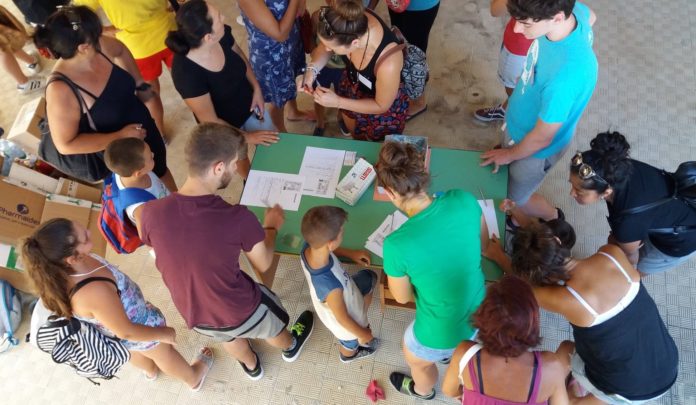
Syracuse’s Summer Campus
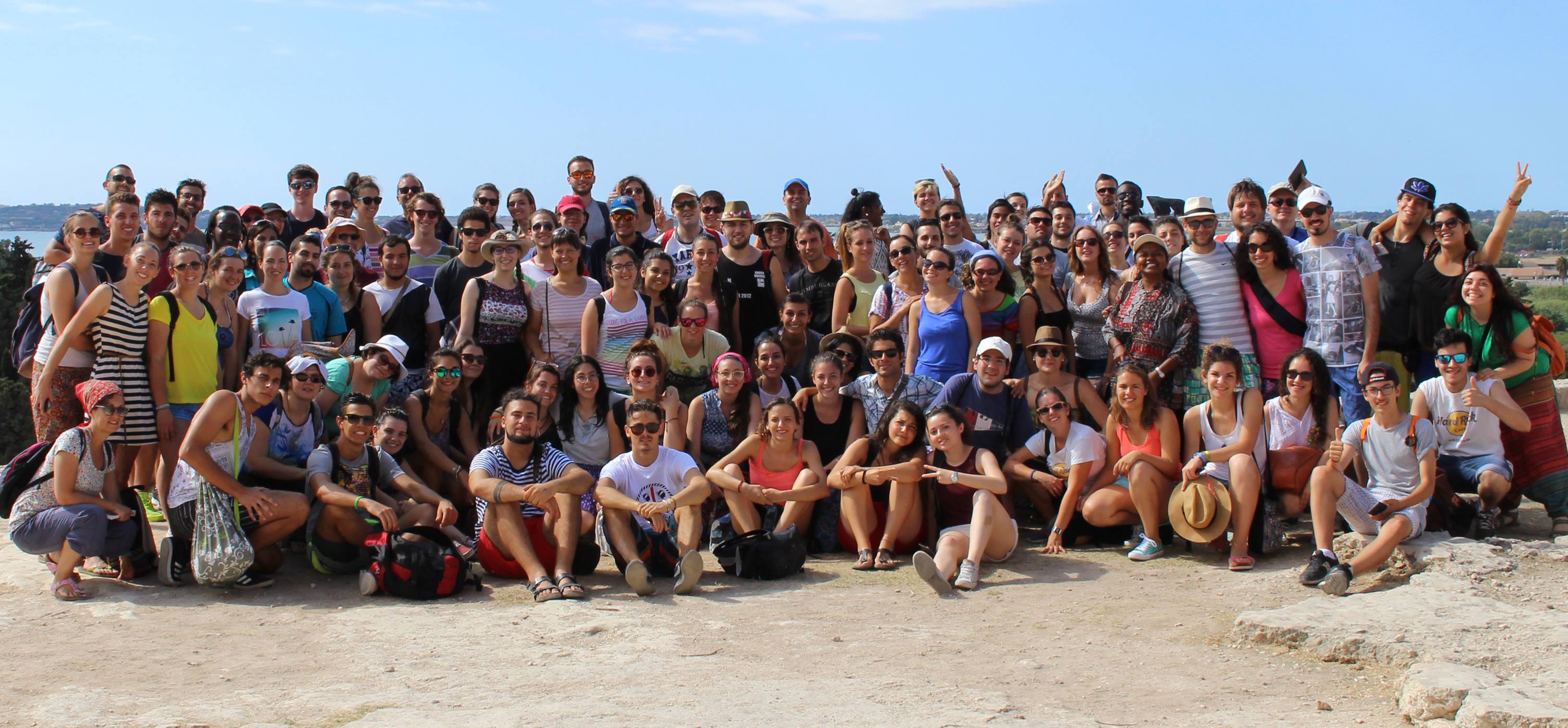 “Now let’s not call this an alternative vacation,” insists 21 year-old Nahomy Onate. “Many of us are regulars here on the Campus and so it’s no extraordinary experience for us but part of our life.” Nahomy comes from Reggello, Italy, close to the Focolare’s international town of Loppiano. She is actively involved in the Syracuse Summer Campus that was organized by young people from the Focolare. The local gazette reported “Youth For A United World Encounter Syracuse’s Peripheries”. This will be the third consecutive year that the neighbourhoods of Akradina, Tika and, this year, Grottasanta have hosted this experience which focuses on building relationships and acknowledging the human dignity of every person. A hundred and twenty young people from 17 Regions of Italy spent 10 days together, animating the peripheries with workshops on dance, journalism, theatre, drawing, and more. Over a hundred children and teenagers between the ages of 6 and 13 took part. “I had already been here for the second edition of the project and knew more or less what to expect. I was also familiar with the disadvantaged situation of this neighbourhood. But the moment we got here, the general attitude of everyone really struck me: we were willing and ready to give of ourselves for 10 days. And that’s what happened.” Nahomy explained that what was new this year was Grottasanta, another disadvantaged and at-risk neighbourhood of the city.
“Now let’s not call this an alternative vacation,” insists 21 year-old Nahomy Onate. “Many of us are regulars here on the Campus and so it’s no extraordinary experience for us but part of our life.” Nahomy comes from Reggello, Italy, close to the Focolare’s international town of Loppiano. She is actively involved in the Syracuse Summer Campus that was organized by young people from the Focolare. The local gazette reported “Youth For A United World Encounter Syracuse’s Peripheries”. This will be the third consecutive year that the neighbourhoods of Akradina, Tika and, this year, Grottasanta have hosted this experience which focuses on building relationships and acknowledging the human dignity of every person. A hundred and twenty young people from 17 Regions of Italy spent 10 days together, animating the peripheries with workshops on dance, journalism, theatre, drawing, and more. Over a hundred children and teenagers between the ages of 6 and 13 took part. “I had already been here for the second edition of the project and knew more or less what to expect. I was also familiar with the disadvantaged situation of this neighbourhood. But the moment we got here, the general attitude of everyone really struck me: we were willing and ready to give of ourselves for 10 days. And that’s what happened.” Nahomy explained that what was new this year was Grottasanta, another disadvantaged and at-risk neighbourhood of the city.  “When we arrived in front of the school where we would be conducting the activities with the children and teenagers, the scene before me really shocked me: The shiny sea seemed to frame the once grand and now run-down palaces that stood like symbols of the social degradation that had taken place. Education is often the first thing to give a sense of dignity to a human being, but the conditions of that school just didn’t allow it to provide anything to anyone. Yet beyond the gate were mothers, teachers and children who welcomed us with huge applause and with much hope for change in their eyes. This was all it took to make us realize that despite the short time we had at our disposal, we had to place all our bets on this most fragile part of society and give all of ourselves. This is what each one of us did, establishing close fraternal relationships with each one of them. Following a very harsh argument between two little boys, my eyes were opened to the daily reality in which they live: Violence, taking revenge and indifference are the ‘values’ they are raised on. In front of that situation which had been created, we tried to explain to them that it was better not to respond to violence with more violence, that there are other ways, even though no one had ever shown them those ways. ‘Let’s quit acting like the mafia,’ said one of the boys, ‘I don’t want to see violence and revenge in this neighbourhood any more. Now, we’re changed.’ It only took a few days inside a whirlpool of mutual love for this boy to pronounce those words to his peers. The seed that we had been planting and watering over these three years and during those few days was growing. We were leaving something in them. We realized that they were the future and that it’s always possible to change and be different, to be better. In those neighbourhoods of Syracuse you find only one of the many peripheries of Italy, and we no longer want to ignore so many situations that are happening even in our own cities, places in the world that are losing their values, their love and their courage. I returned home a bit nostalgic and sad: I miss each of the children, but I also feel charged and full of their love, their smiles and their will to change their world.”
“When we arrived in front of the school where we would be conducting the activities with the children and teenagers, the scene before me really shocked me: The shiny sea seemed to frame the once grand and now run-down palaces that stood like symbols of the social degradation that had taken place. Education is often the first thing to give a sense of dignity to a human being, but the conditions of that school just didn’t allow it to provide anything to anyone. Yet beyond the gate were mothers, teachers and children who welcomed us with huge applause and with much hope for change in their eyes. This was all it took to make us realize that despite the short time we had at our disposal, we had to place all our bets on this most fragile part of society and give all of ourselves. This is what each one of us did, establishing close fraternal relationships with each one of them. Following a very harsh argument between two little boys, my eyes were opened to the daily reality in which they live: Violence, taking revenge and indifference are the ‘values’ they are raised on. In front of that situation which had been created, we tried to explain to them that it was better not to respond to violence with more violence, that there are other ways, even though no one had ever shown them those ways. ‘Let’s quit acting like the mafia,’ said one of the boys, ‘I don’t want to see violence and revenge in this neighbourhood any more. Now, we’re changed.’ It only took a few days inside a whirlpool of mutual love for this boy to pronounce those words to his peers. The seed that we had been planting and watering over these three years and during those few days was growing. We were leaving something in them. We realized that they were the future and that it’s always possible to change and be different, to be better. In those neighbourhoods of Syracuse you find only one of the many peripheries of Italy, and we no longer want to ignore so many situations that are happening even in our own cities, places in the world that are losing their values, their love and their courage. I returned home a bit nostalgic and sad: I miss each of the children, but I also feel charged and full of their love, their smiles and their will to change their world.”
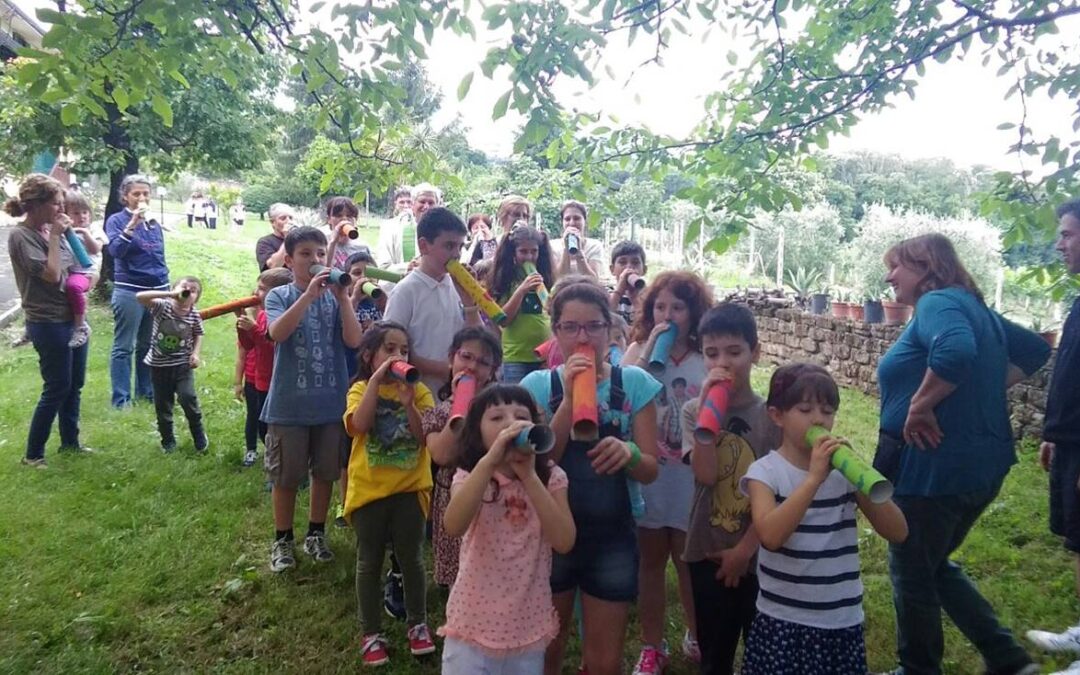
Elisa and Gabriele: Their day without end following the earthquake
 Elisa with the entire family – a twin brother, an elder brother, daddy, and the grandmothers – just a few weeks earlier, had been to the Mariapolis – the Focolare’s summer gathering – with about a hundred other people. It had been an occasion to know each other, share life experiences, and take a step ahead together. Everyone remembers Elisa who before leaving, with her gay and contagious ways had shot a video of the impressions of her group with the help of her twin brother. “The Mariapolis is an experience that leaves its mark in one’s heart forever. I hope to go to the Mariapolis always,” she had texted her mother upon returning home. Instead, Gabriele, her little 8-year-old cousin, in mid-June had participated for the second consecutive year in the little “Gen4 congress.” It was an enchanting three-day event with the little kids who understand “the things of God” better than anyone else. A photo shows him in the role of an angel playing a trumpet upon the passage through the Door of Mercy, together with all the other boys. In the morning of 24 August the news of the earthquake arrived, and also the anguish: Elisa, Gabriele and their grandmothers were under the ruins and all feared the outcome for those who were missing. A chain of prayers immediately started like a tam-tam, but in the evening it was confirmed: they didn’t make it.
Elisa with the entire family – a twin brother, an elder brother, daddy, and the grandmothers – just a few weeks earlier, had been to the Mariapolis – the Focolare’s summer gathering – with about a hundred other people. It had been an occasion to know each other, share life experiences, and take a step ahead together. Everyone remembers Elisa who before leaving, with her gay and contagious ways had shot a video of the impressions of her group with the help of her twin brother. “The Mariapolis is an experience that leaves its mark in one’s heart forever. I hope to go to the Mariapolis always,” she had texted her mother upon returning home. Instead, Gabriele, her little 8-year-old cousin, in mid-June had participated for the second consecutive year in the little “Gen4 congress.” It was an enchanting three-day event with the little kids who understand “the things of God” better than anyone else. A photo shows him in the role of an angel playing a trumpet upon the passage through the Door of Mercy, together with all the other boys. In the morning of 24 August the news of the earthquake arrived, and also the anguish: Elisa, Gabriele and their grandmothers were under the ruins and all feared the outcome for those who were missing. A chain of prayers immediately started like a tam-tam, but in the evening it was confirmed: they didn’t make it. 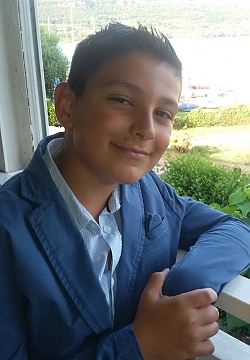 Their families immediately gave an unwavering testimony: “Their faith in God’s love was such that even in this immense suffering, they enlightened us with renewed determination to live for that which does not pass”, wrote Maria Voce, President of the Focolare, to the stricken communities and families, the day after the earthquake. Meanwhile the Focolare communities throughout the world and Italy had launched the rescue system.
Their families immediately gave an unwavering testimony: “Their faith in God’s love was such that even in this immense suffering, they enlightened us with renewed determination to live for that which does not pass”, wrote Maria Voce, President of the Focolare, to the stricken communities and families, the day after the earthquake. Meanwhile the Focolare communities throughout the world and Italy had launched the rescue system.
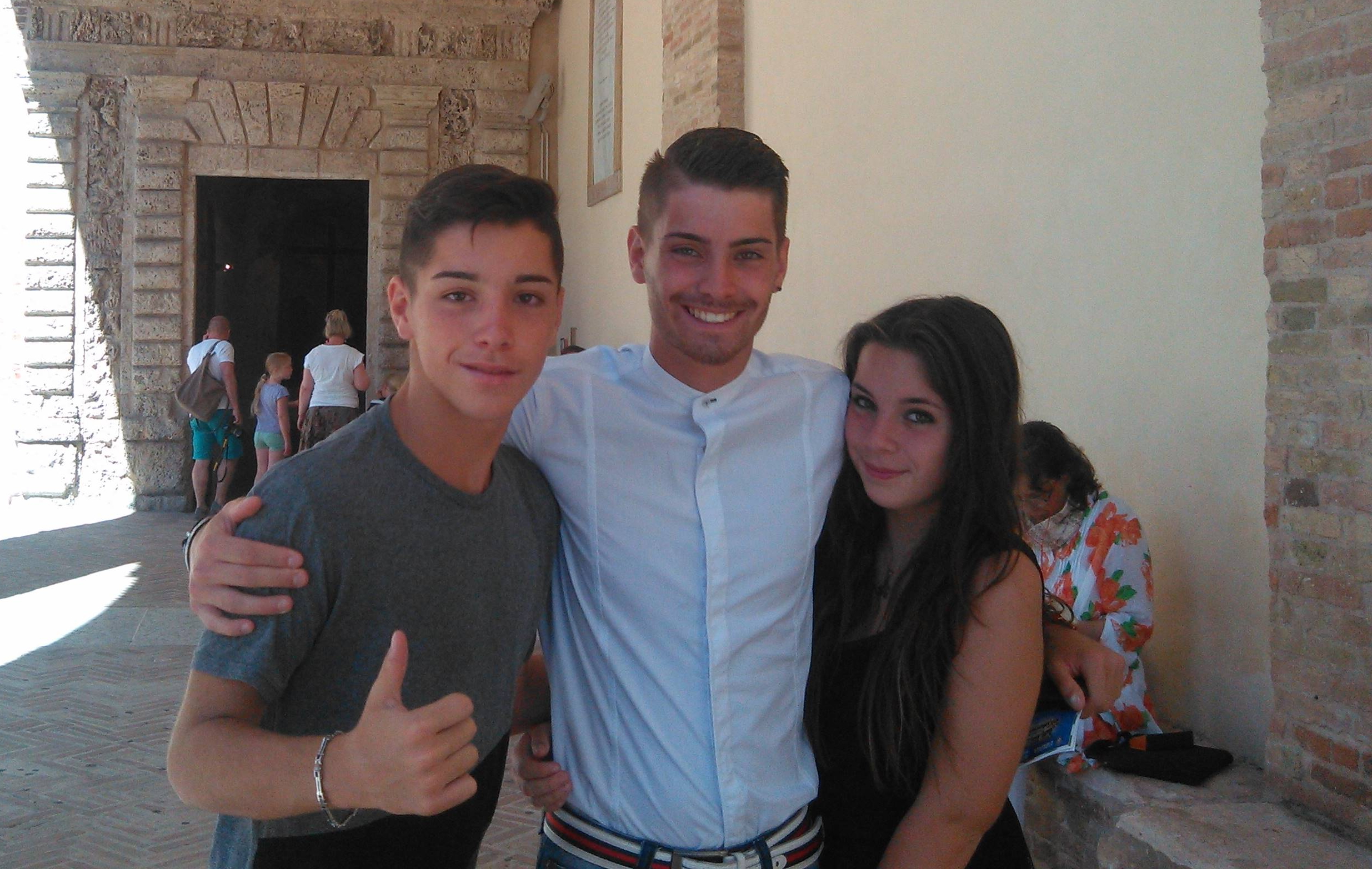
Elisa with her two brothers
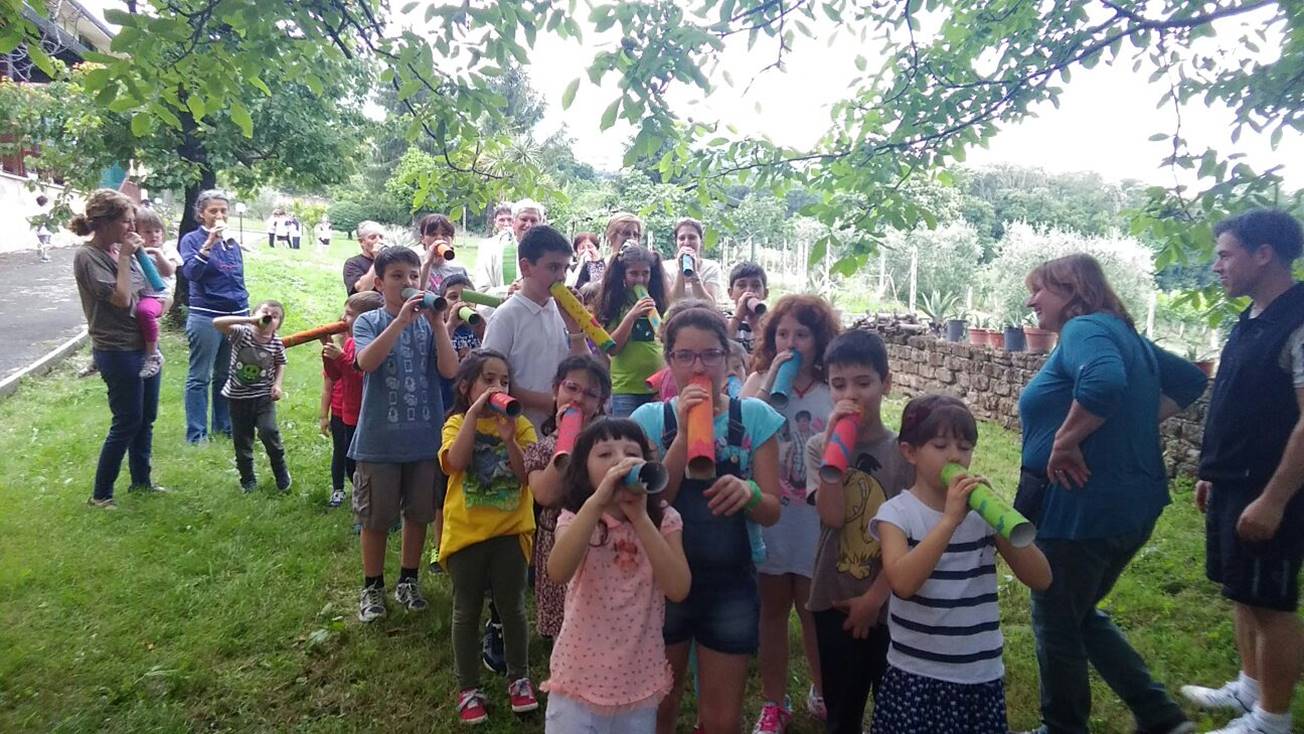
Gabriele at the Mariapolis
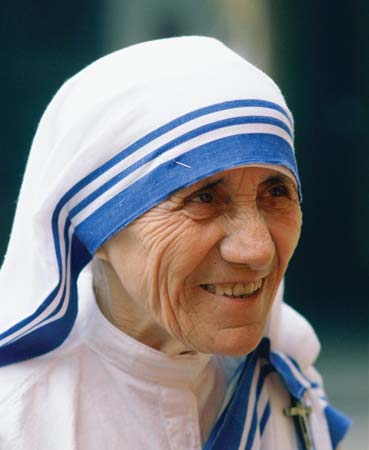
Mother Teresa, a great teacher of the art of loving
 “Mother Teresa is … a great teacher of the art of loving. She truly loved everyone. She didn’t ask her neighbour if he or she was Catholic, Hindu, Muslim, etc. … Undoubtedly, Mother Teresa was the first to love. She went out looking for those entrusted to her by God. Mother Teresa saw Jesus in every person, perhaps in a way no others did. Her motto was: “You did it for me.” Mother Teresa made herself one with everyone. She made herself poor with the poor and especially in the same way as the poor. … She didn’t accept anything that the poor couldn’t have as well. We know, for example, that she and her sisters do without having even a simple washing machine, something that many people do not understand. They say: “Nowadays!” But she did not want one because the poor don’t have them. She took upon herself and identified herself with the wretchedness of the poor, their grief, their sickness and death. Mother Teresa loved everyone as herself, to the point of offering others her own ideal. For example, she invited the volunteers who spent a period of time serving in her Work to seek out their own “Calcutta” when they went home to their countries. She said: it is because there are poor people everywhere. Mother Teresa certainly loved her enemies. She never stopped to dispute the absurd accusations they made against her, but she prayed for her enemies. Yes, in her we can see “the art of loving” lived to perfection. She was … a queen of charity.” Chiara Lubich Message during a Conference Call on 25th September 1997.
“Mother Teresa is … a great teacher of the art of loving. She truly loved everyone. She didn’t ask her neighbour if he or she was Catholic, Hindu, Muslim, etc. … Undoubtedly, Mother Teresa was the first to love. She went out looking for those entrusted to her by God. Mother Teresa saw Jesus in every person, perhaps in a way no others did. Her motto was: “You did it for me.” Mother Teresa made herself one with everyone. She made herself poor with the poor and especially in the same way as the poor. … She didn’t accept anything that the poor couldn’t have as well. We know, for example, that she and her sisters do without having even a simple washing machine, something that many people do not understand. They say: “Nowadays!” But she did not want one because the poor don’t have them. She took upon herself and identified herself with the wretchedness of the poor, their grief, their sickness and death. Mother Teresa loved everyone as herself, to the point of offering others her own ideal. For example, she invited the volunteers who spent a period of time serving in her Work to seek out their own “Calcutta” when they went home to their countries. She said: it is because there are poor people everywhere. Mother Teresa certainly loved her enemies. She never stopped to dispute the absurd accusations they made against her, but she prayed for her enemies. Yes, in her we can see “the art of loving” lived to perfection. She was … a queen of charity.” Chiara Lubich Message during a Conference Call on 25th September 1997.
Reead more: The magnificat of Mother Theresa of Calcutta as received by Chiara Lubich – Press releases SIF– 1° Settembre 2016
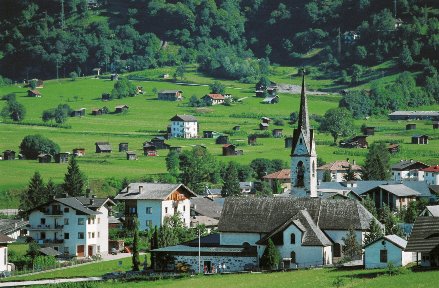
The “Spirit of Primiero” and Peace Among the Peoples
 In 1959 the last of the earliest Mariapolises (cities of Mary) was held in Fiera di Primiero, Italy. The Mariapolis is probably the Focolare’s most characteristic event in which young and old people of all backgrounds spend several days together for an experience of fraternity in the light of of the universal values of the Gospel. Nowadays Mariapolises are held every year in an increasing number of countries, presenting the Golden Rule in a variety of cultural settings. On August 22, 1959 when the Cold War was in full swing and setting the Western Bloc in opposition to the Soviet Bloc, people from 27 countries who were attending the Mariapolis decided to consecrate themselves and their people of their nations to Mary. Their act of consecration was recited in nine languages and made that small “people” at the Mariapolis realize that the life of unity which was revealed and experienced in Primiero was destined to spread throughout the world. Today’s “clash of incivility” and the chaotic relations between states highlights the significance of that 1959 proposal. On August 27-28, 2016 the newly assembled Municipality of Primiero hosted a conference titled “Peoples in the Human Family”, which had as speakers Lawyer Gianni Caso, honorary president of the Supreme Court and Vincenzo Bonomo, director of the Law School at the Pontifical Lateran University. Nowadays we do not talk about peoples, but rather of states. The peoples of the world are the result of natural combinations. They own the right of self-determination; whereas, states even come to deny the existence of indigenous peoples in order not to recognize their right to self-determination. It is preferable to speak of “civil society” which, at best, can have an opinion. Peoples do not have an opinion: they have a right to self-determination and expect that right to be upheld. “Peace among peoples is the order that is willed by God,” Chiara Lubich said. And she entrusted the peoples of the world to Mary, not the states. She entrusted them to Mary as their defender, because the peoples of the world have the right to be defended. “Now, we no longer have a Cold War,” Bonomo acknowledges, “but there is a cold peace which is perhaps worse, because it is peace or a presumption of peace that is not based on shared values.” What remains today of that 1959 consecration? The proclamation of those principles is still as timely as it ever was as we try to find our way on the difficult geopolitical landscape of today’s world. For the speakers at the conference it remains the method for interpreting the facts; it remains an important means of the vision of a united world, which does not abolish the differences but celebrates them. Today there is a desire to rediscover the prophetic values that were sanctioned during that August of 1959, and the people at this year’s conference have shown zeal and determination to do that. One local politician, the Mayor of the Municipality of Primiero said that the Mariapolis of Primiero should not merely be a tourist attraction for the valley but, with its values, finally change our life.” There is need to make Chiara Lubich’s legacy grow and change Primiero into a laboratory of brotherhood among peoples. This process has also been seen in the recent not-so-easy unification of four municipalities: Fiera di Primiero, Siror, Tonadico and Transacqua. They represent four small “peoples’ that for the sake of the common good chose communion. Those that who had lived that experience 50 years ago talk about “having planted seeds that still need watering.” During the discussions a connection was made between the “Spirit of Assisi” with its relationships among religions and the “Spirit of Primiero” with its relationships among the peoples of the world. On the morning of Sunday, August 28, 2016 the 1959 act of consecration was recited again in the same crowded church of Fiera di Primiero. It was a festive sign of a newer, deeper and more responsible idea of what peace means. By Roberto Di Pietro Source: Città Nuova
In 1959 the last of the earliest Mariapolises (cities of Mary) was held in Fiera di Primiero, Italy. The Mariapolis is probably the Focolare’s most characteristic event in which young and old people of all backgrounds spend several days together for an experience of fraternity in the light of of the universal values of the Gospel. Nowadays Mariapolises are held every year in an increasing number of countries, presenting the Golden Rule in a variety of cultural settings. On August 22, 1959 when the Cold War was in full swing and setting the Western Bloc in opposition to the Soviet Bloc, people from 27 countries who were attending the Mariapolis decided to consecrate themselves and their people of their nations to Mary. Their act of consecration was recited in nine languages and made that small “people” at the Mariapolis realize that the life of unity which was revealed and experienced in Primiero was destined to spread throughout the world. Today’s “clash of incivility” and the chaotic relations between states highlights the significance of that 1959 proposal. On August 27-28, 2016 the newly assembled Municipality of Primiero hosted a conference titled “Peoples in the Human Family”, which had as speakers Lawyer Gianni Caso, honorary president of the Supreme Court and Vincenzo Bonomo, director of the Law School at the Pontifical Lateran University. Nowadays we do not talk about peoples, but rather of states. The peoples of the world are the result of natural combinations. They own the right of self-determination; whereas, states even come to deny the existence of indigenous peoples in order not to recognize their right to self-determination. It is preferable to speak of “civil society” which, at best, can have an opinion. Peoples do not have an opinion: they have a right to self-determination and expect that right to be upheld. “Peace among peoples is the order that is willed by God,” Chiara Lubich said. And she entrusted the peoples of the world to Mary, not the states. She entrusted them to Mary as their defender, because the peoples of the world have the right to be defended. “Now, we no longer have a Cold War,” Bonomo acknowledges, “but there is a cold peace which is perhaps worse, because it is peace or a presumption of peace that is not based on shared values.” What remains today of that 1959 consecration? The proclamation of those principles is still as timely as it ever was as we try to find our way on the difficult geopolitical landscape of today’s world. For the speakers at the conference it remains the method for interpreting the facts; it remains an important means of the vision of a united world, which does not abolish the differences but celebrates them. Today there is a desire to rediscover the prophetic values that were sanctioned during that August of 1959, and the people at this year’s conference have shown zeal and determination to do that. One local politician, the Mayor of the Municipality of Primiero said that the Mariapolis of Primiero should not merely be a tourist attraction for the valley but, with its values, finally change our life.” There is need to make Chiara Lubich’s legacy grow and change Primiero into a laboratory of brotherhood among peoples. This process has also been seen in the recent not-so-easy unification of four municipalities: Fiera di Primiero, Siror, Tonadico and Transacqua. They represent four small “peoples’ that for the sake of the common good chose communion. Those that who had lived that experience 50 years ago talk about “having planted seeds that still need watering.” During the discussions a connection was made between the “Spirit of Assisi” with its relationships among religions and the “Spirit of Primiero” with its relationships among the peoples of the world. On the morning of Sunday, August 28, 2016 the 1959 act of consecration was recited again in the same crowded church of Fiera di Primiero. It was a festive sign of a newer, deeper and more responsible idea of what peace means. By Roberto Di Pietro Source: Città Nuova
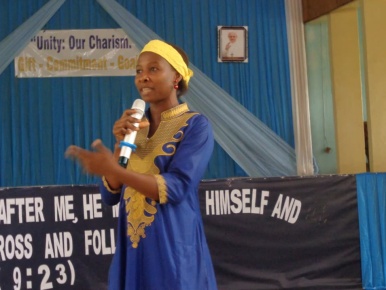
Mariapolis in Nigeria a school of unity
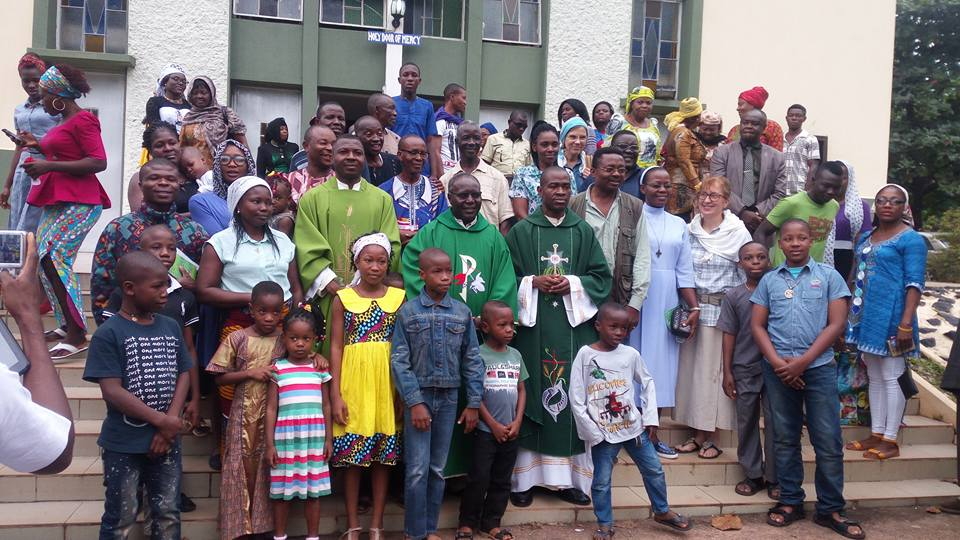 On July 2 – 7, 2016, four hundred people gathered, far from all the spotlights, for an intense experience of communion among young and old, children, priests, members of other Christian Churches and other Religions. Good deeds never make a lot of noise and the media is often more interested in news about violence, abuse of power, kidnappings and bombings. But Nigeria also has another side: the place where the Mariapolis was held, for example, Brigard National Seminary of Enugu, the largest Roman Catholic major seminary in the world. This says much about the faith that is lived so intensely in that land. The Mariapolis opened with a group of fifty young singers who presented a medley of Gospel hymns that had a lot harmony and rhythm. Suddenly the group divided as a number of couples emerged in traditional dress from the different regions of Nigeria. Each of them was identified as they crossed the stage amidst cheers and clapping. The scene closed with everyone in the hall on their feet and singing the National Anthem. There was an explosion of joy that seemed to echo the Bishop’s invitation during his homily to live out the theme of the Mariapolis with the “energy and imagination that is so common to the young.” This year’s theme was Unity: Gift, Commitment and Goal. Unity is a value that is dear to the Bishop because it is “so needed here in Nigeria.” Bishop Callistus Chukwuma Valentine Onaga of Enugu then encouraged everyone to live unity with three objectives in mind: solidarity, subsidiarity and the common good.
On July 2 – 7, 2016, four hundred people gathered, far from all the spotlights, for an intense experience of communion among young and old, children, priests, members of other Christian Churches and other Religions. Good deeds never make a lot of noise and the media is often more interested in news about violence, abuse of power, kidnappings and bombings. But Nigeria also has another side: the place where the Mariapolis was held, for example, Brigard National Seminary of Enugu, the largest Roman Catholic major seminary in the world. This says much about the faith that is lived so intensely in that land. The Mariapolis opened with a group of fifty young singers who presented a medley of Gospel hymns that had a lot harmony and rhythm. Suddenly the group divided as a number of couples emerged in traditional dress from the different regions of Nigeria. Each of them was identified as they crossed the stage amidst cheers and clapping. The scene closed with everyone in the hall on their feet and singing the National Anthem. There was an explosion of joy that seemed to echo the Bishop’s invitation during his homily to live out the theme of the Mariapolis with the “energy and imagination that is so common to the young.” This year’s theme was Unity: Gift, Commitment and Goal. Unity is a value that is dear to the Bishop because it is “so needed here in Nigeria.” Bishop Callistus Chukwuma Valentine Onaga of Enugu then encouraged everyone to live unity with three objectives in mind: solidarity, subsidiarity and the common good.  With such a high start, the topics regarding Focolare spirituality and its concrete application to daily life fell on fertile ground. The testimonies were particularly effective and at times quite moving. They were presented by couples and single people who were committed to living the Gospel in both their daily adventures and misadventures. The witness of a member of the Pentecostal Church and young Muslim was particularly significant and helped in understanding the concepts that were being presented. Afternoons were dedicated to a wide variety of workshops that highlighted how unity can improve the life of individuals and of society. One group discussed the treasures and the challenges of family life; another reflected on how to live unity in the midst of the nation’s current problems. Other workshops offered people the opportunity to acquire some new skills: a mini-course on electricity, another for beauticians, hair stylists, and so on. These were greatly appreciated and seen as a gift that reminded everyone of Chiara Lubich and her Economy of Communion project. “It’s not a matter of wealthy people being philanthropic,” she had remarked in 1999, “but of sharing among equals, mutual giving and receiving.” Everybody wished to seal their proposal to live unity by walking together through the Holy Door at the Seminary Chapel in order to embrace the grace of this special Year of Mercy and to renew their commitment to be merciful to one another and to all. Video of the Mariapolis in Enugu https://vimeo.com/181015319
With such a high start, the topics regarding Focolare spirituality and its concrete application to daily life fell on fertile ground. The testimonies were particularly effective and at times quite moving. They were presented by couples and single people who were committed to living the Gospel in both their daily adventures and misadventures. The witness of a member of the Pentecostal Church and young Muslim was particularly significant and helped in understanding the concepts that were being presented. Afternoons were dedicated to a wide variety of workshops that highlighted how unity can improve the life of individuals and of society. One group discussed the treasures and the challenges of family life; another reflected on how to live unity in the midst of the nation’s current problems. Other workshops offered people the opportunity to acquire some new skills: a mini-course on electricity, another for beauticians, hair stylists, and so on. These were greatly appreciated and seen as a gift that reminded everyone of Chiara Lubich and her Economy of Communion project. “It’s not a matter of wealthy people being philanthropic,” she had remarked in 1999, “but of sharing among equals, mutual giving and receiving.” Everybody wished to seal their proposal to live unity by walking together through the Holy Door at the Seminary Chapel in order to embrace the grace of this special Year of Mercy and to renew their commitment to be merciful to one another and to all. Video of the Mariapolis in Enugu https://vimeo.com/181015319
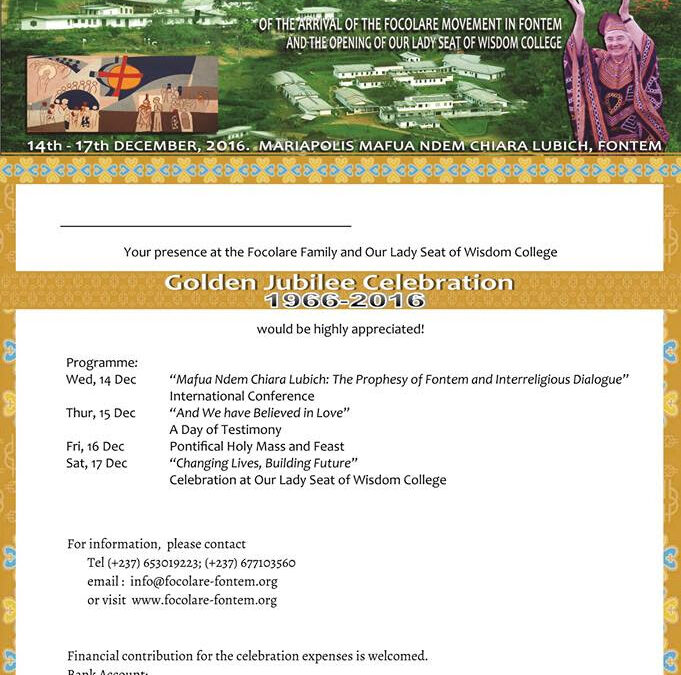
Fontem (Camerun): Golden Jubilee Celebration 1966-2016
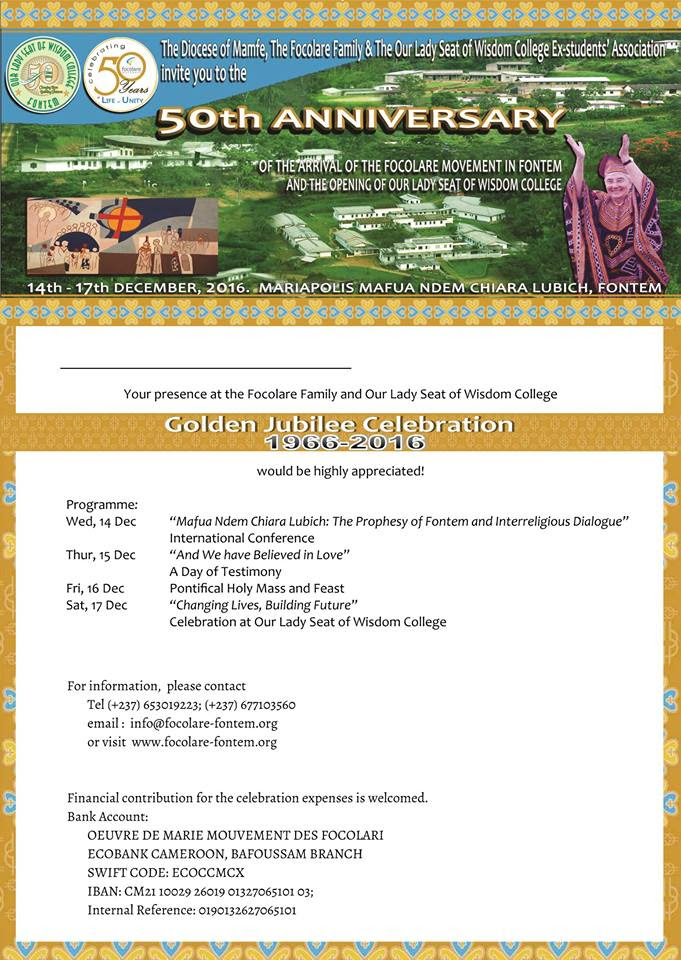 The diocese of Mamfe, the Focolare family and the Alumni Association of the school, “Our Lady Seat of Wisdom,” are extending an invitation to all for the 50th anniversary celebration (1966-2016) of the arrival of the Focolare Movement in Fontem (Camerun) and the opening of the school. The celebrations will be held at the “Mariapolis Mafua Ndem Chiara Lubich” (Fontem) from 14 to 17 December 2016. For information: info@focolare-fontem.org Web site: www.focolare-fontem.org
The diocese of Mamfe, the Focolare family and the Alumni Association of the school, “Our Lady Seat of Wisdom,” are extending an invitation to all for the 50th anniversary celebration (1966-2016) of the arrival of the Focolare Movement in Fontem (Camerun) and the opening of the school. The celebrations will be held at the “Mariapolis Mafua Ndem Chiara Lubich” (Fontem) from 14 to 17 December 2016. For information: info@focolare-fontem.org Web site: www.focolare-fontem.org

Igino Giordani: Love is creation’s breath of life
 Just as Jesus had immediately inserted himself into the sub-layer of society by being born in a stable amongst the homeless, the refugees, the banished; so too, by allowing himself to be crucified and abandoned, he stood in the midst of the massive crowd of all those who suffer: the oppressed, the discouraged, the hungry and the defeated of every age. His focus on all those in misery gives humankind the measure of his love, and was nothing but the logical consequence of having completely fit himself into humanity’s brokenness. It was his way to make himself the last, the vilest of creatures, the most degraded – the way for to be at the root of all misery, a root that raises to Heaven. Infinity empties itself out of love. He had created the universe, developed and ruled it. The universe represents the production of something of boundless grandeur, somehow proportionate to the greatness of his mind, a world made of worlds, one more wondrous than the next. And humankind – tiny creatures on one small planet – after centuries of studying has only a minuscule idea of all that the universe contains: with stars that in our galaxy alone are four light-years apart and from the edges of the galaxy to its centre span a distance of 30 light-years which they can cover back and forth only 1,500 times in a billion years. In this universe that is infinitely too great for the human mind to fathom, he had also taken note of the misery of the human organisms on planet earth, and emptied himself in order to become one of them. He helped them to the point of giving them the Gospel and his very Self in the form of Food. The Redemption re-establishes the design of Creation, which includes that the existence of the stars and the atoms of the universe and the creatures of earth be in constant harmony for the realization of unity. This is why the Creator breathed into it the breath of life that is love. Health, peace and welfare flower in accordance with this precept. (Igino Giordani, L’unico amore, (Rome: Città Nuova, 1974) p. 64 and 105
Just as Jesus had immediately inserted himself into the sub-layer of society by being born in a stable amongst the homeless, the refugees, the banished; so too, by allowing himself to be crucified and abandoned, he stood in the midst of the massive crowd of all those who suffer: the oppressed, the discouraged, the hungry and the defeated of every age. His focus on all those in misery gives humankind the measure of his love, and was nothing but the logical consequence of having completely fit himself into humanity’s brokenness. It was his way to make himself the last, the vilest of creatures, the most degraded – the way for to be at the root of all misery, a root that raises to Heaven. Infinity empties itself out of love. He had created the universe, developed and ruled it. The universe represents the production of something of boundless grandeur, somehow proportionate to the greatness of his mind, a world made of worlds, one more wondrous than the next. And humankind – tiny creatures on one small planet – after centuries of studying has only a minuscule idea of all that the universe contains: with stars that in our galaxy alone are four light-years apart and from the edges of the galaxy to its centre span a distance of 30 light-years which they can cover back and forth only 1,500 times in a billion years. In this universe that is infinitely too great for the human mind to fathom, he had also taken note of the misery of the human organisms on planet earth, and emptied himself in order to become one of them. He helped them to the point of giving them the Gospel and his very Self in the form of Food. The Redemption re-establishes the design of Creation, which includes that the existence of the stars and the atoms of the universe and the creatures of earth be in constant harmony for the realization of unity. This is why the Creator breathed into it the breath of life that is love. Health, peace and welfare flower in accordance with this precept. (Igino Giordani, L’unico amore, (Rome: Città Nuova, 1974) p. 64 and 105

